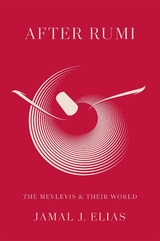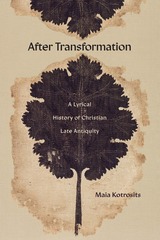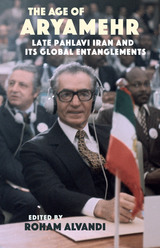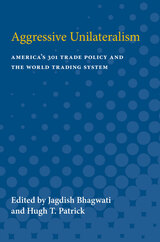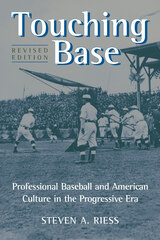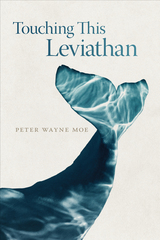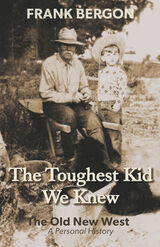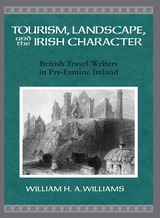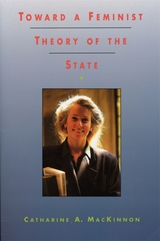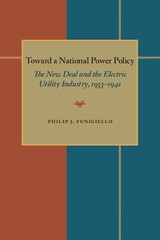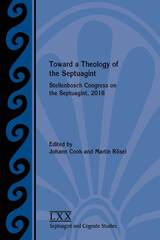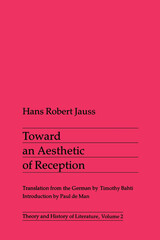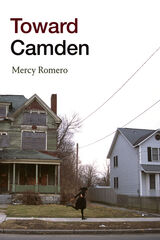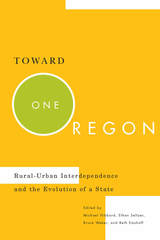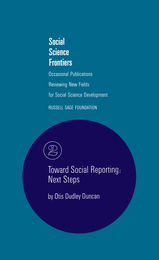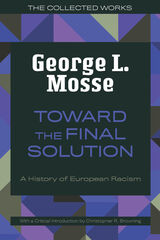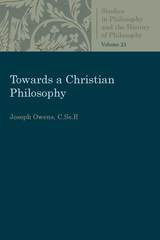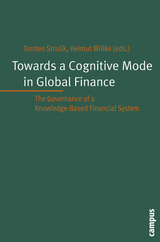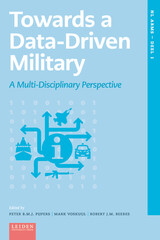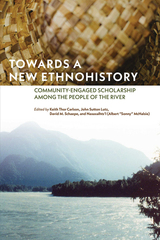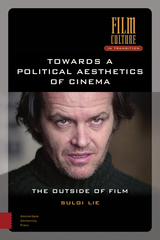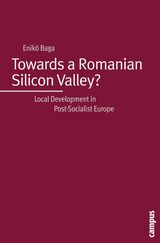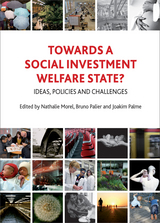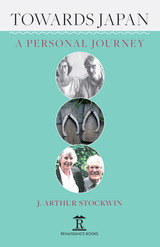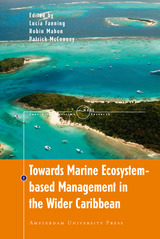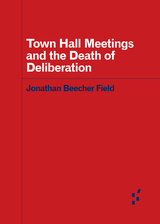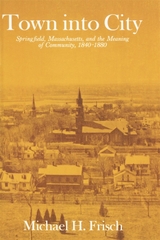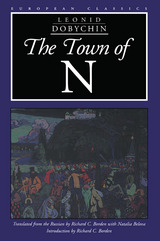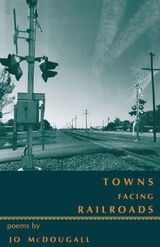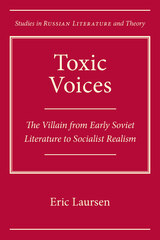 Total Defense: The New Deal and the Invention of National Security
Andrew Preston
Harvard University Press, 2025 “Total Defense is so impressive because Preston is the master of his craft; his clarity and sophistication are always buttressed by illuminating evidence and well-chosen quotations, bespeaking both a great expert’s depth and an expert writer’s talent.”
–Samuel Moyn, The New Republic
The story of how FDR and fellow New Dealers created the idea of national security, transforming the meaning of defense and vastly expanding the US government’s responsibilities.
National security may seem like a timeless notion. States have always sought to fortify themselves, and the modern state derives its legitimacy from protecting its population. Yet national security in fact has a very particular, very American, history—and a surprising one at that.
The concept of national security originates in the 1930s, as part of a White House campaign in response to the rise of fascism. Before then, national self-defense was defined in terms of protecting sovereign territory from invasion. But President Franklin D. Roosevelt and his circle worried that the US public, comforted by two vast oceans, did not take seriously the long-term risks posed by hypermilitarization abroad. New Dealers developed the doctrine of national security, Andrew Preston argues, to supplant the old idea of self-defense: now even geographically and temporally remote threats were to be understood as harms to be combated, while ideological competitors were perilous to the “American way of life.”
Total Defense shows it was no coincidence that a liberal like Roosevelt promoted this vision. National security, no less than social security, was a New Deal promise: the state was obliged to safeguard Americans as much from the guns and warships of Nazi Germany and imperial Japan as from unemployment and poverty in old age. The resulting shift in threat perception—among policymakers and ordinary citizens alike—transformed the United States, spearheading massive government expansion and placing the country on a permanent war footing.
 The Total Incomes System of Accounts
Robert Eisner
University of Chicago Press, 1989 Conventional measures of national income and product and its components have proved enormously useful as indexes of economic activity and as the empirical foundations of much of macroeconomic analysis. Robert Eisner's The Total Incomes System of Accounts (TISA) brings critical new dimensions to those measures. It offers systematic extensions and expansions in an effort to count all of the output that goes into economic well-being, now and in the future.
Eisner counts nonmarket as well as market production, including vast amounts of services produced by housewives and others in the home, capital formation by government and households as well as business, human and intangible capital invested in education, R&D, and health care, as well as tangible capital. He offers measures of net revaluations of tangible assets, redefines the critical boundaries between final and intermediate outputs, and presents separate sector accounts for business, nonprofit institutions, government, government enterprises and households, which make clear the major contributions of nonbusiness sectors to our total national income.
For these and other extensions, Eisner's TISA offers detailed and comprehensive income and product accounts in current dollars and product accounts in constant dollars for all of the years from 1946 to 1981, along with measures of capital stocks. Estimates of consumption, investment, and production functions with the new data sets, a review of other sets of extended accounts, and a detailed description of sources and methods are also provided.
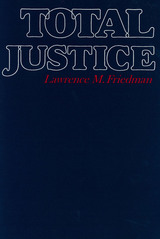 Total Justice
Lawrence M. Friedman
Russell Sage Foundation, 1985 It is a widely held belief today that there are too many lawsuits, too many lawyers, too much law. As readers of this engaging and provocative essay will discover, the evidence for a "litigation explosion" is actually quite ambiguous. But the American legal profession has become extremely large, and it seems clear that the scope and reach of legal process have indeed increased greatly. How can we best understand these changes? Lawrence Friedman focuses on transformations in American legal culture—that is, people's beliefs and expectations with regard to law. In the early nineteenth century, people were accustomed to facing sudden disasters (disease, accidents, joblessness) without the protection of social and private insurance. The uncertainty of life and the unavailability of compensation for loss were mirrored in a culture of low legal expectations. Medical, technical, and social developments during our own century have created a very different set of expectations about life, again reflected in our legal culture. Friedman argues that we are moving toward a general expectation of total justice, of recompense for all injuries and losses that are not the victim's fault. And the expansion of legal rights and protections in turn creates fresh expectations, a cycle of demand and response. This timely and important book articulates clearly, and in nontechnical language, the recent changes that many have sensed in the American legal system but that few have discussed in so powerful and sensible a way. Total Justice is the third of five special volumes commissioned by the Russell Sage Foundation to mark its seventy-fifth anniversary.
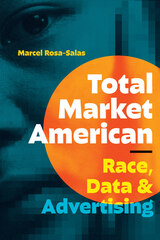 Total Market American: Race, Data, and Advertising
Marcel Rosa-Salas
Duke University Press, 2025 In Total Market American, Marcel Rosa-Salas explores how US advertising reinforces racial categories for profit. Through ethnographic research at advertising agencies and key industry events, Rosa-Salas highlights advertising strategy as an influential commercial arena for racial theorizing closely linked to the forms of racial knowledge prevalent in government, academia, and business. Central to her analysis is what she calls the industry’s “racial information system”—a network of practices, personnel, and technologies that institutionalize racial classification as both a predictive and persuasive tool with the aim of influencing consumer behaviors among Hispanic, Asian, and Black Americans. Within this information system, the “general market" is implicitly defined as both white and the average American while other racialized groups are classified as a “multicultural market" that sustains white normativity and monetizes racial difference. Amid demographic shifts, some brands claim to champion racial inclusivity through the rise of “total market” strategies, but Rosa-Salas shows that these techniques actually perpetuate a legacy of racial distinctions in US advertising, including within the classification algorithms that drive digital advertising and surveillance.
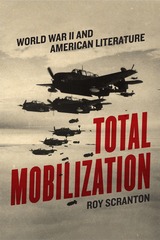 Total Mobilization: World War II and American Literature
Roy Scranton
University of Chicago Press, 2019
Since World War II, the story of the trauma hero—the noble white man psychologically wounded by his encounter with violence—has become omnipresent in America’s narratives of war, an imaginary solution to the contradictions of American political hegemony. In Total Mobilization, Roy Scranton cuts through the fog of trauma that obscures World War II, uncovering a lost history and reframing the way we talk about war today.
Considering often overlooked works by James Jones, Wallace Stevens, Martha Gellhorn, and others, alongside cartoons and films, Scranton investigates the role of the hero in industrial wartime, showing how such writers struggled to make sense of problems that continue to plague us today: the limits of American power, the dangers of political polarization, and the conflicts between nationalism and liberalism. By turning our attention to the ways we make war meaningful—and by excavating the politics implicit within the myth of the traumatized hero—Total Mobilization revises the way we understand not only World War II, but all of postwar American culture.
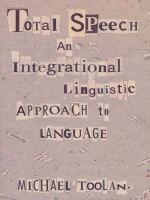 Total Speech: An Integrational Linguistic Approach to Language
Michael Toolan
Duke University Press, 1996 Units, rules, codes, systems: this is how most linguists study language. Integrationalists such as Michael Toolan, however, focus instead on how language functions in seamless tandem with the rest of human activity. In Total Speech, Toolan provides a clear and comprehensive account of integrationalism, a major new theory of language that declines to accept that text and context, language and world, are distinct and stable categories. At the same time, Toolan extends the integrationalist argument and calls for a radical change in contemporary theorizing about language and communication. In every foundational area of linguistics—from literal meaning and metaphor to the nature of repetition to the status of linguistic rules—Toolan advances fascinating and provocative criticisms of received linguistic assumptions. Drawing inspiration from the writings of language theorist Roy Harris, Toolan brings the integrationalist perspective to bear on legal cases, the reception of Salman Rushdie, poetry, and the language of children. Toolan demonstrates that the embeddedness of language and the situation-sensitive mutability of meaning reveal language as a tool for re-fashioning and renewal. Total Speech breaks free of standard linguistics’ fascinated attraction with “cognitive blueprints” and quasi-algorithmic processing to characterize language anew. Toolan’s reflections on the essence of language, including his important discussion of intention, have strong implications for students and scholars of discourse analysis, literature, the law, anthropology, philosophy of language, communication theory, and cognitive science, as well as linguistics.
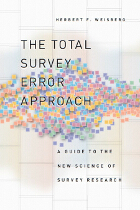 The Total Survey Error Approach: A Guide to the New Science of Survey Research
Herbert F. Weisberg
University of Chicago Press, 2005 In 1939, George Gallup's American Institute of Public Opinion published a pamphlet optimistically titled The New Science of Public Opinion Measurement. At the time, though, survey research was in its infancy, and only now, six decades later, can public opinion measurement be appropriately called a science, based in part on the development of the total survey error approach.
Herbert F. Weisberg's handbook presents a unified method for conducting good survey research centered on the various types of errors that can occur in surveys—from measurement and nonresponse error to coverage and sampling error. Each chapter is built on theoretical elements drawn from specific disciplines, such as social psychology and statistics, and follows through with detailed treatments of the specific types of error and their potential solutions. Throughout, Weisberg is attentive to survey constraints, including time and ethical considerations, as well as controversies within the field and the effects of new technology on the survey process—from Internet surveys to those completed by phone, by mail, and in person. Practitioners and students will find this comprehensive guide particularly useful now that survey research has assumed a primary place in both public and academic circles.
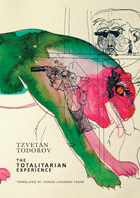 The Totalitarian Experience
Tzvetan Todorov
Seagull Books, 2011 The fall of the Berlin Wall marked the beginning of the collapse of the Soviet Union, as well as many other communist totalitarian regimes around the world. But it would be naive to assume that this historic, symbolic event and its aftermath have completely rid the world of totalitarianism. Instead, we should ask, what is the totalitarian experience and how does it survive today? This is the imposing question raised by acclaimed philosopher and writer Tzvetan Todorov in this compact, highly personal essay. Here, he recounts his own experiences with totalitarianism in his native Bulgaria and discusses the books he has written in the last twenty years that were devoted to examining such regimes, such as Voices from the Gulag, his influential analysis of Stalinist concentration camps. Through this retrospective investigation, Todorov offers a historical look at communism. He brings together and distills his extensive oeuvre to reveal the essence of totalitarian ideology, the characteristics of daily life under communism, and the irony of democratic messianism. Bringing his thoughts and insights up to the present, Todorov explores how economic ultraliberalism may be considered just another form of totalitarianism. And his conclusion leads us to ask ourselves another challenging question: Are liberal democratic societies actually totalitarian experiences in disguise? “In this honed, finely calibrated essay, Todorov refutes the notion that good can be imposed by force. More efficient is to embody one’s values and demonstrate their worth. . . . This is a concise and eloquent defence of what makes us truly human.”—Age, on Torture and the War on Terror
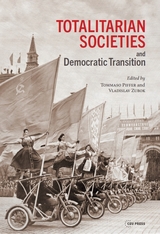 Totalitarian Societies and Democratic Transition: Essays in Memory of Victor Zaslavsky
Riccardo James Vargiu
Central European University Press, 2017 This book is a tribute to the memory of Victor Zaslavsky (1937–2009), sociologist, émigré from the Soviet Union, Canadian citizen, public intellectual, and keen observer of Eastern Europe. In seventeen essays leading European, American and Russian scholars discuss the theory and the history of totalitarian society with a comparative approach. They revisit and reassess what Zaslavsky considered the most important project in the latter part of his life: the analysis of Eastern European - especially Soviet societies and their difficult “transition” after the fall of communism in 1989–91. The variety of the contributions reflects the diversity of specialists in the volume, but also reveals Zaslavsky's gift: he surrounded himself with talented people from many different fields and disciplines. In line with Zaslavsky's work and scholarly method, the book promotes new theoretical and methodological approaches to the concept of totalitarianism for understanding Soviet and East European societies, and the study of fascist and communist regimes in general.
 Totalitarianism: Proceedings of a Conference Held at the American Academy of Arts and Sciences, March 1953
Carl J. Friedrich
Harvard University Press This collaborative volume explores the challenge of totalitarianism, and more especially the issue of freedom and totalitarianism, in the world today. It is the outgrowth of a conference on totalitarianism held by the American Academy of Arts and Sciences last year. The participants, who represent many fields and interests, successively consider ideological and psychological aspects of the problem, and then totalitarianism in its relation to intellectual life and to social and economic organization. In conclusion they look at totalitarianism and the future.
The contributors to the volume are: George F. Kennan, Jerzy G. Gliksman, N. E. Timasheff, Carl J. Friedrich, Alex Inkeles, Franklin H. Littell, Waldemar Gurian, Raymond Bauer, Erik H. Erikson, Else Frenkel-Brunswik, Marie Jahoda, Stuart W. Cook, H. J. Muller, Georgede Santillana, Bertram D. Wolfe, Albert Lauterbach, J. P. Nettl, Karl W. Deutsch, Paul Kecskemeti, Harold D. Lasswell, Andrew Gyorgy.
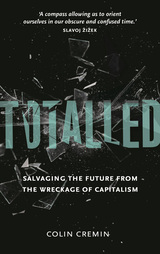 Totalled: Salvaging the Future from the Wreckage of Capitalism
Colin Cremin
Pluto Press, 2015 Have you ever felt totaled? In this book, Colin Cremin tackles the overbearing truth that capitalism encompasses the totality of our social relations, having woven itself deeply into the fabric of what it means to be human. He shows how the capitalist system totalizes everything in its path, as evidenced in industrialized warfare, modern surveillance, commodification, and political control. With ever deepening social crises and ecological catastrophes this system threatens civilization as we know it. But among the wreckage of capitalism, Cremin argues, we can still find functioning parts, machines to be salvaged. To do so, it is imperative that we be able to both imagine and realize a future other than the apocalypticism forewarned by scientists, prescribed by economists, accommodated by politicians, and made into spectacle by the entertainment industry.
Totalled maps the deteriorating socio-economic, political, and ecological conditions in which we live. Yet Cremin asks how a utopian possibility discernable in the power of human creation can be realized even though as a society we are bound up materially, ideologically, libidinally—totally—to the capitalist machine of destruction. Totalled concludes with a politically and economically grounded set of propositions on how we might begin to imagine such a possibility.
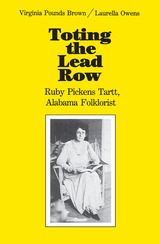 Toting the Lead Row: Ruby Pickens Tartt, Alabama Folklorist
Virginia Pounds Brown
University of Alabama Press, 1981 Preserving voices from the back roads—Ruby Pickens Tartt and the folklore of Alabama’s Black Belt. “You recall the expression ‘toting the lead row’, don’t you? In chopping cotton or corn there is always a leader, one who can chop the fastest of them all. When he finishes his row, he goes back and helps the other choppers finish theirs. The one who totes the lead row takes the lead place in the next row.”—Ruby Pickens Tartt Toting the Lead Row is a powerful biographical and cultural tribute to Ruby Pickens Tartt, a white woman from Alabama’s Black Belt who devoted her life to preserving the oral traditions of rural Black communities. Born in 1880 in Livingston, Alabama, Tartt witnessed nearly a century of social transformation and made it her mission to document the songs, stories, and life histories of her African American neighbors. She believed that the soul of Sumter County resided not in its institutions, but in its cabins, fields, and voices. During the Great Depression, Tartt worked with the Federal Writers’ Project, collaborating with renowned folklorists such as Carl Carmer and John Lomax. Her home became a hub for cultural preservation, attracting scholars and artists who recognized the depth of her fieldwork. The book’s title refers to a Southern agricultural phrase—“toting the lead row”—symbolizing leadership and support, a role Tartt embodied in her efforts to elevate the voices of those often overlooked. This volume is divided into two parts: the first offers a detailed biography of Tartt and her work with the WPA, while the second presents a curated selection of her collected writings, including 18 life histories and 12 slave narratives. Through these stories, Tartt preserved a vital piece of Southern history and gave voice to generations whose experiences might otherwise have been lost. Toting the Lead Row is both a celebration of a remarkable woman and a vital contribution to the study of folklore, race, and Southern identity.
 TOUCH
Caterina Nirta, Danilo Mandic, Andrea Pavoni and Andreas Philippopoulos-Mihalopoulos
University of Westminster Press, 2020 Described by Aristotle as the most vital of senses, touch contains both the physical and the metaphysical in its ability to express the determination of being. To manifest itself, touch makes a movement outwards, beyond the body, and relies on a specific physical involvement other senses do not require: to touch is already to be active and to activate. This fundamental ontology makes touch the most essential of all senses. This volume of ‘Law and the Senses’ attempts to illuminate and reconsider the complex and interflowing relations and contradictions between the tactful intrusion of the law and the untactful movement of touch. Compelling contributors from arts, literature and social science disciplines alongside artist presentations explore touch’s boundaries and formal and informal ‘laws’ of the senses. Each contribution unveils a multi-faceted new dimension to the force of touch, its ability to form, deform and reform what it touches. In unique ways, each of the several contributions to this volume recognises the trans-corporeality of touch to traverse the boundaries on the body and entangle other bodies and spaces, thus challenging the very notion of corporeal integrity and human being.
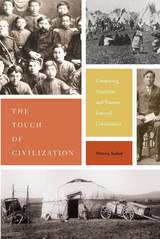 "The Touch of Civilization": Comparing American and Russian Internal Colonization
Steven Sabol
University Press of Colorado, 2017 The Touch of Civilization is a comparative history of the United States and Russia during their efforts to colonize and assimilate two indigenous groups of people within their national borders: the Sioux of the Great Plains and the Kazakhs of the Eurasian Steppe. In the revealing juxtaposition of these two cases author Steven Sabol elucidates previously unexplored connections between the state building and colonizing projects these powers pursued in the nineteenth century.
This critical examination of internal colonization—a form of contiguous continental expansion, imperialism, and colonialism that incorporated indigenous lands and peoples—draws a corollary between the westward-moving American pioneer and the eastward-moving Russian peasant. Sabol examines how and why perceptions of the Sioux and Kazakhs as ostensibly uncivilized peoples and the Northern Plains and the Kazakh Steppe as “uninhabited” regions that ought to be settled reinforced American and Russian government sedentarization policies and land allotment programs. In addition, he illustrates how both countries encountered problems and conflicts with local populations while pursuing their national missions of colonization, comparing the various forms of Sioux and Kazakh martial, political, social, and cultural resistance evident throughout the nineteenth century.
Presenting a nuanced, in-depth history and contextualizing US and Russian colonialism in a global framework, The Touch of Civilization will be of significant value to students and scholars of Russian history, American and Native American history, and the history of colonization.
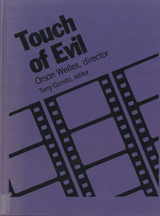 Touch of Evil: Orson Welles, Director
Edited by Terry Comito
Rutgers University Press, 1985 Welles is by consensus one of the most talented directors who ever worked in Hollywood, and this flamboyant film - a 1958 exploration of the thriller form - is one of his greatest achievements.
Comito's introduction considers the film's relation to the tradition of film noir and demonstrates how Welles's mastery of cinematic language transforms the materials of a routine thriller into a work that is at once a sardonic examination of the dark side of sexuality, an elegiac rumination on the loss of innocence, and a disquieting assault on the viewer's own moral and ascetic certainties.
Other contextual materials in the book include a biographical sketch of Welles; an important interview with Welles by Andre Bazin, Charles Bitsch, and Jean Domarchi, available here for the first time in English; an interview with Charlton Heston on the making of the film; representative reviews; critical essays by William Johnson, Jean Collett (translated especially for this book), Stephen Heath; an analysis of the relation of the complete film to Welles's recently discovered shooting script; and filmography and bibliography. The continuity script collates the two available versions of Touch of Evil and provides an invaluable, shot-by-shot guide through the visual and audio complexities of Welles's masterpiece.
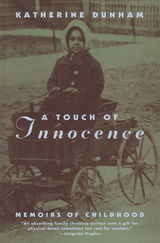 A Touch of Innocence: A Memoir of Childhood
Katherine Dunham
University of Chicago Press, 1994 An internationally known dancer, choreographer, and gifted anthropologist, Katherine Dunham was born to a black American tailor and a well-to-do French Canadian woman twenty years his senior. This book is Dunham's story of the chaos and conflict that entered her childhood after her mother's early death.
In stark prose, she tells of growing up in both black and white households and of the divisions of race and class in Chicago that become the harsh realities of her young life. A riveting narrative of one girl's struggle to transcend the painful confusions of a family and culture in turmoil, Dunham's story is full of the clarity, candor, and intelligence that lifted her above her troubled beginnings.
"A Touch of Innocence is an absorbing family chronicle written with a gift for physical detail sometimes too real for comfort. In quietly graphic prose the growing girl, the slightly older brother, the ambitious father and the kind stepmother are pictured in such human terms that when their lives get tied into harder and harder knots beyond their undoing, one can only continue to read helplessly as doom closes in upon the household."—Langston Hughes, New York Herald Tribune
"A Touch of Innocence is one of the most extraordinary life stories I have ever read . . . . The content of this book is so heartbreaking that only the strongest artistic skills can keep it from leaking out into sobbing self-pity, but Katherine Dunham's art contains it, understands it and refuses to be overwhelmed by its terrors."—Elizabeth Janeway, New York Times
"The first eighteen years of the famous dancer and choreographer's life are brought vividly to the reader in this first volume of her autobiography. She writes of what it is like to be a special, gifted young woman growing up in a racially mixed family in the American Middle West. A beautiful, touching and sometimes discomforting book."—Publishers Weekly
"As writing it is honest, searing, graphic and touching, giving us a rather heartbreaking early view of the young American Negro who was later to make a name for herself as a dancer and choreographer."—Arthur Todd, Saturday Review
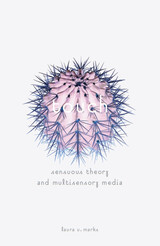 Touch: Sensuous Theory And Multisensory Media
Laura U. Marks
University of Minnesota Press, 2002 Proposes a revolutionary approach to the interpretation of art, film, and the digital. In Touch, Laura U. Marks develops a critical approach more tactile than visual, an intensely physical and sensuous engagement with works of media art that enriches our understanding and experience of these works and of art itself. These critical, theoretical, and personal essays serve as a guide to developments in nonmainstream media art during the past ten years—sexual representation debates, documentary ethics, the shift from analog to digital media, a new social obsession with smell. Marks takes up well-known artists like experimental filmmaker Ken Jacobs and mysterious animators the Brothers Quay, and introduces groundbreaking, lesser-known film, video, and digital artists. From this emerges a materialist theory—an embodied, erotic relationship to art and to the world. Marks’s approach leads to an appreciation of the works’ mortal bodies: film’s volatile emulsion, video’s fragile magnetic base, crash-prone Net art; it also offers a productive alternative to the popular understanding of digital media as "virtual" and immaterial. Weaving a continuous fabric from philosophy, fiction, science, dreams, and intimate experience, Touch opens a new world of art media to readers.
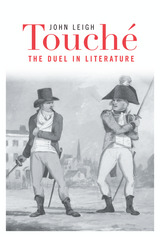 Touché: The Duel in Literature
John Leigh
Harvard University Press, 2015 The monarchs of seventeenth-century Europe put a surprisingly high priority on the abolition of dueling, seeing its eradication as an important step from barbarism toward a rational state monopoly on justice. But it was one thing to ban dueling and another to stop it. Duelists continued to kill each other with swords or pistols in significant numbers deep into the nineteenth century. In 1883 Maupassant called dueling “the last of our unreasonable customs.” As a dramatic and forbidden ritual from another age, the duel retained a powerful hold on the public mind and, in particular, the literary imagination.
Many of the greatest names in Western literature wrote about or even fought in duels, among them Corneille, Molière, Richardson, Rousseau, Pushkin, Dickens, Hugo, Dumas, Twain, Conrad, Chekhov, and Mann. As John Leigh explains, the duel was a gift as a plot device. But writers also sought to discover in duels something more fundamental about human conflict and how we face our fears of humiliation, pain, and death. The duel was, for some, a social cause, a scourge to be mocked or lamented; yet even its critics could be seduced by its risk and glamour. Some conservatives defended dueling by arguing that the man of noble bearing who cared less about living than living with honor was everything that the contemporary bourgeois was not. The literary history of the duel, as Touché makes clear, illuminates the tensions that attended the birth of the modern world.
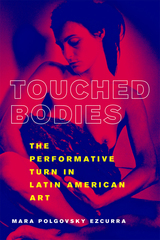 Touched Bodies: The Performative Turn in Latin American Art
Mara Polgovsky Ezcurra
Rutgers University Press, 2019 Shortlisted for the 2020 Association for the Study of the Arts of the Present Book Prize
Winner of the 2019 Art Journal Prize from the College Art Association
What is the role of pleasure and pain in the politics of art? In Touched Bodies, Mara Polgovsky Ezcurra approaches this question as she examines the flourishing of live and intermedial performance in Latin America during times of authoritarianism and its significance during transitions to democracy. Based on original documents and innovative readings, her book brings politics and ethics to the discussion of artistic developments during the “long 1980s”. She describes the rise of performance art in the context of feminism, HIV-activism, and human right movements, taking a close look at the work of Diamela Eltit and Raúl Zurita from Chile, León Ferrari and Liliana Maresca from Argentina, and Marcos Kurtycz, the No Grupo art collective, and Proceso Pentágono from Mexico. The comparative study of the work of these artists attests to a performative turn in Latin American art during the 1980s that, like photography and film before, recast the artistic field as a whole, changing the ways in which we perceive art and understand its role in society.
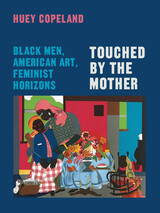 Touched by the Mother: Black Men, American Art, Feminist Horizons
Huey Copeland
University of Chicago Press, 2026 Writings on black men’s cultural production and black masculinity by one of today’s leading historians of modern and contemporary art.
Collecting twenty years of incisive essays, articles, and interviews—including four published here for the first time—by art historian Huey Copeland, this book affirms the extraordinary depth of black men’s cultural production and the diversity of artistic practices that explore visual black masculinity in the United States. Part history, part memoir, part critical manifesto, Touched by the Mother offers a multi-faceted look at American art and discourse of the past fifty years, a personal meditation on navigating the world as a black gay man, and a feminist perspective on the ways transatlantic slavery continues to mark African and African diasporic men. Focusing on how the black maternal shapes black masculinity, Copeland confronts the dynamics that position African-American men—after their mothers—as sites of violence, creativity, and contestation in the cultural imagination.
Richly illustrated throughout, Touched by the Mother considers an exciting range of assemblage, painting, performance, photography, sculpture, and video works by more than twenty renowned practitioners, along with interviews featuring Hilton Als, Thelma Golden, Frank B. Wilderson, III, and other influential figures in contemporary art, culture, and criticism. Works by artists including Mark Bradford, Theaster Gates, David Hammons, Barkley L. Hendricks, Arthur Jafa, Glenn Ligon, Kerry James Marshall, Howardena Pindell, Sun Ra, and Lorna Simpson represent modes of making and thinking that are uniquely “touched by the mother,” Copeland argues, moving us toward the promise of black feminist futures.
Touching Base: Professional Baseball and American Culture in the Progressive Era
Steven A. Riess
University of Illinois Press, 1999 The revised and expanded edition of Touching Base examines the myths, realities, symbols, and rituals of America's national pastime. Steven Riess details the relationships among urban politics, communities, and baseball while exploring how Progressive Era sensibilities shaped debates over issues like Sunday games, ballpark construction, and promotion of the games. Focusing on Atlanta, New York, and Chicago, Riess looks at all the participants--from spectators to owners to players--in analyzing how baseball both influenced and mirrored broader society.
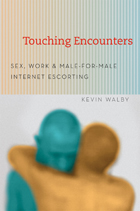 Touching Encounters: Sex, Work, and Male-for-Male Internet Escorting
Kevin Walby
University of Chicago Press, 2012 Often depicted as deviant or pathological by public health researchers, psychoanalysts, and sexologists, male-with-male sex and sex work is, in fact, an increasingly mainstream pursuit. Based on a qualitative investigation of the practices involved in male-with-male—or m4m—Internet escorting, Touching Encounters is the first book to explicitly address how masculinity and sexuality shape male commercial sex in this era of Internet communications. By looking closely at the sex and work of male escorts, Kevin Walby tries to reconcile the two extremes of m4m sex—the stereotypical idea of a quick cash transaction and the tendency toward friendship and mutuality. In doing so, Walby draws on the work of Foucault to make visible the play of power in these physical and commercial relations between men. At once a revelation to the sociology of work and a much-needed critical engagement with queer theory, Touching Encounters responds to calls from across the social sciences to connect Foucault with sociologies of sex, sexuality, and intimacy. Walby does this and more, retying this sexual practice back to society at large.
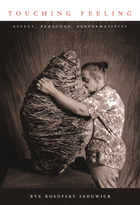 Touching Feeling: Affect, Pedagogy, Performativity
Eve Kosofsky Sedgwick
Duke University Press, 2003 A pioneer in queer theory and literary studies, Eve Kosofsky Sedgwick brings together for the first time in Touching Feeling her most powerful explorations of emotion and expression. In essays that show how her groundbreaking work in queer theory has developed into a deep interest in affect, Sedgwick offers what she calls "tools and techniques for nondualistic thought," in the process touching and transforming such theoretical discourses as psychoanalysis, speech-act theory, Western Buddhism, and the Foucauldian "hermeneutics of suspicion." In prose sometimes somber, often high-spirited, and always accessible and moving, Touching Feeling interrogates—through virtuoso readings of works by Henry James, J. L. Austin, Judith Butler, the psychologist Silvan Tomkins and others—emotion in many forms. What links the work of teaching to the experience of illness? How can shame become an engine for queer politics, performance, and pleasure? Is sexuality more like an affect or a drive? Is paranoia the only realistic epistemology for modern intellectuals? Ultimately, Sedgwick's unfashionable commitment to the truth of happiness propels a book as open-hearted as it is intellectually daring.
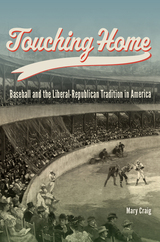 Touching Home: Baseball and the Liberal-Republican Tradition in America
Mary Craig
University of Missouri Press, 2025 Baseball’s relationship to American ideals has long been an object of study across disciplines. In Touching Home, Mary Craig contributes to this ongoing study by relating issues of class, race, and gender to America’s theoretical tradition of liberalism and republicanism established during the nation’s founding era. Specifically, Touching Home traces theories of individualism and civic virtue from the founding era through baseball’s place in American society at the end of the twentieth century.
The work also examines the mythologizing of baseball’s pastoralism, racial equality, and inculcation of manliness as a civic virtue. These myths became ingrained in baseball in significant ways, including, for example, the Supreme Court’s granting of an antitrust exemption to Major League Baseball; MLB’s promotion of Jackie Robinson’s career as proof of its leadership in and commitment to desegregation; and the short-lived All-American Girls Professional Baseball League (1943-1954) and subsequent relegation of women to softball.
Through the exploration of these and other societal issues, Craig’s work highlights baseball’s development from accessible hobby to multi-billion-dollar corporation, exploring the ways in which the sport has helped shape how individual Americans engage with politics. Indeed, in the pages of Touching Home readers will find a demythologizing of baseball that helps them better understand the results of their efforts to form community through engaging with teams at both the local and national levels. Scholars of American politics, particularly American political thought, will be intrigued to find baseball used as a case study of the effectiveness of the founders’ project of crafting a jointly liberal-republican framework capable of directing Americans toward responsible citizenship.
In all of these ways, Touching Home upholds the value of studying popular culture, presenting baseball as a unique and highly interesting lens through which to help us appreciate how individual Americans relate to politics and parties in their respective communities and nationally.
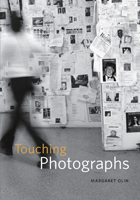 Touching Photographs
Margaret Olin
University of Chicago Press, 2012 Photography does more than simply represent the world. It acts in the world, connecting people to form relationships and shaping relationships to create communities. In this beautiful book, Margaret Olin explores photography’s ability to “touch” us through a series of essays that shed new light on photography’s role in the world. Olin investigates the publication of photographs in mass media and literature, the hanging of exhibitions, the posting of photocopied photographs of lost loved ones in public spaces, and the intense photographic activity of tourists at their destinations. She moves from intimate relationships between viewers and photographs to interactions around larger communities, analyzing how photography affects the way people handle cataclysmic events like 9/11. Along the way, she shows us James VanDerZee’s Harlem funeral portraits, dusts off Roland Barthes’s family album, takes us into Walker Evans and James Agee’s photo-text Let Us Now Praise Famous Men, and logs onto online photo albums. With over one hundred illustrations, Touching Photographs is an insightful contribution to the theory of photography, visual studies, and art history.
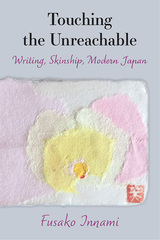 Touching the Unreachable: Writing, Skinship, Modern Japan
Fusako Innami
University of Michigan Press, 2021 Fusako Innami offers the first comprehensive study of touch and skinship—relationality with the other through the skin—in modern Japanese writing. The concept of the unreachable—that is, the lack of characters’ complete ability to touch what they try to reach for—provides a critical intervention on the issue of intimacy. Touch has been philosophically addressed in France, but literature is an effective—or possibly the most productive—venue for exploring touch in Japan, as literary texts depict what the characters may be concerned with but may not necessarily say out loud. Such a moment of capturing the gap between the felt and the said—the interaction between the body and language—can be effectively analyzed by paying attention to layers of verbalization, or indeed translation, by characters’ utterances, authors’ depictions, and readers’ interpretations. Each of the writers discussed in this book—starting with Nobel prize winner Kawabata Yasunari, Tanizaki Jun’ichirō, Yoshiyuki Junnosuke, and Matsuura Rieko—presents a particular obsession with objects or relationality to the other constructed via the desire for touch.
In Touching the Unreachable, phenomenological and psychoanalytical approaches are cross-culturally interrogated in engaging with literary touch to constantly challenge what may seem like the limit of transferability regarding concepts, words, and practices. The book thereby not only bridges cultural gaps beyond geographic and linguistic constraints, but also aims to decentralize a Eurocentric hegemony in its production and use of theories and brings Japanese cultural and literary analyses into further productive and stimulating intellectual dialogues. Through close readings of the authors’ treatment of touch, Innami develops a theoretical framework with which to examine intersensorial bodies interacting with objects and the environment through touch.
Touching This Leviathan
Peter Wayne Moe
Oregon State University Press, 2021 Touching This Leviathan asks how we might come to know the unknowable—in this case, whales, animals so large yet so elusive, revealing just a sliver of back, a glimpse of a fluke, or a split-second breach before diving away. Whale books often sit within disciplinary silos. Touching This Leviathan starts a conversation among them. Drawing on biology, theology, natural history, literature, and writing studies, Peter Wayne Moe offers a deep dive into the alluring and impalpable mysteries of Earth’s largest mammal. Entertaining, thought-provoking, and swimming with intelligence and wit, Touching is Leviathan is creative nonfiction that gestures toward science and literary criticism as it invites readers into the belly of the whale.
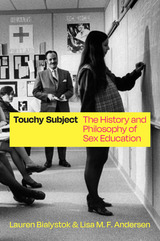 Touchy Subject: The History and Philosophy of Sex Education
Lauren Bialystok and Lisa M. F. Andersen
University of Chicago Press, 2022 A case for sex education that puts it in historical and philosophical context.
In the United States, sex education is more than just an uncomfortable rite of passage: it's a political hobby horse that is increasingly out of touch with young people’s needs. In Touchy Subject, philosopher Lauren Bialystok and historian Lisa M. F. Andersen unpack debates over sex education, explaining why it’s worth fighting for, what points of consensus we can build upon, and what sort of sex education schools should pursue in the future.
Andersen surveys the history of school-based sex education in the United States, describing the key question driving reform in each era. In turn, Bialystok analyzes the controversies over sex education to make sense of the arguments and offer advice about how to make educational choices today. Together, Bialystok and Andersen argue for a novel framework, Democratic Humanistic Sexuality Education, which exceeds the current conception of “comprehensive sex education” while making room for contextual variation. More than giving an honest run-down of the birds and the bees, sex education should respond to the features of young people’s evolving worlds, especially the digital world, and the inequities that put some students at much higher risk of sexual harm than others. Throughout the book, the authors show how sex education has progressed and how the very concept of “progress” remains contestable.
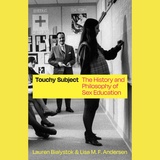 Touchy Subject: The History and Philosophy of Sex Education
Lauren Bialystok and Lisa M. F. Andersen
University of Chicago Press, 2022 This is an auto-narrated audiobook edition of this book.
A case for sex education that puts it in historical and philosophical context.
In the United States, sex education is more than just an uncomfortable rite of passage: it's a political hobby horse that is increasingly out of touch with young people’s needs. In Touchy Subject, philosopher Lauren Bialystok and historian Lisa M. F. Andersen unpack debates over sex education, explaining why it’s worth fighting for, what points of consensus we can build upon, and what sort of sex education schools should pursue in the future.
Andersen surveys the history of school-based sex education in the United States, describing the key question driving reform in each era. In turn, Bialystok analyzes the controversies over sex education to make sense of the arguments and offer advice about how to make educational choices today. Together, Bialystok and Andersen argue for a novel framework, Democratic Humanistic Sexuality Education, which exceeds the current conception of “comprehensive sex education” while making room for contextual variation. More than giving an honest run-down of the birds and the bees, sex education should respond to the features of young people’s evolving worlds, especially the digital world, and the inequities that put some students at much higher risk of sexual harm than others. Throughout the book, the authors show how sex education has progressed and how the very concept of “progress” remains contestable.
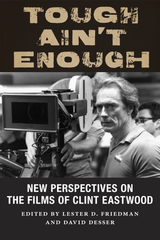 Tough Ain't Enough: New Perspectives on the Films of Clint Eastwood
Friedman, Lester D
Rutgers University Press, 2018 Throughout his lengthy career as both an actor and a director, Clint Eastwood has appeared in virtually every major film genre and, at this point in his career, has emerged as one of America’s most popular, recognizable, and respected filmmakers. He also remains a controversial figure in the political landscape, often characterized as the most prominent conservative voice in mostly liberal Hollywood. At Eastwood’s late age, his critical success as actor and director, his combative willingness to confront serious cultural issues in his films, and his undeniable talent behind the camera all call for a new and comprehensive study that considers and contextualizes his multiple roles, both on and off screen. Tough Ain’t Enough offers readers a series of original essays by prominent cinema scholars that explore the actor-director’s extensive career. The result is a far-reaching and nuanced portrait of one of America’s most prolific and thoughtful filmmakers.
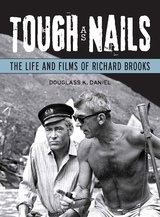 Tough as Nails: The Life and Films of Richard Brooks
Douglass K. Daniel
University of Wisconsin Press, 2011 Called “God’s angry man” for his unyielding demands in pursuit of personal and artistic freedom, Oscar-winning filmmaker Richard Brooks brought us some of the mid-twentieth century’s most iconic films, including Blackboard Jungle, Cat on a Hot Tin Roof, Elmer Gantry, In Cold Blood, and Looking for Mr. Goodbar. “The important thing,” he once remarked, “is to write your story, to make it believable, to make it live.” His own life story has never been fully chronicled, until now. Tough as Nails: The Life and Films of Richard Brooks restores to importance the career of a prickly iconoclast who sought realism and truth in his films. Douglass K. Daniel explores how the writer-director made it from the slums of Philadelphia to the heights of the Hollywood elite, working with the top stars of the day, among them Humphrey Bogart, Cary Grant, Elizabeth Taylor, Jean Simmons, Sidney Poitier, Sean Connery, Gene Hackman, and Diane Keaton. Brooks dramatized social issues and depicted characters in conflict with their own values, winning an Academy Award for his Elmer Gantry screenplay and earning nominations for another seven Oscars for directing and screenwriting. Tough as Nails offers illuminating insights into Brooks’s life, drawing on unpublished studio memos and documents and interviews from stars and colleagues, including Poitier, director Paul Mazursky, and Simmons, who was married to Brooks for twenty years. Daniel takes readers behind the scenes of Brooks’s major films and sheds light on their making, their compromises, and their common threads. Tough as Nails celebrates Brooks’s vision while adding to the critical understanding of his works, their flaws as well as their merits, and depicting the tumults and trends in the life of a man who always kept his own compass. Best Books for General Audiences, selected by the American Association of School Librarians Outstanding Book, selected by the Public Library Reviewers
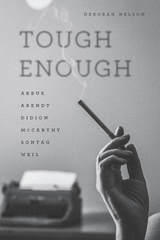 Tough Enough: Arbus, Arendt, Didion, McCarthy, Sontag, Weil
Deborah Nelson
University of Chicago Press, 2017 This book focuses on six brilliant women who are often seen as particularly tough-minded: Simone Weil, Hannah Arendt, Mary McCarthy, Susan Sontag, Diane Arbus, and Joan Didion. Aligned with no single tradition, they escape straightforward categories. Yet their work evinces an affinity of style and philosophical viewpoint that derives from a shared attitude toward suffering. What Mary McCarthy called a “cold eye” was not merely a personal aversion to displays of emotion: it was an unsentimental mode of attention that dictated both ethical positions and aesthetic approaches.
Tough Enough traces the careers of these women and their challenges to the pre-eminence of empathy as the ethical posture from which to examine pain. Their writing and art reveal an adamant belief that the hurts of the world must be treated concretely, directly, and realistically, without recourse to either melodrama or callousness. As Deborah Nelson shows, this stance offers an important counter-tradition to the familiar postwar poles of emotional expressivity on the one hand and cool irony on the other. Ultimately, in its insistence on facing reality without consolation or compensation, this austere “school of the unsentimental” offers new ways to approach suffering in both its spectacular forms and all of its ordinariness.
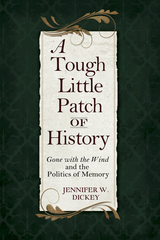 A Tough Little Patch of History: Gone with the Wind and the Politics of Memory
Jennifer W. Dickey
University of Arkansas Press, 2014 More than seventy-five years after its publication, Gone with the Wind remains thoroughly embedded in American culture. Margaret Mitchell’s novel and the film produced by David O. Selznick have melded with the broader forces of southern history, southern mythology, and marketing to become, and remain, a cultural phenomenon. A Tough Little Patch of History (the phrase was coined by a journalist in 1996 to describe the Margaret Mitchell home after it was spared from destruction by fire) explores how Gone with the Wind has remained an important component of public memory in Atlanta through an analysis of museums and historic sites that focus on this famous work of fiction. Jennifer W. Dickey explores how the book and film threw a spotlight on Atlanta, which found itself simultaneously presented as an emblem of both the Old South and the New South. Exhibitions produced by the Atlanta History Center related to Gone with the Wind are explored, along with nearby Clayton County’s claim to fame as “the Home of Gone with the Wind,” a moniker bestowed on the county by Margaret Mitchell’s estate in 1969. There’s a recounting of the saga of “the Dump,” the tiny apartment in midtown Atlanta where Margaret Mitchell wrote the book, and how this place became a symbol for all that was right and all that was wrong with Mitchell’s writing.
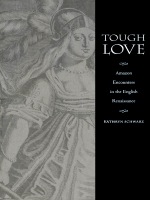 Tough Love: Amazon Encounters in the English Renaissance
Kathryn Schwarz
Duke University Press, 2000 In Tough Love Kathryn Schwarz takes up a range of literary, historical, and theoretical texts in order to examine the relationship between Amazon myth and the social conventions that governed gender and sexuality during the early modern period. Imagined as embodiments of female masculinity, amazonian figures stimulated both homoerotic and heteroerotic response, and Schwarz shows that their appearance in narratives disrupted assumptions concerning identity, gender, domesticity, and desire.
Despite seeming to function as signs for what is outside the social—the alien, the exotic, the other—Amazons in sixteenth- and seventeenth-century texts were often represented in conventionally domestic roles, as mothers and lovers, wives and queens, Schwarz demonstrates. She traces this pattern in works by Shakespeare, Spenser, Sidney, Raleigh, and Jonson, as well as in such materials as conduct manuals, explorers’ accounts, court spectacles, and political tracts. Through readings of these texts, Schwarz shows that the Amazon myth provided a language both for setting forth and for challenging the terms of social logic. In representations of Amazon encounters, she argues, homosocial bonds became indistinguishable from heterosexual desires, masculine agency attached itself as logically to women as it did to men, and sexual difference was made nearly impossible to sustain or define. Schwarz’s analysis unveils the Amazon as a theoretical term, one that illuminates the tensions and paradoxes through which ideologies of the domestic take shape.
Tough Love contributes to the ongoing discussion of gendered identity and sexual desire in the early modern period. It will interest students of queer theory, cultural studies, early modern history, feminism, and literature.
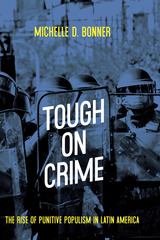 Tough on Crime: The Rise of Punitive Populism in Latin America
Michelle Bonner
University of Pittsburgh Press, 2019 Crime and insecurity are top public policy concerns in Latin America. Political leaders offer tough-on-crime solutions that include increased policing and punishments, and decreased civilian oversight. These solutions, while apparently supported by public opinion, sit in opposition to both criminological research on crime control and human rights commitments. Moreover, many political and civil society actors disagree with such rhetoric and policies. In Tough on Crime, Bonner explores why some voices and some constructions of public opinion come to dominate public debate. Drawing on a comparative analysis of Argentina and Chile, based on over 190 in-depth interviews, and engaging the Euro-American literature on punitive populism, this book argues that a neoliberal media system and the resulting everyday practices used by journalists, state, and civil actors are central to explaining the dominance of tough-on-crime discourse.
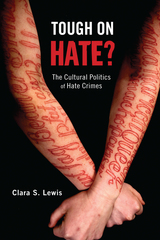 Tough on Hate?: The Cultural Politics of Hate Crimes
Lewis, Clara S
Rutgers University Press, 2013 Why do we know every gory crime scene detail about such victims as Matthew Shepard and James Byrd Jr. and yet almost nothing about the vast majority of other hate crime victims? Now that federal anti-hate-crimes laws have been passed, why has the number of these crimes not declined significantly? To answer such questions, Clara S. Lewis challenges us to reconsider our understanding of hate crimes. In doing so, she raises startling issues about the trajectory of civil and minority rights. Tough on Hate is the first book to examine the cultural politics of hate crimes both within and beyond the law. Drawing on a wide range of sources—including personal interviews, unarchived documents, television news broadcasts, legislative debates, and presidential speeches—the book calls attention to a disturbing irony: the sympathetic attention paid to certain shocking hate crime murders further legitimizes an already pervasive unwillingness to act on the urgent civil rights issues of our time. Worse still, it reveals the widespread acceptance of ideas about difference, tolerance, and crime that work against future progress on behalf of historically marginalized communities.
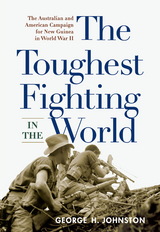 The Toughest Fighting in the World: The Australian and American Campaign for New Guinea in World War II
George H. Johnston
Westholme Publishing, 2011 A Classic Firsthand Account of the Struggle to Stop the Japanese Advance Toward Australia in 1942
Following their attacks on Pearl Harbor, the Dutch East Indies, and the Philippines, the Japanese invaded New Guinea in early 1942 as part of their attempt to create a Pacific empire. Control of New Guinea would enable Japan to establish large army, air force, and naval bases in close proximity to Australia. The Australians, with American cooperation, began a counterattack in earnest. The mountainous terrain covered with nearly impenetrable tropical forest and full of natural hazards resulted in an exceedingly grueling battleground. The struggle for New Guinea, one of the major campaigns of World War II, lasted the entire war, with the crucial fighting occurring in the first year. In The Toughest Fighting in the World, first published in 1943, Australian war correspondent George H. Johnston recorded the efforts of both the Australian and American troops, aided by the New Guinea native people, throughout 1942 as they fought a series of vicious and bitter battles against a determined foe. In one of the classic accounts of combat in World War II, the author makes a compelling case that the hardships endured by the soldiers in New Guinea from both nature and the enemy were among the most severe in the war.
The Toughest Kid We Knew: The Old New West: A Personal History
Frank Bergon
University of Nevada Press, 2020 Frank Bergon’s newest work is a thoughtful exploration of the ways that memories of random childhood events become unexpected revelations about life in the West. In many senses this project is a personalized version of Two-Buck Chuck & The Marlboro Man where Bergon explored the ways that a multiethnic and multiracial society shaped, and continues to shape, the day-to-day lived realities of the residents and communities of the San Joaquin Valley. Bergon’s latest book creation, however, is more elegiac in tone, paying tribute to ranching and farming lives that are disappearing under suburban and exurban sprawl, industrial farming, and white-collar job growth.
 Toumba Tou Skourou: A Bronze Age Potter’s Quarter on Morphou Bay in Cyprus
Emily Vermeule and Florence Z. Wolsky
Harvard University Press, 1990 This sumptuous publication of the archaeological excavation in northwest Cyprus (1971–1973) is sponsored by Harvard University and the Museum of Fine Arts, Boston. The authors present the site, its objects, and its chronological and historical significance against the wider background of Cypriote archaeology, casting new light on the problems of Cypriote pottery classification and the links between Cyprus and the Aegean world, especially Crete. Descriptions of the Mound and Tombs and the catalogues of their contents are supplemented by essays on individual classes of objects.
The book is lavishly illustrated with detailed diagrams and nearly 2,000 photographs and drawings to help the reader understand this active industrial area and its changes through successive generations from the Middle Bronze Age to the Iron Age. An appendix of technical analyses, an inventory of the finds, a list of published references to the excavation, and a bibliography complete the documentation.
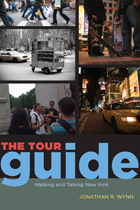 The Tour Guide: Walking and Talking New York
Jonathan R. Wynn
University of Chicago Press, 2011 Everyone wants to visit New York at least once. The Big Apple is a global tourist destination with a dizzying array of attractions throughout the five boroughs. The only problem is figuring out where to start—and that’s where the city’s tour guides come in.
These guides are a vital part of New York’s raucous sidewalk culture, and, as The Tour Guide reveals, the tours they offer are as fascinatingly diverse—and eccentric—as the city itself. Visitors can take tours that cover Manhattan before the arrival of European settlers, the nineteenth-century Irish gangs of Five Points, the culinary traditions of Queens, the culture of Harlem, or even the surveillance cameras of Chelsea—in short, there are tours to satisfy anyone’s curiosity about the city’s past or present. And the guides are as intriguing as the subjects, we learn, as Jonathan R. Wynn explores the lives of the people behind the tours, introducing us to office workers looking for a diversion from their desk jobs, unemployed actors honing their vocal skills, and struggling retirees searching for a second calling. Matching years of research with his own experiences as a guide, Wynn also lays bare the grueling process of acquiring an official license and offers a how-to guide to designing and leading a tour.
Touching on the long history of tour-giving across the globe as well as the ups and downs of New York’s tour guide industry in the wake of 9/11, The Tour Guide is as informative and insightful as the chatty, charming, and colorful characters at its heart.
Touring Nevada: A Historic And Scenic Guide
Al Glass
University of Nevada Press, 1983 A historic and scenic guide to Nevada from the glitz of Las Vegas to the solitude of the desert. Touring Nevada contains 34 one-day tours—all accessible by passenger car—designed to appeal to a wide variety of interests. The tours cover early settlements, the state’s indoor and outdoor recreational activities, and Nevada’s natural scenic wonders. The authors provide clear maps to ensure even the most unfamiliar travelers can find their way with ease.
Touring the Screen: Tourism and New Zealand Film Geographies
Alfio Leotta
Intellect Books, 2011 Following the success of prominent feature films shot on location, including Tolkien’s wildly popular The Lord of the Rings, New Zealand boasts an impressive film tourism industry. This book examines the relationship between New Zealand’s cinematic representation—as both a vast expanse of natural beauty and a magical world of fantasy on screen—and its tourism imagery, including the ways in which savvy local tourism boards have in recent decades used the country’s film representations to sell New Zealand as a premiere travel destination. Focusing on the films that have had a strong impact on marketing strategies by local tourist boards, Touring the Screen will be of interest to all those working and studying in the fields of cinema, postcolonial history, and tourism studies.
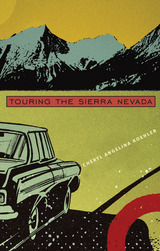 Touring The Sierra Nevada
Cheryl Angelina Koehler
University of Nevada Press, 2007 The complete guide to the entire Sierra NevadaThe Sierra Nevada is one of the most scenic, biologically diverse, and historically rich mountain ranges in North America. Touring the Sierra Nevada covers the entire range and its adjacent regions, exploring the Sierra Nevada from such world-famous sites as Lake Tahoe and Yosemite to picturesque mining towns, scenic alpine lakes, lush vineyards, and colorful hidden byways. Koehler offers suggestions for long tours and exciting daytrips, as well as detailed information about the history, geology, flora and fauna, economy, and unique features of places along the way. The book is illustrated with photographs and maps of the regions she describes. Koehler includes excursions for automobile travelers as well as backcountry adventures for hikers. She provides information about attractions in the Sierra’s two “jumping-off” cities, Sacramento and Reno, as well as in some of the major towns within the range. There is practical advice about contacting parks, museums, historical sites, visitors’ bureaus, U.S. Forest Service offices, and other agencies; finding lodging, campgrounds, and restaurants along the way; preparing for weather and altitude changes; and identifying further sources of information about the region in published guides and other books, as well as on websites. Koehler offers her readers the literary companionship of an experienced, charming, and vivacious guide through one of America’s most fascinating regions.
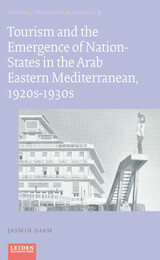 Tourism and the Emergence of Nation-States in the Arab Eastern Mediterranean, 1920s-1930s
Jasmin Daam
Leiden University Press, 2023 "In the aftermath of World War I, the beaten paths of tourism guided an increasing number of international tourists to the hinterlands of the Arab Eastern Mediterranean, where they would admire pyramids and Roman ruins. Yet they were not the only visitors: Arab nationalists gathered in summer resorts, and Yishuvi skiing clubs practised on Lebanese mountain slopes. By catering to these travellers, local tour guides and advocates of tourism development pursued their agendas. The book unearths unexpected connections between tourism and the emergence of nation-states in Egypt, Palestine, Syria and Lebanon. Arab middle-class actors striving for independence, Zionist settlers and mandate officials presented their visions of the post-Ottoman spatial order to an international audience of tourists. At the same time, mobilities and infrastructures of tourism shaped the material conditions of this order. Tourism thus helps us to understand the transformations of Arab societies in their global context, and its history is a colourful story of the emergence of the modern Middle East. "
 Tourism and the Metropolis: Exploring Conceptual and Geographical Frontiers
Edited by Maria Gravari-Barbas, Sébastien Jacquot, Maja Jovic, and Johannes Novy
University of Westminster Press, 2026 The growing role and relevance of tourism in cities – and of cities in tourism – has in recent decades emerged as a topic of great interest to scholars across many social sciences disciplines. Yet, while urban tourism research has flourished, various issues relating to tourism in metropolitan contexts are in need of greater scholarly engagement.
What forms does tourism take in today’s metropolises and metropolitan regions? How do these forms differ from tourism in other urban contexts? Are these differences significant enough to warrant the classification of ‘metropolitan tourism’ as a distinct type of urban tourism? What are their implications for policy and planning processes? How do policy and planning processes in different metropolises and metropolitan regions differ from each other, and what can they learn from each other? And finally, how could tourism in metropolises and metropolitan regions be made more sustainable, resilient, and inclusive?
Given the importance widely attributed to major metropolises and metropolitan regions as contemporary engines of economic development, innovation, and change, the widespread portrayal of tourism as a leading economic and social force of the 21st century, and the fact that the world's large metropolitan areas are key recipients of tourism flows, it is surprising how little systematic attention is paid to tourism in metropolitan contexts. This book aims to fill these gaps.
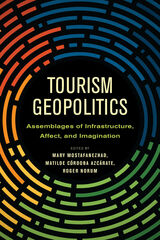 Tourism Geopolitics: Assemblages of Infrastructure, Affect, and Imagination
Edited by Mary Mostafanezhad, Matilde Córdoba Azcárate, Roger Norum
University of Arizona Press, 2021 By the start of the century, nearly one billion international travelers were circulating the globe annually, placing tourism among the worlds’ most ubiquitous geopolitical encounters. While the COVID-19 pandemic brought the industry to a sudden halt, its geopolitical significance remained. With striking clarity, tourism desires and reinvented mobilities revealed the impermanence of Old World orders as new global alliances were forged. While scholars have critically examined tourism in the contexts of development, cultural change, and environmental crisis, much less attention has been paid to the geopolitical drivers and consequences of the world’s largest industry. This collection homes in on tourism and its geopolitical entanglements by examining its contemporary affects, imaginaries, and infrastructures. It develops the concept of tourism geopolitics to reveal the growing centrality of tourism in geopolitical life, as well as the geopolitical nature of the tourism encounter.
In Tourism Geopolitics, contributors show enacted processes such as labor migration, conservation, securitization, nation building, territorial disputes, ethnic cleansing, heritage revitalization, and global health crisis management, among others. These contended societal processes are deployed through tourism development initiatives that mobilize deeply uneven symbolic and material landscapes. The chapters reveal how a range of experiences are implicated in this process: museum visits, walking tours, architectonical evocations of the past, road construction, militarized island imaginations, gendered cultural texts, and official silences. Collectively, the chapters offer ethnographically rich illustrations from around the world that demonstrate the critical nature of tourism in formal geopolitical practices, as well as the geopolitical nature of everyday tourism encounters. This volume is a vital read for critical geographers, anthropologists, and political scientists, as well as scholars of tourism and cultural studies.
Contributors: Sarah Becklake, M. Bianet Castellanos, Matilde Córdoba Azcárate, Jason Dittmer, Klaus Dodds, Jamie Gillen, Simon Halink, Jordan Hallbauer, James Igoe, Debbie Lisle, Mary Mostafanezhad, Dieter K. Müller, Roger Norum, Alessandro Rippa, Ian Rowen, Robert Saunders, Juan Francisco Salazar, Tani Sebro, Mimi Sheller, Henry Szadziewski, Vernadette Vicuña González, Emma Waterton
Tourism, Landscape, and the Irish Character: British Travel Writers in Pre-Famine Ireland
William H. A. Williams
University of Wisconsin Press, 2007 Picturesque but poor, abject yet sublime in its Gothic melancholy, the Ireland perceived by British visitors during the eighteenth and nineteenth centuries did not fit their ideas of progress, propriety, and Protestantism. The rituals of Irish Catholicism, the lamentations of funeral wakes, the Irish language they could not comprehend, even the landscapes were all strange to tourists from England, Wales, and Scotland. Overlooking the acute despair in England’s own industrial cities, these travelers opined in their writings that the poverty, bog lands, and ill-thatched houses of rural Ireland indicated moral failures of the Irish character.
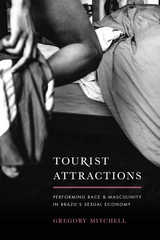 Tourist Attractions: Performing Race and Masculinity in Brazil's Sexual Economy
Gregory Mitchell
University of Chicago Press, 2015 While much attention has been paid in recent years to heterosexual prostitution and sex tourism in Brazil, gay sex tourism has been almost completely overlooked. In Tourist Attractions, Gregory C. Mitchell presents a pioneering ethnography that focuses on the personal lives and identities of male sex workers who occupy a variety of roles in Brazil’s sexual economy.
Mitchell takes us into the bath houses of Rio de Janeiro, where rent boys cruise for clients, and to the beaches of Salvador da Bahia, where African American gay men seek out hustlers while exploring cultural heritage tourist sites. His ethnography stretches into the Amazon, where indigenous fantasies are tinged with the erotic at eco-resorts, and into the homes of “kept men,” who forge long-term, long-distance, transnational relationships that blur the boundaries of what counts as commercial sex. Mitchell asks how tourists perceive sex workers’ performances of Brazilianness, race, and masculinity, and, in turn, how these two groups of men make sense of differing models of racial and sexual identity across cultural boundaries. He proposes that in order to better understand how people experience difference sexually, we reframe prostitution—which Marxist feminists have long conceptualized as sexual labor—as also being a form of performative labor. Tourist Attractions is an exceptional ethnography poised to make an indelible impact in the fields of anthropology, gender, and sexuality, and research on prostitution and tourism.
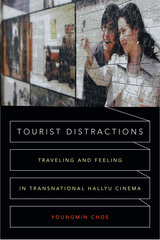 Tourist Distractions: Traveling and Feeling in Transnational Hallyu Cinema
Youngmin Choe
Duke University Press, 2016 In Tourist Distractions Youngmin Choe uses hallyu (Korean-wave) cinema as a lens to examine the relationships among tourism and travel, economics, politics, and history in contemporary East Asia. Focusing on films born of transnational collaboration and its networks, Choe shows how the integration of the tourist imaginary into hallyu cinema points to the region's evolving transnational politics and the ways Korea negotiates its colonial and Cold War past with East Asia's neoliberal present. Hallyu cinema's popularity has inspired scores of international tourists to visit hallyu movie sets, filming sites, and theme parks. This tourism helps ease regional political differences; reimagine South Korea's relationships with North Korea, China, and Japan; and blur the lines between history, memory, affect, and consumerism. It also provides distractions from state-sponsored narratives and forges new emotional and economic bonds that foster community and cooperation throughout East Asia. By attending to the tourist imaginary at work in hallyu cinema, Choe helps us to better understand the complexities, anxieties, and tensions of East Asia's new affective economy as well as Korea's shifting culture industry, its relation to its past, and its role in a rapidly changing region.
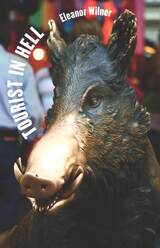 Tourist in Hell
Eleanor Wilner
University of Chicago Press, 2010 Eleanor Wilner’s poems attempt to absorb the shock of the wars and atrocities of the twentieth and early twenty-first centuries. In their litany of loss, in their outrage and sorrow, they retain the joy in life, mercy for the mortal condition, and praise for the plenitude of nature and the gifts of human artistry. As with her six earlier collections, these poems are drawn from the transpersonal realm of history and cultural memory, but they display an increasing horror at the bloody repetitions of history, its service of death, and the destructive savagery of power separated from intelligence and restraint. The poems describe “a sordid drama” in which the players wear “eyeless masks,” and the only thing time changes is the name of the enemy. Underneath it all, driving “the art that” in both senses “keeps nothing at bay,” swim the enormous formal energies of life, the transitive figure that moves on in the depths, something glimpsed in the first light, something stronger than hope. “It is a relief to come across work in which a moral intelligence is matched by aesthetic refinement, in which the craft of the poems is equal to their concerns.”--Christian Wiman, Poetry
 The Tourist State: Performing Leisure, Liberalism, and Race in New Zealand
Margaret Werry
University of Minnesota Press, 2011 No longer the dreary sheep farm at the end of the world, the New Zealand of the new millennium is a hot global ticket, heralded for its bicultural dynamism, laid-back lifestyle, and scenery extraordinary enough to pass for Tolkien’s Middle Earth. How this image was crafted is the story The Tourist State tells. In a series of narratives that address the embodied dimensions of biopolitics and explore the collision of race, performance, and the cultural poetics of the state, Margaret Werry exposes the real drama behind the new New Zealand, revealing how a nation was sold to the world—and to itself. The story stretches back to the so-called Liberal Era at the beginning of the twentieth century, in which the young settler colony touted itself as the social laboratory of the world. Focusing on where tourism and liberal governmentality coincide, The Tourist State takes us from military diplomacy at the dawn of the American Pacific to the exotic blandishments of Broadway and Coney Island, from landscape preservation to health reform and town planning, from blockbuster film to knowledge economy policy. Weaving together interpretive history, performance ethnography, and cultural criticism, Werry offers new ways to think about race and indigeneity—and about the role of human agency in state-making.
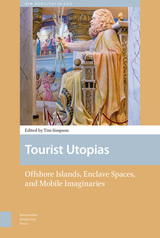 Tourist Utopias: Offshore Islands, Enclave Spaces, and Mobile Imaginaries
Edited by Timothy Simpson
Amsterdam University Press, 2017 Released on the 500-year anniversary of the publication of Sir Thomas More's Utopia, this volume seeks to adapt and apply More's fecund imagination to the contemporary leisure landscape. The contributors to this volume theorize and analyze a variety of 'tourist utopias' - a nascent socio-spatial form crucial to a post-industrial global economy. From Disney World to Dubai, 'Middle Earth' to Marina Bay, Macau to Abu Dhabi, these sites share common characteristics that include their respective status as 'spaces of exception'; entrepreneurial governance regimes that rely on cooperation among state and non-state actors; transient, multinational populations; immaterial and affective forms of labor and consumption; superlative and iconic architecture; and economies devoted to such leisure activities as shopping, gambling, and spectacle. These locales are not only popular destinations for migrant workers and mobile tourists from around the globe, but also serve as cultural laboratories for testing new formats and protocols of an emergent post-Fordist form-of-life.
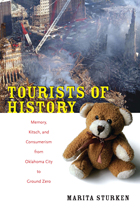 Tourists of History: Memory, Kitsch, and Consumerism from Oklahoma City to Ground Zero
Marita Sturken
Duke University Press, 2007 In Tourists of History, the cultural critic Marita Sturken argues that over the past two decades, Americans have responded to national trauma through consumerism, kitsch sentiment, and tourist practices in ways that reveal a tenacious investment in the idea of America’s innocence. Sturken investigates the consumerism that followed from the September 11th attacks; the contentious, ongoing debates about memorials and celebrity-architect designed buildings at Ground Zero; and two outcomes of the bombing of the Alfred P. Murrah Federal Building in Oklahoma City: the Oklahoma City National Memorial and the execution of Timothy McVeigh. Sturken contends that a consumer culture of comfort objects such as World Trade Center snow globes, FDNY teddy bears, and Oklahoma City Memorial t-shirts and branded water, as well as reenactments of traumatic events in memorial and architectural designs, enables a national tendency to see U.S. culture as distant from both history and world politics. A kitsch comfort culture contributes to a “tourist” relationship to history: Americans can feel good about visiting and buying souvenirs at sites of national mourning without having to engage with the economic, social, and political causes of the violent events. While arguing for the importance of remembering tragic losses of life, Sturken is urging attention to a dangerous confluence—of memory, tourism, consumerism, paranoia, security, and kitsch—that promulgates fear to sell safety, offers prepackaged emotion at the expense of critical thought, contains alternative politics, and facilitates public acquiescence in the federal government’s repressive measures at home and its aggressive political and military policies abroad.
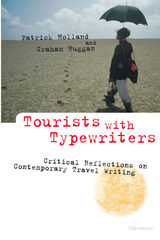 Tourists with Typewriters: Critical Reflections on Contemporary Travel Writing
Patrick Holland and Graham Huggan
University of Michigan Press, 2000 The first extensive survey of contemporary travel writing, Tourists with Typewriters offers a series of challenging and provocative critical insights into a wide range of travel narratives written in English after the Second World War. The book focuses in particular on contemporary travel writers such as Jan Morris, Peter Matthiessen, V. S. Naipaul, Barry Lopez, Mary Morris, Paul Theroux, Peter Mayle, and the late Bruce Chatwin. It examines some of the reasons for travel writing's enduring popularity, and for its particular appeal to readers--many of them also travelers--in the present.
The book maps new terrain in a growing area of critical study. Although critical of travel writing's complacency and its often unacknowledged ethnocentrism, the book recognizes its importance as both a literary and cultural form. While travel writing at its worst emerges as a crude expression of economic advantage, at its best it becomes a subtle instrument of cultural self-perception, a barometer for changing views of "other" (i.e., foreign, non-Western) cultures, and a trigger for the information circuits that tap us into the wider world.
Tourists with Typewriters gauges both the best and worst in contemporary travel writing, capturing the excitement of this most volatile--and at times infuriating--of literary genres. The book will appeal to general readers interested in a closer examination of travel writing and to academic readers in disciplines such as literary/cultural studies, geography, history, anthropology, and tourism studies.
"An eminently readable and informative study. It breathes tolerance and intelligence. It is critically perceptive and very au courant. It raises issues (coloniality, postmodernity, gender. . . ) and discusses books that readers of many different stripes will want to find out about." --Ross Chambers, University of Michigan
Patrick Holland, Associate Professor of English, University of Guelph, was born in New Zealand and educated in England, Australia, and Canada. Graham Huggan, Professor of English, University of Munich, was born in Hong Kong and educated in England and in British Columbia.
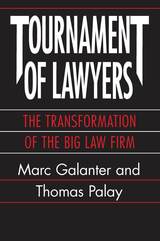 Tournament of Lawyers: The Transformation of the Big Law Firm
Marc Galanter and Thomas Palay
University of Chicago Press, 1991 Tournament of Lawyers traces in detail the rise of one hundred of the nation's top firms in order to diagnose the health of the business of American law. Galanter and Palay demonstrate that much of the large firm's organizational success stems from its ability to blend the talents of experienced partners with those of energetic junior lawyers driven by a powerful incentive—the race to win "the promotion-to-partner tournament." This calmly reasoned study reveals, however, that the very causes of the spiraling growth of the large law firm may lead to its undoing.
"Galanter and Palay pose questions and offer some answers which are certain to change the way big firm practice is regarded. To describe their work as challenging is something of an understatement: they at times delight, stimulate, frustrate and even depress the reader, but they never disappoint. Tournament of Lawyers is essential to the understanding of the business of the big law firms."—Jean and Colin Fergus, New York Law Journal
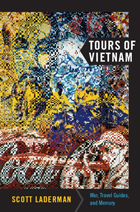 Tours of Vietnam: War, Travel Guides, and Memory
Scott Laderman
Duke University Press, 2009 In Tours of Vietnam, Scott Laderman demonstrates how tourist literature has shaped Americans’ understanding of Vietnam and projections of United States power since the mid-twentieth century. Laderman analyzes portrayals of Vietnam’s land, history, culture, economy, and people in travel narratives, U.S. military guides, and tourist guidebooks, pamphlets, and brochures. Whether implying that Vietnamese women were in need of saving by “manly” American military power or celebrating the neoliberal reforms Vietnam implemented in the 1980s, ostensibly neutral guides have repeatedly represented events, particularly those related to the Vietnam War, in ways that favor the global ambitions of the United States. Tracing a history of ideological assertions embedded in travel discourse, Laderman analyzes the use of tourism in the Republic of Vietnam as a form of Cold War cultural diplomacy by a fledgling state that, according to one pamphlet published by the Vietnamese tourism authorities, was joining the “family of free nations.” He chronicles the evolution of the Defense Department pocket guides to Vietnam, the first of which, published in 1963, promoted military service in Southeast Asia by touting the exciting opportunities offered by Vietnam to sightsee, swim, hunt, and water-ski. Laderman points out that, despite historians’ ongoing and well-documented uncertainty about the facts of the 1968 “Hue Massacre” during the National Liberation Front’s occupation of the former imperial capital, the incident often appears in English-language guidebooks as a settled narrative of revolutionary Vietnamese atrocity. And turning to the War Remnants Museum in Ho Chi Minh City, he notes that, while most contemporary accounts concede that the United States perpetrated gruesome acts of violence in Vietnam, many tourists and travel writers still dismiss the museum’s display of that record as little more than “propaganda.”
 Toussaint Louverture: A Black Jacobin in the Age of Revolutions
Charles Forsdick and Christian Høgsbjerg
Pluto Press, 2017 “In overthrowing me, you have done no more than cut down the trunk of the tree of the black liberty in St. Domingue—it will spring back from the roots, for they are numerous and deep.”
These are Toussaint Louverture’s last words before being taken to prison in France. Heroic leader of the only successful slave revolt in history, Louverture is one of the greatest anti-imperialist fighters who ever lived. Born into slavery on a Caribbean plantation, he was able to break from his bondage to lead an army of freed African slaves to victory against the professional armies of France, Spain, and Britain in the Haitian Revolution of 1791-1804.
In this lively narrative biography, Louverture’s fascinating life is explored through the prism of his radical politics. Charles Forsdick and Christian Høgsbjerg champion the “black Robespierre,” whose revolutionary legacy has inspired people and movements in the two centuries since his death. For anyone interested in the roots of modern resistance movements and black political radicalism, Louverture’s extraordinary life provides the perfect groundwork.
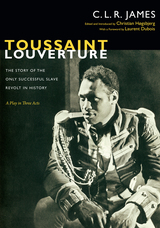 Toussaint Louverture: The Story of the Only Successful Slave Revolt in History; A Play in Three Acts
C. L. R. James Edited and Introduced by Christian Høgsbjerg
Duke University Press, 2013 In 1934 C. L. R. James, the widely known Trinidadian intellectual, writer, and political activist, wrote the play Toussaint Louverture: The Story of the Only Successful Slave Revolt in History, which was presumed lost until the rediscovery of a draft copy in 2005. The play's production, performed in 1936 at London's Westminster Theatre with a cast including the American star Paul Robeson, marked the first time black professional actors starred on the British stage in a play written by a black playwright. This edition includes the program, photographs, and reviews from that production, a contextual introduction and editorial notes on the play by Christian Høgsbjerg, and selected essays and letters by James and others. In Toussaint Louverture, James demonstrates the full tragedy and heroism of Louverture by showing how the Haitian revolutionary leader is caught in a dramatic conflict arising from the contradiction between the barbaric realities of New World slavery and the modern ideals of the Enlightenment. In his portrayal of the Haitian Revolution, James aspired to vindicate black accomplishments in the face of racism and to support the struggle for self-government in his native Caribbean. Toussaint Louverture is an indispensable companion work to The Black Jacobins (1938), James's classic account of Haiti's revolutionary struggle for liberation.
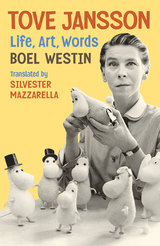 Tove Jansson: Life, Art, Words
Boel Westin
University of Minnesota Press, 2024 An in-depth, perceptive account of the unconventional life of the Moomins’ beloved creator, now available in the United States Tove Jansson achieved fame as the creator of the Moomins, beloved by generations of readers around the world. Remarkably, the Moomins were only part of the prodigious creative output of this Finnish-Swedish writer and artist. Jansson’s work also includes short stories and five novels for adults, as well as paintings, murals, and book illustrations. In this acclaimed biography, Boel Westin relies on numerous conversations with Jansson and unprecedented access to her journals, letters, and personal archives to present an engrossing and comprehensive review of the life and world of Scandinavia’s best-loved author. As Westin’s meticulous research makes clear, Jansson’s artistic and literary works reflected what was most important to her: the love of family and nature and the desire to pursue her art. Guided by her personal motto, “Love and work,” Jansson seized both with uncompromising joy. And while her romantic relationships with men proved unfulfilling, she found those with women—especially with her longtime partner, the artist Tuulikki Pietilä—both grounding and inspiring. Westin weaves together the many threads of Jansson’s rich, complex life: an education interrupted to help her family; the bleak war years and her emergence as a painter; the decades of Moominmania across books, newspaper comic strips, merchandise, and adaptations; her later fictions, including her popular The Summer Book; and her time with Pietilä on the solitary island of Klovharu. Tove Jansson: Life, Art, Words offers fans and admirers around the world the most complete portrait of the writer Philip Pullman described as “a genius, a woman of profound wisdom and great artistry.”
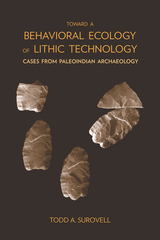 Toward a Behavioral Ecology of Lithic Technology: Cases from Paleoindian Archaeology
Todd A. Surovell
University of Arizona Press, 2009 Modern humans and their hominid ancestors relied on chipped-stone technology for well over two million years and colonized more than 99 percent of the Earth's habitable landmass in doing so. Yet there currently exist only a handful of informal models derived from ethnographic observation, experiments, engineering, and "common sense" to explain variability in archaeological lithic assemblages.
Because the fundamental processes of making, using, and discarding stone tools are, at root, exercises in problem solving, Todd Surovell asks what conditions favor certain technological solutions. Whether asking if a biface should be made thick or thin or if a flake should be saved or discarded, Surovell seeks answers that extend beyond a case-by-case analysis. One avenue for addressing these questions theoretically is formal mathematical modeling.
Here Surovell constructs a series of models designed to link environmental variability to human decision making as it pertains to lithic technology. To test the models, Surovell uses data from the analysis of more than 40,000 artifacts from five Rocky Mountain and Northern Plains Folsom and Goshen complex archaeological sites dating to the Younger Dryas stadial (ca. 12,600-11,500 years BP). The primary result is the production of powerful new analytical tools useful to the interpretation of archaeological assemblages.
Surovell's goal is to promote modeling and explore the general issues governing technological decisions. In this light, his models can be applied to any context in which stone tools are made and used.
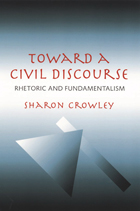 Toward a Civil Discourse: Rhetoric and Fundamentalism
Sharon Crowley
University of Pittsburgh Press, 2006
Toward a Civil Discourse examines how, in the current political climate, Americans find it difficult to discuss civic issues frankly and openly with one another. Because America is dominated by two powerful discourses--liberalism and Christian fundamentalism, each of which paints a very different picture of America and its citizens' responsibilities toward their country-there is little common ground, and hence Americans avoid disagreement for fear of giving offence.
Sharon Crowley considers the ancient art of rhetoric as a solution to the problems of repetition and condemnation that pervade American public discourse. Crowley recalls the historic rhetorical concept of stasis--where advocates in a debate agree upon the point on which they disagree, thereby recognizing their opponent as a person with a viable position or belief. Most contemporary arguments do not reach stasis, and without it, Crowley states, a nonviolent resolution cannot occur.
Toward a Civil Discourse investigates the cultural factors that lead to the formation of beliefs, and how beliefs can develop into densely articulated systems and political activism. Crowley asserts that rhetorical invention (which includes appeals to values and the passions) is superior in some cases to liberal argument (which often limits its appeals to empirical fact and reasoning) in mediating disagreements where participants are primarily motivated by a moral or passionate commitment to beliefs.
Sharon Crowley examines numerous current issues and opposing views, and discusses the consequences to society when, more often than not, argumentative exchange does not occur. She underscores the urgency of developing a civil discourse, and through a review of historic rhetoric and its modern application, provides a foundation for such a discourse-whose ultimate goal, in the tradition of the ancients, is democratic discussion of civic issues.
 Toward a Cognitive Theory of Narrative Acts
Edited by Frederick Luis Aldama
University of Texas Press, 2010 Toward a Cognitive Theory of Narrative Acts brings together in one volume cutting-edge research that turns to recent findings in cognitive and neurobiological sciences, psychology, linguistics, philosophy, and evolutionary biology, among other disciplines, to explore and understand more deeply various cultural phenomena, including art, music, literature, and film. The essays fulfilling this task for the general reader as well as the specialist are written by renowned authors H. Porter Abbott, Patrick Colm Hogan, Suzanne Keen, Herbert Lindenberger, Lisa Zunshine, Katja Mellman, Lalita Pandit Hogan, Klarina Priborkin, Javier Gutiérrez-Rexach, Ellen Spolsky, and Richard Walsh. Among the works analyzed are plays by Samuel Beckett, novels by Maxine Hong Kingston, music compositions by Igor Stravinsky, art by Jean-Baptiste-Simeon Chardin, and films by Michael Haneke. Each of the essays shows in a systematic, clear, and precise way how music, art, literature, and film work in and of themselves and also how they are interconnected. Finally, while each of the essays is unique in style and methodological approach, together they show the way toward a unified knowledge of artistic creativity.
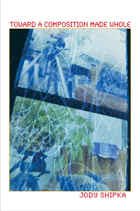 Toward a Composition Made Whole
Jody Shipka
University of Pittsburgh Press, 2011
To many academics, composition still represents typewritten texts on 8.5” x 11” pages that follow rote argumentative guidelines. In Toward a Composition Made Whole, Jody Shipka views composition as an act of communication that can be expressed through any number of media and as a path to meaning-making. Her study offers an in-depth examination of multimodality via the processes, values, structures, and semiotic practices people employ everyday to compose and communicate their thoughts.
Shipka counters current associations that equate multimodality only with computer, digitized, or screen-mediated texts, which are often self-limiting. She stretches the boundaries of composition to include a hybridization of aural, visual, and written forms. Shipka analyzes the work of current scholars in multimodality and combines this with recent writing theory to create her own teaching framework. Among her methods, Shipka employs process-oriented reflection and a statement of goals and choices to prepare students to compose using various media in ways that spur their rhetorical and material awareness. They are encouraged to produce unusual text forms while also learning to understand the composition process as a whole. Shipka presents several case studies of students working in multimodal composition and explains the strategies, tools, and spaces they employ. She then offers methods to critically assess multimodal writing projects.
Toward a Composition Made Whole challenges theorists and compositionists to further investigate communication practices and broaden the scope of writing to include all composing methods. While Shipka views writing as crucial to discourse, she challenges us to always consider the various purposes that writing serves.
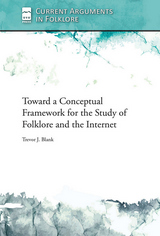 Toward a Conceptual Framework for the Study of Folklore and the Internet
Trevor J. Blank
Utah State University Press, 2009 Trevor Blank broke new ground for the field of folklore studies in this essay by rationalizing the study of the internet as an important area of expressive vernacular culture. Pushing back against traditionalists who dismissed the digital as simply the domain of technicians and mass media, Blank argues that "from the earliest moments of the modern Internet’s existence, folklore was a central component of the domain, moderating the intersection of computer professionals with hackers, newfangled lingo, and the dispersal of stories, pranks, and legends." With this essay and the volume it introduces, Blank theorizes the internet as an important analytic venue for folklorists, and sets the agenda for digital folklore research.
Utah State University Press’s Current Arguments in Folklore is a series of thought-provoking, short-form, digital publications made up of provocative original material and selections from foundational titles by leading thinkers in the field. Perfect for the folklore classroom as well as the professional collection, this series provides access to important introductory content as well as innovative new work intended to stimulate scholarly conversation.
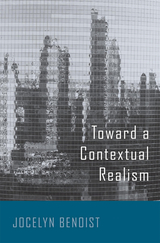 Toward a Contextual Realism
Jocelyn Benoist
Harvard University Press, 2021 An award-winning philosopher bridges the continental-analytic divide with an important contribution to the debate on the meaning of realism.
Jocelyn Benoist argues for a philosophical point of view that prioritizes the concept of reality. The human mind’s attitudes toward reality, he posits, both depend on reality and must navigate within it.
Refusing the path of metaphysical realism, which would make reality an object of speculation in itself, independent of any reflection on our ways of approaching it or thinking about it, Benoist defends the idea of an intentionality placed in reality—contextualized. Intentionality is an essential part of any realist philosophical position; Benoist’s innovation is to insist on looking to context to develop a renewed realism that draws conclusions from contemporary philosophy of language and applies them methodically to issues in the fields of metaphysics and the philosophy of the mind. “What there is”—the traditional subject of metaphysics—can be determined only in context.
Benoist offers a sharp criticism of acontextual ontology and acontextual approaches to the mind and reality. At the same time, he opposes postmodern anti-realism and the semantic approach characteristic of classic analytic philosophy. Instead, Toward a Contextual Realism bridges the analytic-continental divide while providing the foundation for a radically contextualist philosophy of mind and metaphysics. “To be” is to be in a context.
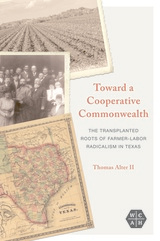 Toward a Cooperative Commonwealth: The Transplanted Roots of Farmer-Labor Radicalism in Texas
Thomas Alter II
University of Illinois Press, 2022 Agrarian radicalism's challenge to capitalism played a central role in working-class ideology while making third parties and protest movements a potent force in politics. Thomas Alter II follows three generations of German immigrants in Texas to examine the evolution of agrarian radicalism and the American and transnational ideas that influenced it. Otto Meitzen left Prussia for Texas in the wake of the failed 1848 Revolution. His son and grandson took part in decades-long activism with organizations from the Greenback Labor Party and the Grange to the Populist movement and Texas Socialist Party. As Alter tells their stories, he analyzes the southern wing of the era's farmer-labor bloc and the parallel history of African American political struggle in Texas. Alliances with Mexican revolutionaries, Irish militants, and others shaped an international legacy of working-class radicalism that moved U.S. politics to the left. That legacy, in turn, pushed forward economic reform during the Progressive and New Deal eras. A rare look at the German roots of radicalism in Texas, Toward a Cooperative Commonwealth illuminates the labor movements and populist ideas that changed the nation’s course at a pivotal time in its history.
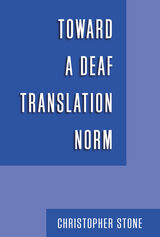 Toward a Deaf Translation Norm
Christopher A. Stone
Gallaudet University Press, 2009 As access to deaf people grows around the world, a new profession has begun to emerge as well, that of Deaf translators and interpreters (T/Is). In his new study Toward a Deaf Translation Norm, Christopher Stone explores this innovation, including its antecedents and how it is manifested in public places. Most importantly, Stone investigates whether or not a translation norm has evolved for Deaf T/Is as increasing numbers of them work in the mainstream translating for websites, public services, government literature, and television media.
For his study, the sixth volume in the Studies in Interpretation series, Stone concentrated his research in the United Kingdom. Specifically, he examined the rendering of English broadcast television news into British Sign Language (BSL) by both Deaf and hearing T/Is. Segments of the data feature simultaneous Deaf and hearing in-vision T/I broadcasts. Recording these broadcasts produced a controlled product that enabled direct comparison of the Deaf and hearing T/Is. Close analysis of these examples revealed to Stone that Deaf T/s not only employ a Deaf translation norm, they take labors to shape their BSL text into a stand-alone product rather than a translation. Ultimately, Toward a Deaf Translation Norm opens up engrossing new vistas on current deliberation about neutrality in translation and interpretation.
 Toward a Democratic New Order
David Bryn-Jones
University of Minnesota Press, 1945
Toward a Democratic New Order was first published in 1945. Minnesota Archive Editions uses digital technology to make long-unavailable books once again accessible, and are published unaltered from the original University of Minnesota Press editions.
We have succeeded, at a tremendous cost in human suffering, in preventing the imposition of a totalitarian new order upon the world. But our victory will be hollow and temporary unless democracy, in whose name we have fought, can gird itself to meet the challenges of a rapidly changing world. It cannot remain a static faith, whose triumph in its nineteenth-century form is taken for granted. It must be re-examined and redefined, not in terms of shibboleths and tenets a century old, but in the light of today's conditions and problems. That this redefinition is an urgent need of our time is the underlying conviction of Toward a Democratic New Order.
Men have not made the utmost sacrifice for a return to the world as it was before 1939. That world crashed because of its inherent weaknesses. Restored with inadequate modifications, it may well crash again. Can a stronger, more stable order be established within the democratic framework? Is democracy the best form of government? Can the normal processes of democratic government effect the far-reaching changes now necessary? Can the industrial problems of our age be solved on democratic lines? Can labor and management free themselves from the prejudices of an era that is now dead? Are we justified in believing the democratic order capable of securing and maintaining the welfare of the individual and society as a whole? Can democracy resolve the conflict between nationalistic claims on the one hand and conditions essential for economic stability and efficiency on the other?
These are some of the questions considered in this philosophical approach to world problems by David Bryn-Jones. His provocative analysis and interpretations make Toward a Democratic New Order truly significant reading for our postwar world.
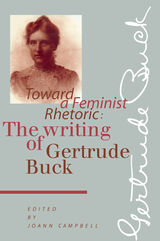 Toward a Feminist Rhetoric: The Writing of Gertrude Buck
Joann Campbell
University of Pittsburgh Press, 1996
The nature of Gertrude Buck, professor of English at Vassar College from 1897 until her death in 1922, is well-known to anyone interested in the history of composition. Her writing is less well-known, much of it now out of print. JoAnn Campbell gathers together for the first time the major work of this innovative thinker and educator, including her most important articles on rhetorical theory; The Social Criticism of Literature, a forerunner of reader-response literary theory; selections from her textbooks on argumentative and expository writing; poetry; fiction; her play Mother-Love, and unpublished reports and correspondence from the English department at Vassar.
In her introduction, Campbell describes the masculine rhetorical tradition within which Buck wrote and taught. Her theories of language and composition quietly challenged the dominant rhetorics issuing from Harvard and Amherst. An unusually productive scholar, Buck wrote textbooks for her female students that affirmed women’s intellectual abilities and trained them to participate in political debate. In the Vassar English Department she found a community of women among whom she could practice and develop her theories regarding rhetoric, pedagogy, and the role of the individual in society.
 Toward a Feminist Theater: Selected Plays
Kate Hamill and Kristin Leahey
Northwestern University Press, 2025 The first-ever anthology from celebrated playwright Kate Hamill
Bringing together seven critically acclaimed feminist adaptations of literary classics and one delightfully original new work, this collection demonstrates why Kate Hamill is one of the most electrifying and widely produced playwrights working today. Whether probing the power of toxic leaders (The Piper), revitalizing Jane Austen for the stage (Sense and Sensibility, Pride and Prejudice, Emma), “cheerfully desecrating” Arthur Conan Doyle through a post-pandemic lens (Ms. Holmes & Ms. Watson—Apt. 2B), reexamining an American classic’s gender roles (Little Women), or dramatizing the nineteenth-century classic of puritanical New England through the lens of an ostracized mother and daughter (The Scarlet Letter), Hamill’s work has transformed the theatrical landscape over the past decade.
An introduction from editor Kristin Leahey and an interview with Hamill frame this landmark anthology, with reflections on the current state of American drama, Hamill’s unique dramaturgical practice, and how the art form may move further and faster toward a feminist theater.
Toward a Feminist Theory of the State
Catharine A. MacKinnon
Harvard University Press, 1989 Toward a Feminist Theory of the State presents Catharine MacKinnon’s powerful analysis of politics, sexuality, and the law from the perspective of women. Using the debate over Marxism and feminism as a point of departure, MacKinnon develops a theory of gender centered on sexual subordination and applies it to the state. The result is an informed and compelling critique of inequality and a transformative vision of a direction for social change.
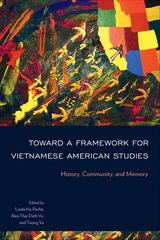 Toward a Framework for Vietnamese American Studies: History, Community, and Memory
Edited by Linda Ho Peché, Alex-Thai Dinh Vo, and Tuong Vu
Temple University Press, 2023 The large number of Vietnamese refugees that resettled in the United States since the fall of Saigon have become America’s fastest growing immigrant group. Toward a Framework for Vietnamese American Studies traces the ideologies, networks, and cultural sensibilities that have long influenced and continue to transform social, political, and economic developments in Vietnam and the U.S. Moving beyond existing approaches, the editors and contributors to this volume—the first to craft a working framework for researching, teaching, and learning about this dynamic community—present a new Vietnamese American historiography that began in South Vietnam. They provide deep-dive explorations into community development, political activism, civic participation and engagement, as well as entrepreneurial endeavors. Chapters offer new concepts and epistemological approaches to how legacy and memory is nurtured, produced and circulated in the Vietnamese diaspora. Toward a Framework for Vietnamese American Studies seeks to better understand the rapidly changing landscape of Vietnamese American diaspora.
Contributors: Duyen Bui, Christian Collet, Wynn Gadkar-Wilcox, Elwing Suong Gonzalez, Tuan Hoang, Jennifer A. Huynh, Y Thien Nguyen, Nguyen Vu Hoang, Van Nguyen-Marshall, Thien-Huong Ninh, Hai-Dang Phan, Ivan V. Small, Quan Tue Tran, Thuy Vo Dang, and the editors
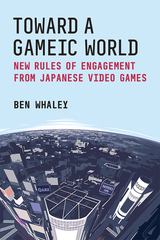 Toward a Gameic World: New Rules of Engagement from Japanese Video Games
Ben Whaley
University of Michigan Press, 2023 Toward a Gameic World bridges the gap between Japanese popular culture studies and game studies by encouraging a dialogue centered around Japanese-designed video games and social issues. It examines four contemporary Japanese video games in terms of how they engage with some of Japan’s biggest social and personal issues, including traumas: natural disasters (Disaster Report), a declining birthrate and aging population (Catherine), nuclear proliferation (Metal Gear Solid V); and youth social withdrawal (The World Ends with You). This book asks what some of the positive benefits are of working through a site of trauma from within a video game, and how games might teach us about Japanese culture and society through new kinds of interactive narratives, different from literature and film. The book proposes four new strategies of engagement with video games to explore the productive tensions that emerge at the boundaries of virtual reality, augmented reality, and gamification in contemporary Japan.
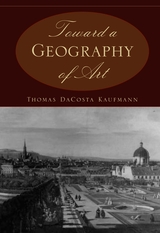 Toward a Geography of Art
Thomas DaCosta Kaufmann
University of Chicago Press, 2004 Art history traditionally classifies works of art by country as well as period, but often political borders and cultural boundaries are highly complex and fluid. Questions of identity, policy, and exchange make it difficult to determine the "place" of art, and often the art itself results from these conflicts of geography and culture. Addressing an important approach to art history, Thomas DaCosta Kaufmann's book offers essays that focus on the intricacies of accounting for the geographical dimension of art history during the early modern period in Europe, Latin America, and Asia.
Toward a Geography of Art presents a historical overview of these complexities, debates contemporary concerns, and completes its exploration with a diverse collection of case studies. Employing the author's expertise in a variety of fields, the book delves into critical issues such as transculturation of indigenous traditions, mestizaje, the artistic metropolis, artistic diffusion, transfer, circulation, subversion, and center and periphery. What results is a foundational study that establishes the geography of art as a subject and forces us to reconsider assumptions about the place of art that underlie the longstanding narratives of art history.
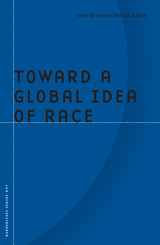 Toward a Global Idea of Race
Denise Ferreira da Silva
University of Minnesota Press, 2007 In this far-ranging and penetrating work, Denise Ferreira da Silva asks why, after more than five hundred years of violence perpetrated by Europeans against people of color, is there no ethical outrage? Rejecting the prevailing view that social categories of difference such as race and culture operate solely as principles of exclusion, Silva presents a critique of modern thought that shows how racial knowledge and power produce global space. Looking at the United States and Brazil, she argues that modern subjects are formed in philosophical accounts that presume two ontological moments—historicity and globality—which are refigured in the concepts of the nation and the racial, respectively. By displacing historicity’s ontological prerogative, Silva proposes that the notion of racial difference governs the present global power configuration because it institutes moral regions not covered by the leading post-Enlightenment ethical ideals—namely, universality and self-determination. By introducing a view of the racial as the signifier of globality,Toward a Global Idea of Race provides a new basis for the investigation of past and present modern social processes and contexts of subjection. Denise Ferreira da Silva is associate professor of ethnic studies at University of California, San Diego.
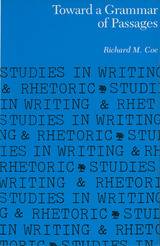 Toward a Grammar of Passages
Richard M. Coe
Southern Illinois University Press, 1988 Richard M. Coe has developed such a “grammar,” one which uses a simple graphic instrument to analyze the meaningful relationships between sentences in a passage and to clarify the function of structure in discourse. Working in the tradition of Christensen’s generative rhetoric, Coe presents a two-dimensional graphic matrix that effectively analyzes the logical relations between statements by mapping coordinate, subordinate, and superordinate relationships. Coe demonstrates the power of his discourse matrix by applying it to a variety of significant problems, such as how to demonstrate discourse differences between cultures (especially between Chinese and English), how to explain precisely what is “bad” about the structure of passages that do not work, and how best to teach structure. This new view of the structure of passages helps to articulate crucial questions about the relations between form and function, language, thought and culture, cognitive and social processes.
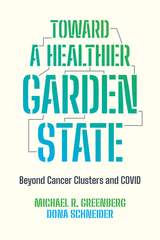 Toward a Healthier Garden State: Beyond Cancer Clusters and COVID
Michael R. Greenberg
Rutgers University Press, 2023 While New Jersey now frequently appears near the top in listings of America’s healthiest states, this has not always been the case. The fluctuations in the state’s overall levels of health have less to do with the lifestyle choices of individual residents and more to do with broader structural issues, ranging from pollution to urban design to the consolidation of the health care industry.
This book uses the past fifty years of New Jersey history as a case study to illustrate just how much public policy decisions and other upstream factors can affect the health of a state’s citizens. It reveals how economic and racial disparities in health care were exacerbated by bad policies regarding everything from zoning to education to environmental regulation. The study further chronicles how New Jersey struggled to deal with public health crises like the AIDS epidemic and the crack epidemic. Yet it also explores how the state has developed some of the nation’s most innovative responses to public health challenges, and then provides policy suggestions for how we might build an even healthier New Jersey.
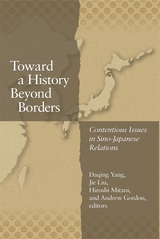 Toward a History Beyond Borders: Contentious Issues in Sino–Japanese Relations
Daqing Yang
Harvard University Press, 2011 This volume brings to English-language readers the results of an important long-term project of historians from China and Japan addressing contentious issues in their shared modern histories. Originally published simultaneously in Chinese and Japanese in 2006, the thirteen essays in this collection focus renewed attention on a set of political and historiographical controversies that have steered and stymied Sino-Japanese relations from the mid-nineteenth century through World War II to the present.
These in-depth contributions explore a range of themes, from prewar diplomatic relations and conflicts, to wartime collaboration and atrocity, to postwar commemorations and textbook debates—all while grappling with the core issue of how history has been researched, written, taught, and understood in both countries. In the context of a wider trend toward cross-national dialogues over historical issues, this volume can be read as both a progress report and a case study of the effort to overcome contentious problems of history in East Asia.
Toward a History of Applied Economics: 2000 Supplement, Volume 32
Jeff E. Biddle and Roger Backhouse, editors
Duke University Press Histories of economic thought have generally focused on the development of economic theory, notably value and distribution. The activity of applying economic theory to the understanding of particular situations and the solution of specific problems, though a part of the work of economists for several generations, has received relatively little attention from historians of economics. Toward a History of Applied Economics explores such themes as changes in the historical conception of applied economics and its relationship to the “core” of economic theory, the emergence and decline of applied fields, and issues of applying general theoretical tools and concepts to real-world problems. This is the 2000 supplement to the journal History of Political Economy. All 2000 subscribers will receive a copy of this book as part of their annual subscription.
 Toward a History of Game Theory, Volume 24
E. Roy Weintraub, ed.
Duke University Press During the 1940s "game theory" emerged from the fields of mathematics and economics to provide a revolutionary new method of analysis. Today game theory provides a language for discussing conflict and cooperation not only for economists, but also for business analysts, sociologists, war planners, international relations theorists, and evolutionary biologists. Toward a History of Game Theory offers the first history of the development, reception, and dissemination of this crucial theory. Drawing on interviews with original members of the game theory community and on the Morgenstern diaries, the first section of the book examines early work in game theory. It focuses on the groundbreaking role of the von Neumann-Morgenstern collaborative work, The Theory of Games and Economic Behavior (1944). The second section recounts the reception of this new theory, revealing just how game theory made its way into the literatures of the time and thus became known among relevant communities of scholars. The contributors explore how game theory became a wedge in opening up the social sciences to mathematical tools and use the personal recollections of scholars who taught at Michigan and Princeton in the late 1940s to show why the theory captivated those practitioners now considered to be "giants" in the field. The final section traces the flow of the ideas of game theory into political science, operations research, and experimental economics. Contributors. Mary Ann Dimand, Robert W. Dimand, Robert J. Leonard, Philip Mirowski, Angela M. O'Rand, Howard Raiffa, Urs Rellstab, Robin E. Rider, William H. Riker, Andrew Schotter, Martin Shubik, Vernon L. Smith
Toward a History of Ukrainian Literature
George G. Grabowicz
Harvard University Press, 1981 Ukrainian literature, reflecting a turbulent and often discontinuous political and social history, presents special problems to the historian of literature. In this book George Grabowicz approaches these problems through a critique of the major non-Soviet position in the field, the History of Ukrainian Literature of the eminent Slavist Dmytro Čyževs'kyj.
Grabowicz examines critically the method and theory as well as the actual literaryhistorical argument of Čyževs'kyj's History and challenges some of its basic premises, particularly regarding the periodization of Ukrainian literature, the thesis of its "incompleteness," and the postulate of a purely stylistic history of literature. Ultimately, he proposes an alternative historiographic model, one which would be attuned above all to the specifics of the given culture.
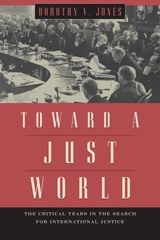 Toward a Just World: The Critical Years in the Search for International Justice
Dorothy V. Jones
University of Chicago Press, 2002 "Toward a Just World is an insightful and thoughtful history. The first half of the twentieth century and the heroic efforts of those who sought international justice during that time will be much better understood and appreciated thanks to this fascinating book."—Robert F. Drinan, Georgetown University
A century ago, there was no such thing as international justice, and until recently, the idea of permanent international courts and formal war crimes tribunals would have been almost unthinkable. Yet now we depend on institutions such as these to air and punish crimes against humanity, as we have seen in the International Criminal Tribunal for Rwanda and the appearance of Serbian leader Slobodan Milosevic before the Tribunal for the Former Yugoslavia.
Toward a Just World tells the remarkable story of the long struggle to craft the concept of international justice that we have today. Dorothy V. Jones focuses on the first half of the twentieth century, the pivotal years in which justice took on expanded meaning in conjunction with ideas like world peace, human rights, and international law. Fashioning both political and legal history into a compelling narrative, Jones recovers little-known events from undeserved obscurity and helps us see with new eyes the pivotal ones that we think we know. Jones also covers many of the milestones in the history of diplomacy, from the Treaty of Versailles and the creation of the League of Nations to the Nuremberg war crimes tribunal and the making of the United Nations.
As newspapers continue to fill their front pages with stories about how to administer justice to al Qaeda and Saddam Hussein, Toward a Just World will serve as a timely reminder of how the twentieth century achieved one of its most enduring triumphs: giving justice an international meaning.
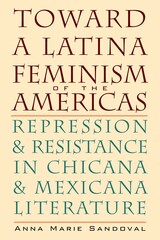 Toward a Latina Feminism of the Americas: Repression and Resistance in Chicana and Mexicana Literature
By Anna Marie Sandoval
University of Texas Press, 2008 Weaving strands of Chicana and Mexicana subjectivities, Toward a Latina Feminism of the Americas explores political and theoretical agendas, particularly those that undermine the patriarchy, across a diverse range of Latina authors. Within this range, calls for a coalition are clear, but questions surrounding the process of these revolutionary dialogues provide important lines of inquiry. Examining the works of authors such as Sandra Cisneros, Laura Esquivel, Carmen Boullosa, and Helena María Viramontes, Anna Sandoval considers resistance to traditional cultural symbols and contemporary efforts to counteract negative representations of womanhood in literature and society. Offering a new perspective on the oppositional nature of Latina writers, Sandoval emphasizes the ways in which national literatures have privileged male authors, whose viewpoint is generally distinct from that of women—a point of departure rarely acknowledged in postcolonial theory. Applying her observations to the disciplinary, historical, and spatial facets of literary production, Sandoval interrogates the boundaries of the Latina experience. Building on the dialogues begun with such works as Sonia Saldivar-Hull's Feminism on the Border and Ellen McCracken's New Latina Narrative, this is a concise yet ambitious comparative approach to the historical and cultural connections (as well as disparities) found in Chicana and Mexicana literature.
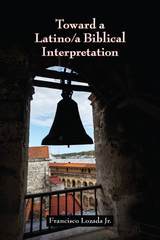 Toward a Latino/a Biblical Interpretation
Francisco Lozada Jr.
SBL Press, 2017 Engage an interdisciplinary approach
In Toward a Latino/a Biblical Interpretation Francisco Lozada Jr. explores the complex and diverse issues related to Latino/a biblical interpretation. After laying the theoretical foundation, he offers three sample readings of biblical texts to lead readers through the intricacy of interpretation that has historically and culturally surrounded understanding what it means to do Latino/a biblical interpretation. Throughout, Lozada attempts to work out various strategies that Latinos/as have employed to read biblical texts. He argues that Latino/a biblical interpretation is concerned with identity and belongingness with a goal of transforming/liberating the Latino/a community.
Features
- An introduction to what it means to do Latino/a biblical interpretation
- A demonstration of three different reading strategies (correlation, dialogical, and ideological) that Latinos/as employ in reading biblical texts
- An exploration of whether one has to be Latino/a to do Latino/a biblical interpretation
Toward a National Power Policy: The New Deal and the Electric Utility Industry, 1933–1941
Philip J. Funigiello
University of Pittsburgh Press, 1973
Toward a National Power Policy offers a comprehensive analysis of the conflict between Franklin D. Roosevelt's New Deal and the electric utility industry. Philip J. Funigiello outlines the origins and evolution of the privately owned industry, and the growth of an anti-monopoly movement in the 1920s. He details the four major areas of conflict between public and private interests: the Holding Company Act, the Rural Electrification Administration, the Bonneville Power Administration, and power planning for the second World War. Funigiello reveals the complexities of top-level policymaking and the networks of interpersonal relationships that led to both conflict and compromise, and concludes that the failure of the Roosevelt administration to develop a well-defined philosophy prevented the development of a national power policy.
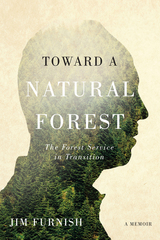 Toward a Natural Forest: The Forest Service in Transition (A Memoir)
Jim Furnish
Oregon State University Press, 2015 Jim Furnish joined the U.S. Forest Service in 1965, enthusiastic and naive, proud to be part of such a storied and accomplished agency. Nothing could have prepared him for the crisis that would soon rock the agency to its foundation, as a burgeoning environmental movement challenged the Forest Service’s legacy and legitimacy.
The Forest Service stumbled in responding to a wave of lawsuits from environmental groups in the late 20th Century—a phenomenon best symbolized by the spotted owl controversy that shut down logging on public forests in the Pacific Northwest in the 1990s. The agency was brought to its knees, pitted between a powerful timber industry that had been having its way with the national forests for decades, and organized environmentalists who believed public lands had been abused and deserved better stewardship.
Toward a Natural Forest offers an insider’s view of this tumultuous time in the history of the Forest Service, presenting twin tales of transformation, both within the agency and within the author’s evolving environmental consciousness. While stewarding our national forests with the best of intentions, had the Forest Service diminished their natural essence and ecological values? How could one man confront the crisis while remaining loyal to his employer?
In this revealing memoir, Furnish addresses the fundamental human drive to gain sustenance from and protect the Earth, believing that we need not destroy it in the process. Drawing on the author’s personal experience and his broad professional knowledge, Toward a Natural Forest illuminates the potential of the Forest Service to provide strong leadership in global conservation efforts. Those interested in our public lands—environmentalists, natural resource professionals, academics, and historians—will find Jim Furnish’s story deeply informed, thought-provoking, and ultimately inspiring.
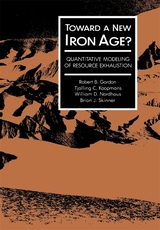 Toward a New Iron Age?: Quantitative Modeling of Resource Exhaustion
Robert B. Gordon, Tjalling C. Koopmans, William D. Nordhaus, and Brian J. Skinner
Harvard University Press, 1987 Experts agree that the earth will eventually run out of certain low-cost, nonrenewable resources, possibly as early as a century from now. Will the transition to reliance on other, more abundant resources be smooth or discontinuous? Might industrial societies experience a marked decline in living standards—a radically different kind of society from the one we now know? Geologists maintain that once inexpensive high-grade resources are exhausted, economic growth will slow. Economists are more optimistic: they believe that new technologies and materials will be substituted rapidly enough to prevent minor economic dislocations.
Toward a New Iron Age? takes an important step toward reconciling these divergent views. It is the most comprehensive study of the economic consequences of resource depletion—in particular, it is a thorough exploration of the prospects for one key metal, copper. The authors draw on geological and engineering data to calculate the resources now available and to assess the feasibility of substituting alternatives. Using linear programming and a range of hypothetical base conditions, they are able to estimate the course, through the next century and beyond, of several crucial factors: the rate at which copper resources will be used and when they will be depleted; how the price of the metal will fluctuate; when alternative materials will be substituted, in what patterns, and at what costs. By the late twenty-first century, the authors believe, low-cost copper will no longer be available. Industrial societies will have to operate on more abundant resources such as iron, silica, and aluminum. They will enter, in short, a New Iron Age.
Toward a New Philosophy of Biology: Observations of an Evolutionist
Ernst Mayr
Harvard University Press, 1988 A collection of twenty-eight essays, five previously unpublished, grouped into nine categories: Philosophy, Natural Selection, Adaptation, Darwin, Diversity, Species, Speciation, Macroevolution, and Historical Perspective. The book, Ernst Mayr notes in the Foreword, is an attempt “to strengthen the bridge between biology and philosophy, and point to the new direction in which a new philosophy of biology will move.”
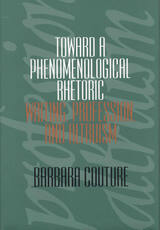 Toward a Phenomenological Rhetoric: Writing, Profession, and Altruism
Barbara Couture
Southern Illinois University Press, 1998
Current rhetorical and critical theory for the most part separates writing from consciousness and presumes relative truth to be the only possible expressive goal for rhetoric. These presumptions are reflected in our tradition of persuasive rhetoric, which values writing that successfully argues one person’s belief at the expense of another’s. Barbara Couture presents a case for a phenomenological rhetoric, one that values and respects consciousness and selfhood and that restores to rhetoric the possibility of seeking an all-embracing truth through pacific and cooperative interaction.
Couture discusses the premises on which current interpretive theory has supported relative truth as the philosophical grounding for rhetoric, premises, she argues, that have led to constraints on our notion of truth that divorce it from human experience. She then shows how phenomenological philosophy might guide the theory and practice of rhetoric, reanimating its role in the human enterprise of seeking a shared truth. She proposes profession and altruism as two guiding metaphors for the phenomenological activity of "truth-seeking through interaction."
Among the contemporary rhetoricians and philosophers who influence Couture are Pierre Teilhard de Chardin, Martin Buber, Charles Altieri, Charles Taylor, Alasdair Maclntyre, and Jürgen Habermas.
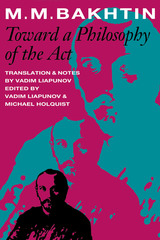 Toward a Philosophy of the Act
By M. M. Bakhtin
University of Texas Press, 1993 Rescued in 1972 from a storeroom in which rats and seeping water had severely damaged the fifty-year-old manuscript, this text is the earliest major work (1919-1921) of the great Russian philosopher M. M. Bakhtin. Toward a Philosophy of the Act contains the first occurrences of themes that occupied Bakhtin throughout his long career. The topics of authoring, responsibility, self and other, the moral significance of "outsideness," participatory thinking, the implications for the individual subject of having "no-alibi in existence," the difference between the world as experienced in actions and the world as represented in discourse—all are broached here in the heat of discovery. This is the "heart of the heart" of Bakhtin, the center of the dialogue between being and language, the world and mind, "the given" and "the created" that forms the core of Bakhtin's distinctive dialogism. A special feature of this work is Bakhtin's struggle with the philosophy of Immanuel Kant. Put very simply, this text is an attempt to go beyond Kant's formulation of the ethical imperative. mci will be important for scholars across the humanities as they grapple with the increasingly vexed relationship between aesthetics and ethics.
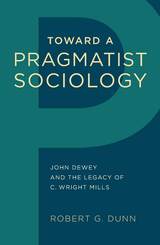 Toward a Pragmatist Sociology: John Dewey and the Legacy of C. Wright Mills
Robert G. Dunn
Temple University Press, 2018 In Toward a Pragmatist Sociology, Robert Dunn explores the relationship between the ideas of philosopher and educator John Dewey and those of sociologist C. Wright Mills in order to provide a philosophical and theoretical foundation for the development of a critical and public sociology. Dunn recovers an intellectual and conceptual framework for transforming sociology into a more substantive, comprehensive, and socially useful discipline. Toward a Pragmatist Sociology argues that Dewey and Mills shared a common vision of a relevant, critical, public sociology dedicated to the solution of societal problems. Dunn investigates the past and present state of the discipline, critiquing its dominant tendencies, and offering historical examples of alternatives to conventional sociological approaches. By stressing the similar intellectual and moral visions of both men, Toward a Pragmatist Sociology provides an original treatment of two important American thinkers whose work offers a conception and model of a sociology with a sense of moral and political purpose and public relevance. It should liberate future sociologists and others to regard the discipline as not only a science but an intellectual, moral, and political enterprise.
 Toward a Premodern Posthumanism: Anarchic Ontologies of Earthly Life in Early Modern France
Chad Córdova
Northwestern University Press, 2025 Drawing on early modern French thought to free nature and aesthetics from metaphysical humanism What good is aesthetics in a time of ecological crisis? Toward a Premodern Posthumanism: Anarchic Ontologies of Earthly Life in Early Modern France shows that philosophical aesthetics contains unheeded potentialities for challenging the ontological subjection of nature to the human subject. Drawing on deconstructive, ecological, and biopolitical thought, Chad Córdova uncovers in aesthetics something irreducible to humanist metaphysics: an account of how beings emerge and are interrelated, responsive, and even response-able without reason or why.
This anarchic and atelic ontology, recovered from Kant, becomes the guiding thread for a new, premodern trajectory of posthumanism. Charting a path from Aristotle to Heidegger to today’s plant-thinking, with new readings of Montaigne, Pascal, Diderot, Rousseau, and others along the way, this capacious study reveals the untimely relevance of pre-1800 practices of writing, science, and art. Enacting a multitemporal mode of reading, Córdova offers a defense and illustration of the importance of returning to early modern texts as a way to rethink nature, art, ethics, and politics in a time when these concepts are in flux and more contentious than ever.
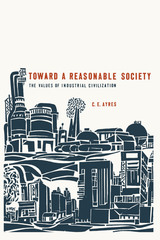 Toward a Reasonable Society
By C. E. Ayres
University of Texas Press, 1961 Those who despair of our age will find in this stimulating book heartening answers to their questions about the fate of Western civilization and indications of the course humanity should follow if it is to save itself and the world. The course is not new. According to Ayres, it is the same course that humanity has taken from the dawn of history, but with too many detours in pursuit of false values. It is the course that has brought us to the point of civilization where we now stand—the course of developing knowledge and expanding truth, of our increasing ability to exploit nature for our own welfare. From the earliest stick tool—through the invention of the wheel, the Industrial Revolution, and the marvelous scientific and technological developments of the space age—science and technology, knowledge and skill, have enabled humankind to create for itself an increasingly better life. But with this development has come a sense of conflict between our secular culture and our traditional values, a conflict requiring a reevaluation of values. This reevaluation is the subject of Ayres' book. His theme is that the abiding values are those relating to the common human experience shared by all peoples, those values deriving from the quest for knowledge, from the never-ending struggle to harness the forces of nature to human use. They are measured in terms of a standard of value that has the same meaning for all people. And they have their validity in the cause-and-effect relationship basic to all human reasoning and to the oneness and interrelatedness of all life. Toward a Reasonable Society is a defense of industrial culture. It is a creative work, drawing upon numerous areas of knowledge—ethics, sociology, economics, anthropology, history, philosophy, psychology, biology, music, the graphic arts, mathematics, the physical sciences—to show the uniformities and the unchangeables in the oneness of human life. It is an attack upon nostalgia and a defense of current arts, crafts, knowledge, wisdom, and individual character. It is an inspiring definition of freedom, equality, security, abundance, and other values of a democratic society. In being all these things it assumes a point of view that looks toward the future. And it is exciting reading. The author's closely reasoned discourse leads with inevitable progress from one chapter to the next, with something like the suspense of a detective story. Each chapter is an intellectual episode leaving the reader with an eagerness to see what the next development will be. The concreteness of the numerous examples enhances the clarity of the prose. The compelling note is optimism for the future in further development of the industrial society that has achieved the most successful way of life humankind has ever known.
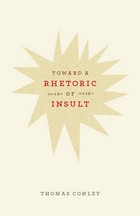 Toward a Rhetoric of Insult
Thomas Conley
University of Chicago Press, 2010 From high school cafeterias to the floor of Congress, insult is a truly universal and ubiquitous cultural practice with a long and earthy history. And yet, this most human of human behaviors has rarely been the subject of organized and comprehensive attention—until Toward a Rhetoric of Insult. Viewed through the lens of the study of rhetoric, insult, Thomas M. Conley argues, is revealed as at once antisocial and crucial for human relations, both divisive and unifying.
Explaining how this works and what exactly makes up a rhetoric of insult prompts Conley to range across the vast and splendidly colorful history of offense. Taking in Monty Python, Shakespeare, Eminem, Cicero, Henry Ford, and the Latin poet Martial, Conley breaks down various types of insults, examines the importance of audience, and explores the benign side of abuse. In doing so, Conley initiates readers into the world of insult appreciation, enabling us to regard insults not solely as means of expressing enmity or disdain, but as fascinating aspects of human interaction.
 Toward a Small Data Archaeology: Otomí, Aztec Imperial, and Spanish Colonial Xaltocan, Mexico
Lisa Overholtzer
University Press of Colorado, 2025 Toward a Small Data Archaeology presents an interpretive and methodological framework—a “small data” archaeology—elucidated through a case study at Xaltocan, Mexico. Aligned closely with Indigenous feminist principles by engaging directly with descendant communities that resist abstract, large-scale syntheses and instead emphasize deep, localized understanding of ancestral lives intertwined with their landscapes, this framework repositions archaeological inquiry by focusing on individual household contexts. Drawing on diverse lines of evidence from molecular archaeology and geochemistry to Bayesian statistics, Lisa Overholtzer uncovers the detailed social identities, economic practices, and ritual behaviors that defined everyday life in Xaltocan.
Xaltocan served as the Otomí city-state capital before being conquered by the Tepanecs, subsequently incorporated into the Aztec Empire, and finally integrated into the vast Spanish colonial sphere. In reconstructing long-term household histories that bridge the pre-Hispanic and early Colonial periods, this book resists narratives that define Indigenous peoples solely through the lens of conquest and subordination. Instead, it presents richly detailed reconstructions of familial relationships and social networks, achieved through the rigorous analysis of artifacts, ecofacts, human remains, and ancient DNA. This meticulous and community-collaborative approach not only maximizes insights available from a limited archaeological record but also honors the ethical imperative to work with descendant communities.
Toward a Small Data Archaeology offers an innovative reexamination of the past by privileging the intricate, household-level narratives of Indigenous communities over the homogenizing tendencies of broad-scale "big data" approaches. By peopling the past, Overholtzer redefines methodological boundaries within archaeology, produces reconstructions and narratives that are more in line with Indigenous philosophies, and offers a compelling vision for a future in which historical narratives are reconstructed through a lens that is both deeply scientific and inherently humane.
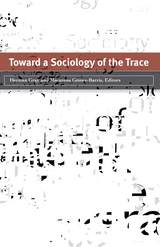 Toward a Sociology of the Trace
Herman Gray
University of Minnesota Press, 2010 Using culture as an entry point, and informed by the work of contemporary social theorists, the essays in this volume identify and challenge sites where the representational dimension of social life produces national identity through scripts of belonging, or traces.
The contributors utilize empirically based studies of social policy, political economy, and social institutions to offer a new way of looking at the creation of meaning, representation, and memory. They scrutinize subjects such as narratives in the U.S. coal industry's change from digging mines to removing mountaintops; war-related redress policies in post-World War II Japan; views of masculinity linked to tequila, Pancho Villa, and the Mexican Revolution; and the politics of subjectivity in 1970s political violence in Thailand.
Contributors: Sarah Banet-Weiser, U of Southern California; Barbara A. Barnes, U of California, Berkeley; Marie Sarita Gaytán; Avery F. Gordon, U of California, Santa Barbara; Tanya McNeill, U of California, Santa Cruz; Sudarat Musikawong, Willamette U; Akiko Naono, U of Kyushu; Rebecca R. Scott, U of Missouri.
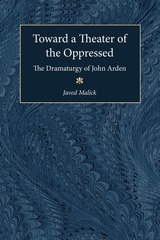 Toward a Theater of the Oppressed: The Dramaturgy of John Arden
Javed Malick
University of Michigan Press, 1995 Toward a Theater of the Oppressed is an engaging study of the dramaturgy of contemporary British playwright John Arden and the political implications of his work. Arden made his debut on the London stage in the wake of a powerful new wave of young, "angry" drama in England during the late 1950s. Javed Malick argues that in contrast to contemporaries like John Osborne, Harold Pinter, and Arnold Wesker, Arden offered a radically different approach to drama and theater, employing a long-neglected writing style that derived from pre-bourgeois popular traditions.
Malick situates Arden's dramaturgy in the wider context of the radical alternative tradition in Western drama, drawing connections to Brecht, Piscator, the radical playwrights of the 1960s. He then explores the formal structure, ideological implications, and historical significance of Arden's work, treating his stage plays as one dramaturgically coherent opus- from the early Waters of Babylon to his and Margaretta D'Arcy's ambitious trilogy, The Island of the Mighty. Finally, he discusses the last phase of Arden and D'Arcy's political and artistic development, which led them to turn their backs on the professional theater circuit. He argues that Arden's rejection of the institutional stage was the logical outcome of his persistent search for alternative forms of political theater.
Toward a Theater of the Oppressed will be invaluable reading for those interested in modern drama, political theater, and popular performance, as well as students of contemporary British drama.
Javed Malick is Reader in English, Khalsa College, University of Delhi, India.
Toward a Theology of the Septuagint: Stellenbosch Congress on the Septuagint, 2018
Johann Cook
SBL Press, 2020 Innovative Septuagint research from an international group of scholars
Toward a Theology of the Septuagint: Stellenbosch Congress on the Septuagint, 2018 focuses on the question of whether it is appropriate and possible to formulate a theology of the Septuagint. Nineteen English and German essays examine Old Testament, New Testament, and extrabiblical texts from a variety of methodological perspectives to demonstrate that such a theology is indeed necessary and possible.
Features
Nuanced discussion of whether and how a theology of the Septuagint can be written
Extensive methodological discussions
Close textual studies of biblical, Greek philosophical, and Jewish sources
Abstracts of each essay
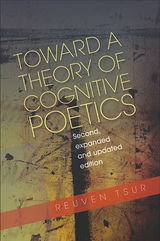 Toward a Theory of Cognitive Poetics: Second, Expanded and Updated Edition
Reuven Tsur
Sussex Academic Press, 2022 This book has three distinctive characteristics: (1) It offers a widely interdisciplinary perspective. (2) It provides a comprehensive view of poetry, with groups of chapters on the Sound Stratum of Poetry (rhyme patterns and gestalt theory, metre and rhythm, expressiveness and musicality of speech sounds); the Units-of-Meaning Stratum (semantic representation and information processing, metaphor, rhyme and meaning, literary synaesthesia); the World Stratum; Regulative Concepts (genre, period style, archetypal patterns); the Poetry of Orientation the Poetry of Altered States of Consciousness (hypnotic and ecstatic poetry); Critics and Criticism; and Cognitive Poetics vs. Cognitive Linguistics. (3) It goes into minute details of poetic texts, so as to account for subtle intuitions of readers. This updated, expanded second edition also includes samples from the author's later instrumental study of the rhythmical performance of poetry and the expressiveness of speech sounds, and includes three chapters responding to the later work of three cognitive linguists. The author, Reuven Tsur, is the 2009 recipient of the Israel Prize in the category of General Literature for his work in literary theory.
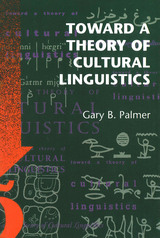 Toward a Theory of Cultural Linguistics
By Gary B. Palmer
University of Texas Press, 1996 Imagery, broadly defined as all that people may construe in cognitive models pertaining to vision, hearing, touch, taste, smell, and feeling states, precedes and shapes human language. In this pathfinding book, Gary B. Palmer restores imagery to a central place in studies of language and culture by bringing together the insights of cognitive linguistics and anthropology to form a new theory of cultural linguistics. Palmer begins by showing how cognitive grammar complements the traditional anthropological approaches of Boasian linguistics, ethnosemantics, and the ethnography of speaking. He then applies his cultural theory to a wealth of case studies, including Bedouin lamentations, spatial organization in Coeur d'Alene place names and anatomical terms, Kuna narrative sequence, honorifics in Japanese sales language, the domain of ancestral spirits in Proto-Bantu noun-classifiers, Chinese counterfactuals, the non-arbitrariness of Spanish verb forms, and perspective schemas in English discourse. This pioneering approach suggests innovative solutions to old problems in anthropology and new directions for research. It will be important reading for everyone interested in anthropology, linguistics, cognitive science, and philosophy.
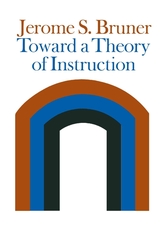 Toward a Theory of Instruction
Jerome Bruner
Harvard University Press, 1966 This country’s most challenging writer on education presents here a distillation, for the general reader, of half a decade’s research and reflection. His theme is dual: how children learn, and how they can best be helped to learn—how they can be brought to the fullest realization of their capacities.
Jerome Bruner, Harper’s reports, has “stirred up more excitement than any educator since John Dewey.” His explorations into the nature of intellectual growth and its relation to theories of learning and methods of teaching have had a catalytic effect upon educational theory. In this new volume the subjects dealt with in The Process of Education are pursued further, probed more deeply, given concrete illustration and a broader context.
“One is struck by the absence of a theory of instruction as a guide to pedagogy,” Mr. Bruner observes; “in its place there is principally a body of maxims.” The eight essays in this volume, as varied in topic as they are unified in theme, are contributions toward the construction of such a theory. What is needed in that enterprise is, inter alia, “the daring and freshness of hypotheses that do not take for granted as true what has merely become habitual,” and these are amply evidenced here.
At the conceptual core of the book is an illuminating examination of how mental growth proceeds, and of the ways in which teaching can profitably adapt itself to that progression and can also help it along. Closely related to this is Mr. Bruner’s “evolutionary instrumentalism,” his conception of instruction as the means of transmitting the tools and skills of a culture, the acquired characteristics that express and amplify man’s powers—especially the crucial symbolic tools of language, number, and logic. Revealing insights are given into the manner in which language functions as an instrument of thought.
The theories presented are anchored in practice, in the empirical research from which they derive and in the practical applications to which they can be put. The latter are exemplified incidentally throughout and extensively in detailed descriptions of two courses Mr. Bruner has helped to construct and to teach—an experimental mathematics course and a multifaceted course in social studies. In both, the students’ encounters with the material to be mastered are structured and sequenced in such a way as to work with, and to reinforce, the developmental process.
Written with all the style and élan that readers have come to expect of Mr. Bruner, Toward a Theory of Instruction is charged with the provocative suggestions and inquiries of one of the great innovators in the field of education.
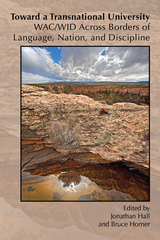 Toward a Transnational University: WAC/WID Across Borders of Language, Nation, and Discipline
Jonathan Hall
University Press of Colorado, 2023 We live in the age of trans-, an era of pervasive mobility across linguistic, national, disciplinary, and institutional borders of teachers, students, scholars, and institutional programs. The contributors to Toward a Transnational University examine how approaches to postsecondary writing instruction travel and, in the process, transform the transnational and translingual character of universities worldwide. The chapters in this edited collection investigate, in multiple contexts around the world, the challenges, opportunities, and ambiguities that arise when mobility is taken as their foundation. Writing from a wide range of locations—including Bangladesh, Canada, China, Japan, Nepal, Qatar, and the United States—the contributors to Toward a Transnational University examine the friction points by which particular approaches to academic writing and its teaching are translated and interact with local cultures and concerns. Together, they show how institutions of higher education are engaging the mobility and fluidity of academic writing, its teaching, and its learning.
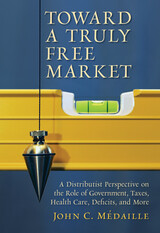 Toward a Truly Free Market: A Distributist Perspective on the Role of Government, Taxes, Health Care, Deficits, and More
John C. Medaille
Intercollegiate Studies Institute, 2010
Taking “free markets” from rhetoric to reality
For three decades free-market leaders have tried to reverse longstanding Keynesian economic policies, but have only produced larger government, greater debt, and more centralized economic power. So how can we achieve a truly free-market system, especially at this historical moment when capitalism seems to be in crisis?
The answer, says John C. Médaille, is to stop pretending that economics is something on the order of the physical sciences; it must be a humane science, taking into account crucial social contexts. Toward a Truly Free Marketargues that any attempt to divorce economic equilibrium from economic equity will lead to an unbalanced economy—one that falls either to ruin or to ruinous government attempts to redress the balance.
Médaille makes a refreshingly clear case for the economic theory—and practice—known as distributism. Unlike many of his fellow distributists, who argue primarily from moral terms, Médaille enters the economic debate on purely economic terms. Toward a Truly Free Marketshows exactly how to end the bailouts, reduce government budgets, reform the tax code, fix the health-care system, and much more.
 Toward Alternative Theology: Confessions Non Dualist Christian
Sara Grant
University of Notre Dame Press, 2002 Toward an Alternative Theology: Confessions of a Non-Dualist Christian is the spiritual and intellectual autobiography of Sara Grant, a Roman Catholic Scottish nun, who, until her death in 2000, established herself as one of the leading twentieth-century figures in Indian Christian theology and the contemplative life. In this slim volume, Grant recounts her search not only for God, but for a right understanding of God, as well as for a way of rethinking Christian teachings on the mystery of God's relation to the world that could overcome widespread popular dualisms. Appearing for the first time in the United States, this engrossing book eloquently shows how Christian theology and spirituality can be enriched by encountering the experiences and concepts of advaita. This updated edition includes a new introduction by Bradley Malkovsky.
SARA GRANT, R.S.C.J., was a member of the Jnana-Deepa-Vidyapeeth faculty in Pune, India and head of the Christa Prema Seva Ashram.
BRADLEY MALKOVSKY is associate professor of comparative theology at the University of Notre Dame.
----------
"This is a spiritual journey, reminding one of Augustine, Merton, or Hammarskjold . . . a perfect blend of spirituality, classical Christian and Hindu philosophy, and what contemporary theology could be." -William Cenkner, Katharine Drexel Professor of Religion, The Catholic University of America
"Sara Grant bent her mind and heart to the theology of Sankara, whom she compares in an amazingly astute way to Thomas Aquinas in this book. Toward an Alternative Theology provides a readable and penetrating theological synthesis carried out in an interfaith atmosphere . . . it serves a great purpose to the community of philosophical theology." -David Burrell, C.S.C., Theodore Hesburgh Professor in Philosophy and Theology, University of Notre Dame
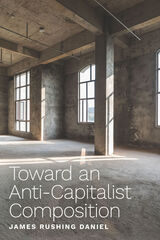 Toward an Anti-Capitalist Composition
James Rushing Daniel
Utah State University Press, 2022 In Toward an Anti-Capitalist Composition, James Rushing Daniel argues that capitalism is eminently responsible for the entangled catastrophes of the twenty-first century—precarity, economic and racial inequality, the decline of democratic culture, and climate change—and that it must accordingly become a central focus in the teaching of writing. Delving into pedagogy, research, and institutional work, he calls for an ambitious reimagining of composition as a discipline opposed to capitalism’s excesses.
Drawing on an array of philosophers, political theorists, and activists, Daniel outlines an anti-capitalist approach informed by the common, a concept theorized by Pierre Dardot and Christian Laval as a solidaristic response to capitalism rooted in inventive political action. Rather than relying upon claims of membership or ownership, the common supports radical, collective acts of remaking that comprehensively reject capitalist logics. Applying this approach to collaborative writing, student debt, working culture, and digital writing, Daniel demonstrates how the writing classroom may be oriented toward capitalist harms and prepare students to critique and resist them. He likewise employs the common to theorize how anti-capitalist interventions beyond the classroom could challenge institutional privatization and oppose the adjunctification of the professoriate.
Arguing that composition scholars have long neglected marketization and corporate power, Toward an Anti-Capitalist Composition extends a case for adopting a resolute anti-capitalist stance in the field and for remaking the university as a site of common work.
 Toward an Architecture of Enjoyment
Henri Lefebvre
University of Minnesota Press, 2014 Toward an Architecture of Enjoyment is the first publication in any language of the only book devoted to architecture by Henri Lefebvre. Written in 1973 but only recently discovered in a private archive, this work extends Lefebvre’s influential theory of urban space to the question of architecture. Taking the practices and perspective of habitation as his starting place, Lefebvre redefines architecture as a mode of imagination rather than a specialized process or a collection of monuments. He calls for an architecture of jouissance—of pleasure or enjoyment—centered on the body and its rhythms and based on the possibilities of the senses. Examining architectural examples from the Renaissance to the postwar period, Lefebvre investigates the bodily pleasures of moving in and around buildings and monuments, urban spaces, and gardens and landscapes. He argues that areas dedicated to enjoyment, sensuality, and desire are important sites for a society passing beyond industrial modernization. Lefebvre’s theories on space and urbanization fundamentally reshaped the way we understand cities. Toward an Architecture of Enjoyment promises a similar impact on how we think about, and live within, architecture.
 Toward an Evolutionary Biology of Language
Philip Lieberman
Harvard University Press, 2006 In this forcefully argued book, the leading evolutionary theorist of language draws on evidence from evolutionary biology, genetics, physical anthropology, anatomy, and neuroscience, to provide a framework for studying the evolution of human language and cognition.
Philip Lieberman argues forcibly that the widely influential theories of language's development, advanced by Chomskian linguists and cognitive scientists, especially those that postulate a single dedicated language "module," "organ," or "instinct," are inconsistent with principles and findings of evolutionary biology and neuroscience. He argues that the human neural system in its totality is the basis for the human language ability, for it requires the coordination of neural circuits that regulate motor control with memory and higher cognitive functions. Pointing out that articulate speech is a remarkably efficient means of conveying information, Lieberman also highlights the adaptive significance of the human tongue.
Fully human language involves the species-specific anatomy of speech, together with the neural capacity for thought and movement. In Lieberman's iconoclastic Darwinian view, the human language ability is the confluence of a succession of separate evolutionary developments, jury-rigged by natural selection to work together for an evolutionarily unique ability.
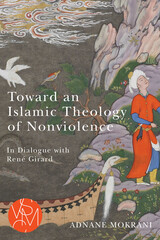 Toward an Islamic Theology of Nonviolence: In Dialogue with René Girard
Adnane Mokrani
Michigan State University Press, 2022 This groundbreaking book offers the first systematic study of the Qur’ān and Islamic history in the light of René Girard’s mimetic theory. Girard did not deal deeply with Islam, offering only scattered hints in some interviews after the September 11, 2001, attacks in the United States. Addressing this gap in Girardian studies, Adnane Mokrani aims to develop an Islamic theology that goes beyond just war theory to adopt a radical nonviolent approach. He analyzes the Qur’ānic text and classical and modern exegetical literature, focusing on the Qur’ānic narratives, then extends his research to the history of Islam, removing the sacred character attributed to some events and human choices in order to disarm theology and dismantle the ideologies of power. This same critique is also applied to the unprecedented levels of violence in modern and contemporary history. A radical and politically committed theology of peace is needed to recover the spiritual dimension of religion that frees people from the temptations of the individual and collective ego. It is a mystical and narrative theology in dialogue with other world theologies on the future of humanity—an urgent appeal needed now more than ever.
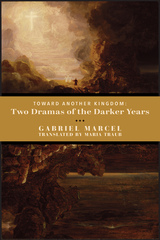 Toward Another Kingdom: Two Dramas of the Darker Years
traub
St. Augustine's Press, 2022 Maria Traub's translation of Gabriel Marcel's post-war plays is a window into the French philosopher's answer to his own signature questions regarding human existence. And as in the earlier collection of plays, The Invisible Threshold, the realism, passion and sincerity that frame conscience and moral duty in Marcel are most profoundly visible in the day-to-day of family life. Ideas never before presented theatrically emerge in Marcel's characters who struggle to understand their times and how best to live in them. Post-war life was as much a spiritual reckoning as it was a new society, and Marcel's treatment of introspection is a valuable key to his own work.
Marcel's dramas require characters to respond authentically and from their true selves. He thereby offers the vision of how individual compromises may build up to break the world and condemn, or, conversely, contribute to the discovery and meaning of relation and redemption. Traub's new translation will interest the player as much as the scholar, and Marcel's aptitude for theatrical writing is proven once again. His intellectual sensitivity creates characters that beckon performance, which is an added dimension to the presentation of the human condition.
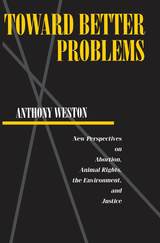 Toward Better Problems: New Perspectives on Abortion, Animal Rights, the Environment, and Justice
Anthony Weston
Temple University Press, 1992 "Toward Better Problems is a work of considerable merit.... [Weston] is effective in showing how the 'theoretical' approach obscures the real values at issue and hinders their realization."
--James Gouinlock, Emory University
In Toward Better Problems, Anthony Weston develops a pragmatic approach to the pressing moral issues of our time. Weston seeks to address practical problems in the spirit of John Dewey: that is, by focusing on specific human concerns and multiple, overlapping values rather than on abstract philosophical principles. Weston showcases his method in sustained discussion of four highly controversial areas: abortion, animal rights, environmentalism, and justice.
Weston takes up uncomfortable issues, such as how we raise food animals; test medicines, cosmetics, and chemicals on animals; and justify speciesism. He engages philosophically the treatment of land and seas as limitless garbage dumps, the creation of radioactive wastes and their disposal, and fundamental problems of social justice. But Weston's aim is not to "solve" such problems as if they were some kind of puzzle. The aim instead is to creatively transform such problematic situations into something more promising and tractable, thereby leaving us with "better problems."
Toward Camden
Mercy Romero
Duke University Press, 2021 In Toward Camden, Mercy Romero writes about the relationships that make and sustain the largely African American and Puerto Rican Cramer Hill neighborhood in New Jersey where she grew up. She walks the city and writes outdoors to think about the collapse and transformation of property. She revisits lost and empty houses—her family's house, the Walt Whitman House, and the landscape of a vacant lot. Throughout, Romero engages with the aesthetics of fragment and ruin; her writing juts against idioms of redevelopment. She resists narratives of the city that are inextricable from crime and decline and witnesses everyday lives lived at the intersection of spatial and Puerto Rican diasporic memory. Toward Camden travels between what official reports say and what the city's vacant lots withhold.
Duke University Press Scholars of Color First Book Award recipient
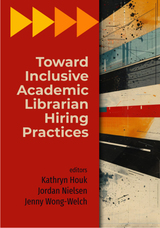 Toward Inclusive Academic Librarian Hiring Practices
Kathryn Houk
Association of College & Research Libraries, 2024 Academic library hiring can be a bureaucratic and exclusionary process. Inclusive hiring practices can help libraries recenter the people in the process and incorporate transparency, empathy, and accessibility. Toward Inclusive Academic Librarian Hiring Practices, rather than focusing just on how to diversify applicant pools, breaks down the many considerations involved in hiring and the intentional, thoughtful preparation and self-examination that leads to successful recruitment and retention in three parts. - Training for Search Committees and Stakeholders
- Removing Barriers for Candidates
- Transforming the Process for All
Throughout are practical solutions for emphasizing inclusivity and accessibility throughout the hiring process, including instructions and examples for developing the position description and job postings, tips for creating diversity statements, interview instructions and preparation lists, interview itineraries, sample candidate emails and feedback forms, evaluation rubrics, ideas for onboarding and mentorship, and more. While you are evaluating potential hires, they are evaluating you. Toward Inclusive Academic Librarian Hiring Practices can help you center equity in your hiring, attract job seekers, and support both candidates and search committees through these time-intensive, laborious, and crucial processes.
Toward Industrial Democracy: Management and Workers in Modern Japan
Kunio Odaka
Harvard University Press, 1975 In this study, Kunio Odaka discusses the complex attitudes of Japanese workers toward management, unions, work, and leisure. The results of his scholarly surveys indicate a trend toward the democratization of Japanese industrial management. In part, the book is a presentation of Odaka’s belief in the necessity for greater worker participation in the decisions that affect their working lives, a belief that is indeed radical in the Japanese setting.
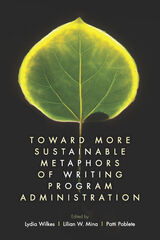 Toward More Sustainable Metaphors of Writing Program Administration
edited by Lydia Wilkes, Lilian W. Mina, and Patti Poblete afterword by Douglas Hesse
Utah State University Press, 2022 The field of writing program administration has long been a space rich in metaphor. From plate-twirling to fire-extinguishing, parents to dungeon masters, and much more, the work of a WPA extends to horizons unknown. Responding to the constraints of austerity, Toward More Sustainable Metaphors of Writing Program Administration offers new lenses for established WPAs and provides aspiring and early career WPAs with a sense of the range of responsibilities and opportunities in their academic and professional spaces.
This volume presents twelve chapters that reclaim and revise established metaphors; offer new metaphors based on sustainable, relational, or emotional labor practices and phenomena; and reveal the improvisational, artisanal nature of WPA work. Chapters resonate across three sections. The first section focuses on organic relationships captured in phrases like “putting out fires” and "seeing forests for the trees” alongside unexpected comparisons to ground and light. The second describes institutional landscapes featuring generative juxtapositions such as the WPA as a labor activist or a mapper of emotional geography. And the third discusses performance crafts like improv comedy and artisanal making.
Toward More Sustainable Metaphors of Writing Program Administration offers new and revised ways of thinking and acting for WPAs, who are constantly negotiating the paradoxical demands of their work and continually striving to act ethically in conflicted, and even fraught, situations. It will inspire practicing, aspiring, and former WPAs working in a time of transformation by highlighting more sustainable ways of enacting WPA identity.
Contributors: Jacob Babb, John Belk, Katherine Daily O'Meara, Ryan J. Dippre, Douglas Hesse, Andrew Hollinger, Rona Kaufman, Cynthia D. Mwenja, Manny Piña, Scott Rogers, Robyn Tasaka, Alexis Teagarden, Christy I. Wenger, Lydia Wilkes
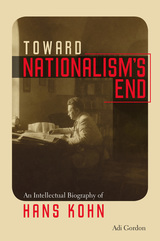 Toward Nationalism's End: An Intellectual Biography of Hans Kohn
Adi Gordon
Brandeis University Press, 2017 This intellectual biography of Hans Kohn (1891–1971) looks at theories of nationalism in the twentieth century as articulated through the life and work of its leading scholar and activist. Hans Kohn was born in late nineteenth-century Prague, but his peripatetic life took him from the Revolutionary-era Russia to interwar-era Palestine under the British Empire to the United States during the Cold War. Bearing witness to dramatic reconfigurations of national and political identities, he spearheaded an intellectual revolution that fundamentally challenged assumptions about the “naturalness” and the immutability of nationalism. Reconstructing Kohn’s long and fascinating career, Gordon uncovers the multiple political and intellectual trends that intersected with and shaped his theories of nationalism. Throughout his life, Kohn was not simply a theorist but also a participant in multiple and often conflicting movements: Zionism and anti-Zionism, pacifism, liberalism, and military interventionism. His evolving theories thus drew from and reflected fierce debates about the nature of internationalism, imperialism, liberalism, collective security, and especially the Jewish Question. Kohn’s scholarship was not an abstraction but a product of his lived experience as a Habsburg Jew, an erstwhile cultural Zionist, and an American Cold Warrior. As a product of the times, his concepts of nationalism reflected the changing world around him and evolved radically over his lifetime. His intellectual biography thus offers a panorama of the dynamic intellectual cornerstones of the twentieth century.
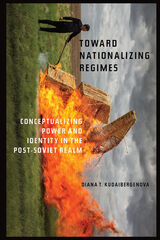 Toward Nationalizing Regimes: Conceptualizing Power and Identity in the Post-Soviet Realm
Diana T. Kudaibergenova
University of Pittsburgh Press, 2020 Finalist, 2021 CESS Book Award
The collapse of the Soviet Union famously opened new venues for the theories of nationalism and the study of processes and actors involved in these new nation-building processes. In this comparative study, Kudaibergenova takes the new states and nations of Eurasia that emerged in 1991, Latvia and Kazakhstan, and seeks to better understand the phenomenon of post-Soviet states tapping into nationalism to build legitimacy. What explains this difference in approaching nation-building after the collapse of the Soviet Union? What can a study of two very different trajectories of development tell us about the nature of power, state and nationalizing regimes of the ‘new’ states of Eurasia? Toward Nationalizing Regimes finds surprising similarities in two such apparently different countries—one “western” and democratic, the other “eastern” and dictatorial.
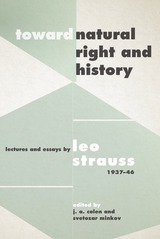 Toward "Natural Right and History": Lectures and Essays by Leo Strauss, 1937–1946
Leo Strauss
University of Chicago Press, 2018 Natural Right and History is widely recognized as Strauss’s most influential work. The six lectures, written while Strauss was at the New School, and a full transcript of the 1949 Walgreen Lectures show Strauss working toward the ideas he would present in fully matured form in his landmark work. In them, he explores natural right and the relationship between modern philosophers and the thought of the ancient Greek philosophers, as well as the relation of political philosophy to contemporary political science and to major political and historical events, especially the Holocaust and World War II.
Previously unpublished in book form, Strauss’s lectures are presented here in a thematic order that mirrors Natural Right and History and with interpretive essays by J. A. Colen, Christopher Lynch, Svetozar Minkov, Daniel Tanguay, Nathan Tarcov, and Michael Zuckert that establish their relation to the work. Rounding out the book are copious annotations and notes to facilitate further study.
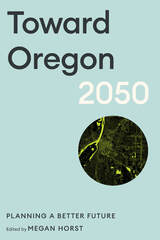 Toward Oregon 2050: Planning a Better Future
Megan Horst
Oregon State University Press, 2024 How do we plan for a better Oregon in 2050? What will the state be like in that year for five million Oregonians, particularly for the least privileged and powerful residents? These are the questions that drive Oregon 2050, an interdisciplinary project at Portland State University that aims to help the state become more environmentally sustainable, socially equitable, and fiscally resilient.
In this compelling volume, leading experts in land use and urban planning, in cooperation with other scholars and community partners, envision various possible futures and begin the work of developing statewide plans to guide Oregon through the decades ahead. Building on the state’s policy innovation and planning legacy, contributors to Toward Oregon 2050 address current challenges such as housing scarcity, income inequality, the rural-urban divide, and climate change. They offer recommendations on a range of issues, from culture to incarceration, transportation to voting rights, all with the goal of imagining what a fair and equitable Oregon might look like.
Some of the imagined futures—with worsening effects of climate change, environmental harms, and social inequities—are not bright for many Oregonians. Other futures include enhanced resiliency to forest fires and flooding, more Oregonians in high-paying jobs and in secure housing, and more children walking and biking to school. But those positive futures are not guaranteed, and getting there won’t be easy. They’ll require all stakeholders—state and local government, members of all political parties, private businesses, non-profit organizations, and individual residents—to play a role in ensuring a better future for the next generation of Oregonians.
Intended for all Oregonians who care about their state’s future, Toward Oregon 2050 will also appeal to scholars and planners who have long looked to Oregon for inspiration and lessons learned. The book invites readers to envision the future of Oregon and to contribute their part toward a better future for the state.
Toward Social Reporting: Next Steps
Otis Dudley Duncan
Russell Sage Foundation, 1969 A volume of Social Science Frontiers, a series of publications reviewing new fields for social development, aimed at foundation executives, administrators of research grant programs, directors of research organizations, and others concerned with making contemporary social science more useful for the function of social reporting.
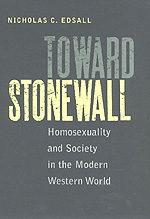 Toward Stonewall: Homosexuality and Society in the Modern Western World
Nicholas C. Edsall
University of Virginia Press, 2003 As recently as the 1970s, gay and lesbian history was a relatively unexplored field for serious scholars. The past quarter century, however, has seen enormous growth in gay and lesbian studies. The literature is now voluminous; it is also widely scattered and not always easily accessible. In Toward Stonewall, Nicholas Edsall provides a much-needed synthesis, drawing upon both scholarly and popular writings to chart the development of homosexual subcultures in the modern era -- and the uneasy place they have occupied in Western society.
Edsall's survey begins three hundred years ago in northwestern Europe, when homosexual subcultures recognizably similar to those of our own era began to emerge, and it follows their surprisingly diverse paths through the Enlightenment to the early nineteenth century. The book then turns to the Victorian era, tracing the development of articulate and self-aware homosexual subcultures. With a greater sense of identity and organization came new forms of resistance: this was the age that saw the persecution of Oscar Wilde, among others, as well as the medical establishment's labeling of homosexuality as a sign of degeneracy.
The book's final section locates the foundations of present-day gay subcultures in a succession of twentieth-century scenes and events--in pre-Nazi Germany, in the lesbian world of interwar Paris, in the law reforms of 1960s England--culminating in the emergence of popular movements in the postwar United States.
Rather than examining these groups in isolation, the book considers them in their social contexts and as comparable to other subordinate groups and minority movements. In the process, Toward Stonewall illuminates not only the subcultures that are its primary subject but the larger societies from which they emerged.
--------------------------------------------------------------------------------
Nicholas C. Edsall is Professor Emeritus of History at the University of Virginia and the author of Richard Cobden: Independent Radical.
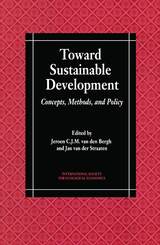 Toward Sustainable Development: Concepts, Methods, and Policy
Edited by Jeroen C.J.M. van den Bergh and Jan van der Straaten; International Society for Ecological Economics
Island Press, 1994 Toward Sustainable Development is a comprehensive and wide ranging exploration of the theoretical and practical aspects of the concept of sustainable development. Internationally known scholars present an in depth critique of traditional economic methods and ideas, and a new framework for analysis of issues of development and environmental policy. The book: - outlines the historical development of the concept of sustainable development
- clarifies the many interpretations of what sustainable development is
- presents new and detailed assessments of the concepts, methods, and implementation of sustainable development policies
As well as explaining the conceptual and theoretical background, the book discusses methods and techniques, and examines issues of policy and implementation. It offers both critical observations on old approaches, and valuable guidelines for recent innovations.
 Toward the Conquest of Beriberi
Robert R. Williams
Harvard University Press This exciting medical detective story of the search for the cause of beriberi—an account of the 26 years of research for a method of isolating the vitamin, the determination of its molecular structure, and the development of methods for its synthesis—is a remarkable first-person account of an important chapter of medical history. The book summarizes all that has been learned about beriberi since the beginning of medicine. It chronicles the unceasing efforts of the author to eradicate the scourge of beriberi among the rice-eating peoples of the world.
Beriberi is of evident interest to specialists in the fields of nutrition and public health; it appeals also to those confronted with practical problems in applied medicine or science; and it is a compelling story of an exciting and admirable human adventure for the general reader. The author has directed his book especially to students in Asia who are becoming increasingly responsible for the welfare of their countries.
 Toward the Endless Day: The Life of Elisabeth Behr-Sigel
Olga Lossky
University of Notre Dame Press, 2010
Elisabeth Behr-Sigel (1907-2005) was one of the most important Orthodox theologians of the twentieth century. For seventy years she helped her church, dispersed and uprooted from its cultural heritage, adapt to a new world. Born in Alsace, France, to a Protestant father and a Jewish mother, Behr-Sigel received a master's degree in theology from the Protestant Faculty of Theology at Strasbourg and began a pastoral ministry. It lasted only a year. Already attracted by the beauty of its liturgy and by its characteristic spirituality, Behr-Sigel officially embraced the Orthodox faith at age twenty-four.
During World War II her family (husband Andre Behr and their three children) lived in Nancy, France, where Behr-Sigel taught in the public school system. She later referred to this time as her real apprenticeship in ecumenism, when people of different traditions came together in opposition to Nazism, hiding Jews and providing escape routes.
After the war she took advantage of courses at St. Sergius Theological Institute in Paris, where she later joined the faculty. Behr-Sigel also taught at the Catholic Institute of Paris, the Dominican College of Ottowa, and the Ecumenical Institute of Tantur near Jerusalem. She wrote and published books in Orthodox theology, spirituality, and the role of women in the Orthodox Church. In her retirement she continued to work on behalf of women and of the ecumenical movement.
Published in 2007 in France as Vers le jour sans declin, this biography by the Orthodox writer Olga Lossky will bring to English-speaking readers of all religious persuasions the life and career of a remarkable and admirable woman of faith. Behr-Sigel fully cooperated with this biography, meeting with Lossky weekly during the last year of her life and giving Lossky access to her journal and personal letters.
"Elisabeth Behr-Sigel was a remarkable woman who lived in remarkable times. In a new century and in a changed world, we need her story desperately. Olga Lossky provides the window to a life that challenges us more with every passing day. We can be grateful to Jerry Ryan and Michael Plekon for bringing this book to the English-speaking readership." --Susan Ashbrook Harvey, Brown University
"Behr-Sigel had to reconcile a series of antinomies in her own life--Orthodox and Protestant, woman and theologian, eastern and Parisian, Jewish and Christian, married and ascetic, western in culture and imbued with Russian spirituality--and by her accomplishment she is a witness to us. It makes for fascinating reading to watch her accomplish this sobornicity in person, and Olga Lossky's careful biography makes that possible." --David Fagerberg, University of Notre Dame
". . . a thorough, readable, and deeply sympathetic study of one of the most outstanding modern Western interpreters of orthodoxy. For anyone who imagines that this tradition is marginal to the cultural history of twentieth-century Europe, this biography of a Protestant woman of Jewish family, balancing work, parenthood (single parenthood for a lot of the time), and scholarly and creative writing ought to produce some second thoughts." --Rowan Williams, Times Literary Supplement
Toward the Final Solution: A History of European Racism
George L. Mosse, With a critical introduction by Christopher R. Browning
University of Wisconsin Press, 2020 Originally published in 1978, Toward the Final Solution was one of the first in-depth studies of the evolution of racism in Europe, from the Age of Enlightenment through the Holocaust and Hitler’s Final Solution. George L. Mosse details how antisemitism and dangerous prejudices have long existed in the European cultural tradition, revealing an appalling and complex history. With the global renewal of extreme, right-wing nationalism, this instrumental work remains as important as ever for understanding how bigotry impacts political, cultural, and intellectual life. This edition of Mosse’s classic book includes a new critical introduction by Christopher R. Browning, author of Ordinary Men: Reserve Police Battalion 101 and the Final Solution in Poland.
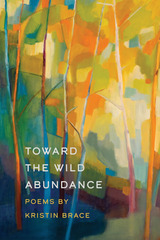 Toward the Wild Abundance
Kristin Brace
Michigan State University Press, 2019 Looking back, within, and ahead—while ultimately focusing on the here and now—Kristin Brace traverses landscapes of memory, dreams, and the imagination, exploring the fragments and shifting perspectives that shape experience and identity and reinvigorate the creation of meaning. With tenderness and wonder, these poems build their own stepping stones for the journey, moving from connection to disconnection, frailty to strength, and fierce love to intense isolation, depicting a whole that is enlivened by the coexistence of seemingly opposing forces, emotions, and experiences. Despite the darkness and uncertainty they embody, the poems in this collection insist on their existence, forever traveling toward moments alive with color and light. The poet draws from the riches of art, nature, and the quiet moments of every day in reflections often startling in language and content and unified by their voice-driven musicality. Fraught with illness, longing, and loss, these poems guide readers through the intricate geographies of the heart, sometimes hurtling, sometimes dancing, sometimes feeling their way through the dark toward the wild abundance of each new day.
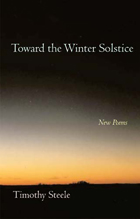 Toward the Winter Solstice: New Poems
Timothy Steele
Ohio University Press, 2006 Since the appearance of Timothy Steele’s first collection of poems in 1979, growing numbers of readers and critics have recognized him as one of the best and most significant poets of his generation. Widely credited with anticipating and encouraging the revival of poetry in traditional form, Steele has produced a body of work praised for its technical accomplishment, its intellectual breadth, and its emotional energy.
Toward the Winter Solstice, Steele’s first collection of new poems in twelve years, features his characteristic grace, wit, and power, while extending his range. In addition to the relatively short lyrical, descriptive, and contemplative poems he has always written so well, this collection offers several middle-length pieces that read almost like compressed novels.
Addressing a variety of topics and themes, Toward the Winter Solstice explores the relationship between the world of nature and the world of ideas. In one way or another, the poems attempt to link the external material universe with that sense of inward self-awareness central to our experience of life. Throughout, Steele writes with a clarity that not only illuminates his subjects but also acknowledges and preserves their ultimate mystery and complexity.
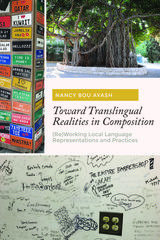 Toward Translingual Realities in Composition: (Re)Working Local Language Representations and Practices
Nancy Bou Ayash
Utah State University Press, 2019 Toward Translingual Realities in Composition is a multiyear critical ethnographic study of first-year writing programs in Lebanon and Washington State—a country where English is not the sole language of instruction and a state in which English is entirely dominant—to examine the multiple and often contradictory natures, forces, and manifestations of language ideologies. The book is a practical, useful way of seriously engaging with alternative ways of thinking, doing, and learning academic English literacies.
Translingualism work has concentrated on critiquing monolingual and multilingual notions of language, but it is only beginning to examine translingual enactments in writing programs and classrooms. Focusing on language representations and practices at both the macro and micro levels, author Nancy Bou Ayash places the study and teaching of university-level writing in the context of the globalization and pluralization of English(es) and other languages. Individual chapters feature various studies that Bou Ayash brings together to address how students act as agents in marshaling their language practices and resources and shows a deliberate translingual intervention that complicates and enriches students’ assumptions about language and writing. Her findings about writing programs, instructors, and students are detailed, multidimensional, and complex.
A substantial contribution to growing translingual scholarship in the field of composition studies, Toward Translingual Realities in Composition offers insights into how writing teacher-scholars and writing program administrators can more productively intervene in local postmonolingual tensions and contradictions at the level of language representations and practices through actively and persistently reworking the design and enactment of their curricula, pedagogies, assessments, teacher training programs, and campus-wide partnerships.
 Toward Wiser Public Judgment
Daniel Yankelovich
Vanderbilt University Press, 2011 This work revisits and expands upon Yankelovich¹s seminal 1991 book, Coming to Public Judgment, which argued that people advance through several distinct stages to form politically meaningful judgments about public issues. In particular, citizens must "work through" the temptation to opt for easy answers or engage in wishful thinking, reconcile conflicting values, and come to terms with tough tradeoffs, before they can truly support a new course of action. The present work examines these themes in light of changing societal conditions, from the advent of the Internet and the weakening of traditional media to the proliferation of urgent and complex problems that cannot be put off without courting disaster.
In his lead chapter, Dan Yankelovich urges us to move away from a "misleading model of public opinion" that "dominates the expert culture of our society, including journalists, scientists, business leaders, scholars, professional experts, and political leaders." He and the other contributors (Will Friedman, Keith Melville, Robert Kingston, Alison Kadlec, Steven A. Rosell, and Heidi Gantwerk) describe methods used by organizations like Public Agenda, National Issues Forums, and Viewpoint Learning, Inc., to advance the public's learning curve through various forms of civic engagement, education, dialogue and deliberation.
They provide case studies of education reform in Bridgeport, Connecticut, and math and science initiatives in the Kansas City area, and examples of programs that have focused on issues ranging from energy and health care to US-Muslim relations. One chapter is a dialogue between Yankelovich and Friedman.
While our political culture resonates to the public's desire for a stronger voice, it fails to ensure that this voice reflects anything more than the spin, spectacle, and excessive partisanship that dominate today's public discourse. Toward Wiser Public Judgment offers insights and strategies to counteract these troubling trends.
Towards a Christian Philosophy
Joseph Owens
Catholic University of America Press, 2018 Brings together a lifetime of work on the problems presented by the notion of a Christian philosophy, debates whether a Christian philosophy is possible, and outlines the steps for its development.
Towards a Cognitive Mode in Global Finance?: The Governance of a Knowledge-Based Financial System
Edited by Torsten Strulik and Helmut Willke
Campus Verlag, 2007 The global finance system has been the subject of hot debate for several years. Major players such as the International Monetary Fund and the World Bank have come under fire for their financial practices, while the role of epistemic authorities, including rating agencies, remains unclear. This book systematically analyzes the role knowledge plays in global finance reform by considering its influence in the empirical areas of finance (banking, accounting, and bond rating, for example). As the contributors demonstrate, current institutional management strategies reflect a shift toward “cognitive,” or learning-based modes of managing financial and political risks—and this cognitive thinking has its own consequences for the global marketplace.
Towards a Data-driven Military: A Multidisciplinary Perspective
Peter Pijpers
Leiden University Press, 2023 Towards a Data-Driven Military: A Multidisciplinary Perspective assesses the use of data and information on modern conflict from different scientific and methodological disciplines, aiming to generate valuable contributions to the ongoing discourse on data, the military and modern warfare. Part one, ‘Military Systems and Technology’, approaches the theme empirically by researching how data can enhance the utility of military materiel and subsequently accelerate the decision-making process. Part two, ‘War Studies’, takes a multidisciplinary approach to the evolution of warfare, while the third part, ‘Military Management Studies’, takes a holistic organizational and procedural approach. Based on their scientific protocols and research methods, the three domains put forward different research questions and perspectives, providing the unique character of this book.
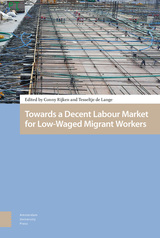 Towards a Decent Labour Market for Low-Waged Migrant Workers
Edited by Conny Rijken and Tesseltje de Lange
Amsterdam University Press, 2018 Central to this edited volume is the legal position and the labour situation of non-EU and EU low-waged migrant workers. Towards a Decent Labour Market for Low-Waged Migrant Workers presents ground breaking research on policies and practices in search of striking a right balance between the economic ambitions and the negative consequences thereof, for labour market dynamics such as down-ward wage pressures, unfair competition, the abuse of migrant workers and even the long-term setback for the children of previously low-waged migrant workers. Imbalances or presumed imbalances between free market mechanisms, labour migration policies, labour market protection and corrective mechanisms to protect migrant workers, thus come to the fore. The contributors to this volume will deconstruct some of these imbalances, and shed light on its causes, consequences and interrelatedness with other factors. Possible solutions that contribute to a decent labour market, in which rights of low-waged migrant workers are more respected, will be discussed.
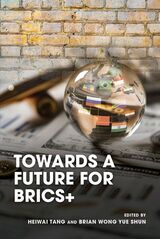 Towards a Future for BRICS+
Edited by Heiwai Tang and Brian Wong Yue Shun
Hong Kong University Press, 2025 Economic powerhouse or geopolitical experiment? A critical look at BRICS+ in the twenty-first century.
As the BRICS bloc expands beyond its original five members to include Egypt, Ethiopia, Iran, Indonesia, and the UAE—with Saudi Arabia invited to join—the influence of BRICS+ in global trade and geopolitics is growing. The question remains: what does this shifting balance of power mean for the world?
Towards a Future for BRICS+, edited by Heiwai Tang and Brian Wong, brings together leading scholars to assess the past, present, and future of this evolving coalition. With rigorous, evidence-based analysis, this work outlines the economic and political complementarities between BRICS+ nations while also addressing internal tensions and the broader implications for the Global South.
As questions linger over the viability of BRICS+ as a counterweight to the G7, this book is a valuable reference for policymakers and scholars seeking to understand the emerging global order.
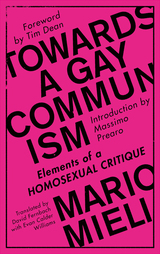 Towards a Gay Communism: Elements of a Homosexual Critique
Mario Mieli
Pluto Press, 2018 First published in Italian in 1977, Mario Mieli's groundbreaking book is an early landmark of revolutionary queer theory - now available for the first time in a complete and unabridged English translation. Among the most important works ever to address the relationship between homosexuality, homophobia and capitalism, Mieli's essay continues to pose a radical challenge to today's dominant queer theory and politics. With extraordinary prescience, Mieli exposes the efficiency with which capitalism co-opts 'perversions' which are then 'sold both wholesale and retail'. In his view the liberation of homosexual desire requires the emancipation of sexuality from both patriarchal sex roles and capital. Drawing heavily upon Marx and psychoanalysis to arrive at a dazzlingly original vision, Towards a Gay Communism is a hitherto neglected classic that will be essential reading for all who seek to understand the true meaning of sexual liberation under capitalism today.
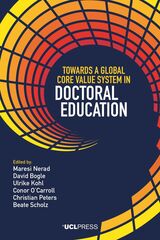 Towards a Global Core Value System in Doctoral Education
Edited by Maresi Nerad, David Bogle, Ulrike Kohl, Conor O’Carroll, Christian Peters, and Beate Scholz
University College London, 2022 Globalization and doctoral education in the twenty-first century.
This book provides an evaluation of changes and reforms in doctoral education since 2000. Recent decades have seen an explosion in doctoral education worldwide, and the increased potential for diverse employment has generated greater interest. Recognizing the diversity of academic cultures and institutional systems worldwide, the book advocates for a core value system to overcome inequalities in access to doctoral education. The chapters focus on the structures and quality assurance models of doctoral education, supervision, and funding from an institutional and comparative perspective. The book examines capacity building in the era of globalization, global labor market developments for doctoral graduates, and the ethical challenges and political contestations that may manifest in the process of pursuing a PhD.
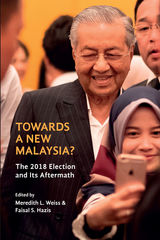 Towards a New Malaysia?: The 2018 Election and Its Aftermath
Meredith L. Weiss and Faizal S. Hazis
National University of Singapore Press, 2020 Malaysia’s stunning 2018 election brought down a ruling party that had held power since independence in 1957, marking the first regime change in the country’s history. This book tells the full story of this historic election (officially called the 14th Malaysian General Election or GE14), combining a sharp analysis of the voting data with consideration of the key issues, campaign strategies, and mobilization efforts that played out during the election period. This analysis is then used to bring fresh ideas and perspectives to the core debates about Malaysian political ideas, identities and behaviors, debates that continue to shape the country’s destiny.
After the election, many Malaysians were optimistic about the possibility of a more representative, accountable, participatory, and equitable polity, but Meredith L. Weiss and Faisal S. Hazis do not see GE14 as a clear harbinger of full-on liberalization. While the political aftermath of the election continues to play out, the authors provide a clarion call for deeper, more critical, more comparative research on Malaysia’s politics. They upend commonly held beliefs about Malaysian politics and bring forward lesser-known theories, and they suggest agendas for empirically interesting, theoretically relevant further research. They also point to the broader insights Malaysia’s experience provides for the study of elections and political change in one-party dominant states around the world.
Towards a Political Aesthetics of Cinema: The Outside of Film
Sulgi Lie
Amsterdam University Press, 2020 Towards a Political Aesthetics of Cinema: The Outside of Film is a contribution to an aesthetics of cinema rooted in Marxist theory. Rather than focusing on the role that certain films, or the cinema as an institution, might play in political consciousness, the book asks a different question: how can the subject of politics in film be thought? This problem is presented in a systematic-theoretical rather than historical manner. The main aim of this book is a retrospective rehabilitation of the psychoanalytical concept of "suture," whose political core is progressively revealed. In a second step, this rereading of "suture"-theory is mediated with the Marxist aesthetics of Fredric Jameson. From the perspective of this reconfigured aesthetics of negativity, films by Hitchcock, Antonioni, Haneke and Kubrick are analyzed as articulations of a political unconscious.
Towards a Praxis-based Media and Journalism Research
Edited by Leon Barkho
Intellect Books, 2017 This volume brings together current scholarly debates about how to bridge the gap between theory and practice in media and journalism research. Drawing on work from media scholars and media practitioners that focuses on how both sides can work together for the good of society, Towards a Praxis-based Media and Journalism Research is the first collection to examine how theory and practice can be combined for positive effect. The result will lay important groundwork for scholarship on this new and increasingly important idea in media and communication studies.
Towards a Romanian Silicon Valley?: Local Development in Post-Socialist Europe
Enikö Baga
Campus Verlag, 2007 This book examines local attempts at sustainable development in post-socialist Eastern Europe. Enikö Baga focuses on the small Romanian town of Timisoara as its residents respond to major national and international changes, including the dismantling of an authoritarian regime and Romania’s admittance to the European Union in 2007. As Baga illustrates, such shifts provide powerful opportunities for local communities, as they learn to use their own economic, social, and cultural resources to enact political change. A unique look at grassroots development efforts in Eastern Europe, this book will be an important study for scholars and students of economics and comparative politics.
Towards a Social Investment Welfare State?: Ideas, Policies and Challenges
Edited by Nathalie Morel, Bruno Palier, and Joakim Palme
Bristol University Press, 2012
Since the late 1990s, new strategies concerning the role and shape of welfare states have been formulated, many of which are guided by a logic of social investment. This book maps out this new perspective and assesses both its achievements and shortcomings. In doing so, it provides a critical analysis of social investment ideas and policies and opens up for discussion many of Europe’s most pressing concerns—such as an aging population, the current economic crisis, and environmental issues— and whether social investment can provide adequate responses to these challenges.
Towards a Society That Serves Its People: The Intellectual Contribution of El Salvador's Murdered Jesuits
John Hassett and Hugh Lacey, Editors
Georgetown University Press, 1991 This collection presents a representative sample of the writings of three of the six Jesuits who were slain in El Salvador on November 16, 1989. Although little known in the United States, these men were significant scholars who possessed an original conception of the university. They affirmed in difficult circumstances, the pursuit and teaching of truth as a collaborative, collegial process that transcends international boundaries.
 Towards a Sustainable Information Society: Deconstructing WSIS
Edited by Nico Carpentier and Jan Servaes
Intellect Books, 1995
The Information Society is one of the recurrent imaginaries to describe present-day structures, discourses and practices. Within its meaning is enshrined the promise of a better world, sometimes naively assuming a technological deus ex machina, in other cases hoping for the creation of policy tools that will overcome a diversity of societal divides.
With the two-phased World Summit on the Information Society (WSIS), the United Nations attempted to stimulate the development of such tools.
Simultaneously, the WSIS is a large-scale experiment in multistakeholderism. The objective was to create a more balanced decision-making process that would allow the voices of civil society and business actors to be heard in international politics.
This book aims to evaluate the potentialities of both the Information Society, and the WSIS in supporting and constructing more democratic, just and developed societies. It is the second book arising from the intellectual work of European Consortium for Communications Research members.
 Towards an Aesthetics of Production
Sebastian Egenhofer
Diaphanes, 2017 Throughout the twentieth century, art history has been too narrowly focused on formalism. As a result, analyses regularly reduced works of art to their materials, texture, and composition. By contrast, art historian Sebastian Egenhofer takes Gilles Deleuze’s readings of Spinoza, Nietzsche, and Bergson as the basis for a new resistance to the overly reductive account of art history.
After laying out his argument for a new aesthetics of production in introductory chapters that discuss the work of Spinoza, Nietzsche, and Bergson, as well as Heidegger and Kant, Egenhofer applies this theoretical framework to case studies on Michael Asher, Marcel Duchamp, Thomas Hirschhorn, and Piet Mondrian. An aesthetics of production does not, he argues, imply a nostalgia for the artisanal or for a work of art’s singularity, but a way to bring together elements of critical materialism with a thorough reevaluation of the modern art and abstraction.
Towards Better Reproductive Health in Eastern Europe: Concern, Commitment, and Change
WHO Scientific Working Group WHO Scientific Working Group
Central European University Press, 1998 Documenting the latest statistical data on current problems related to reproductive health issues in Central and Eastern Europe, this text explores the reasons for these problems and recommends action based on the scientific evidence for improving reproductive health. The main issues covered are: declining standards of reproductive health care; rising trends in the incidence of sexually transmitted diseases; low rates of use of modern contraceptives; high rates of induced abortion; high prevalence of infertility; and the needs of adolescents with regard to reproductive health.
 Towards Coherence Between Classroom Assessment and Accountability
Edited by Mark Wilson
University of Chicago Press, 2004 In analyses of the role of national educational assessment, insufficient attention has been paid to the central place of the classroom. Rather than encouraging a two-way flow of information, today's "standards-based" frameworks tend to direct the flow of accountability from the outside into the classroom.
The authors of this volume emphasize that assessment, as it exists in schools today, consists mainly of the measurements that teachers themselves design, evaluate, and act upon every day. Improving the usefulness of assessment in schools primarily requires assisting and harnessing this flood of assessment information, both as a means of learning within the classroom and as the source of crucial information flowing out of classrooms.
This volume aims to encourage debate and reflection among educational researchers, professionals, and policymakers. Five source chapters describe successful classroom assessment models developed in partnership with teachers, while additional commentaries give a range of perspectives on the issues of classroom assessment, standardized testing, and accountability.
 Towards Forest Sustainability
Edited by David B. Lindenmayer and Jerry F. Franklin
Island Press, 2003 The world's montane forests are vitally important for conservation and water catchment. Because logging regimes have significant impacts on biodiversity as well as water quality and water quantity, the management of these forests has often been a major source of conflict amongst rural communities, government agencies, and conservationists. Although much information on ecologically sustainable managment practices is now available, further organizational change and policy tranformation is needed to see a transition to sustainable practices inplemented on the ground. Towards Forest Sustainability contains practical essays by some of the world's leading forests ecologists and managers from the United States, Canada, Finland, Sweden, Australia, and New Zealand. The authors describe the changes that have taken place in forest management- highlighting what worked, what didn't, and the lessons that have been learned. This unique collection of essays documents the drivers of the change in the logging industry and the resulting outcomes, both the good and the bad. The book provides real-world insights from an international perspective into government policy, industrial concerns, and conservation and biodiversity issues.
Towards Japan: A Personal Journey
Arthur Stockwin
Amsterdam University Press, 2020 Distinguished author and former Professor of Modern Japanese Studies at Oxford, Arthur Stockwin here explores his personal journey from being the son of medical/dental parents in Birmingham, England, to becoming a specialist in the politics and modern history of Japan, while at the same time reflecting on his considerable personal experiences of Japan and assessing its current and possible future condition.
 Towards Juristocracy: The Origins and Consequences of the New Constitutionalism
Ran Hirschl
Harvard University Press, 2004 In countries and supranational entities around the globe, constitutional reform has transferred an unprecedented amount of power from representative institutions to judiciaries. The constitutionalization of rights and the establishment of judicial review are widely believed to have benevolent and progressive origins, and significant redistributive, power-diffusing consequences. Ran Hirschl challenges this conventional wisdom.
Drawing upon a comprehensive comparative inquiry into the political origins and legal consequences of the recent constitutional revolutions in Canada, Israel, New Zealand, and South Africa, Hirschl shows that the trend toward constitutionalization is hardly driven by politicians' genuine commitment to democracy, social justice, or universal rights. Rather, it is best understood as the product of a strategic interplay among hegemonic yet threatened political elites, influential economic stakeholders, and judicial leaders. This self-interested coalition of legal innovators determines the timing, extent, and nature of constitutional reforms.
Hirschl demonstrates that whereas judicial empowerment through constitutionalization has a limited impact on advancing progressive notions of distributive justice, it has a transformative effect on political discourse. The global trend toward juristocracy, Hirschl argues, is part of a broader process whereby political and economic elites, while they profess support for democracy and sustained development, attempt to insulate policymaking from the vicissitudes of democratic politics.
Towards Marine Ecosystem-Based Management in the Wider Caribbean
Edited by Lucia Fanning, Robin Mahon, and Patrick McConney
Amsterdam University Press, 2011 In order to ensure sustainable use of their shared marine resources, the nations of the West Caribbean Region must adopt an approach that encompasses both the human and natural dimensions of ecosystems. This volume directly contributes to that vision, bringing together the collective knowledge and experience of scholars and practitioners within the wider Caribbean to assemble a road map towards marine ecosystem based management for the region. The research presented here will be used not only as a training tool for graduate students, but also as comparative example and guide for stakeholders and policy makers in each of the world’s sixty-four large marine ecosystems.
Towards Mental Health: The Schizophrenic Problem
Charles Macfie Campbell
Harvard University Press Now that hygiene has made such striking advances in the treatment of nutritional and infectious disorders, there is a growing interest in the prevention or reduction of mental maladjustments and mental disorders. In this book, which consists of three lectures recently delivered at the Illinois College of Medicine, Dr. Campbell discusses the more serious types of mental disorders. He gives a concise presentation of a number of actual cases, an analysis of the individual and social problems involved, and a review of the resources of the individual and of the community for meeting the challenge of these cases. The issues discussed are of importance to the teacher, the social worker, the pastor, the parent, and to whoever is interested theoretically or practically in the difficulties of the individual in adapting himself to the social environment.
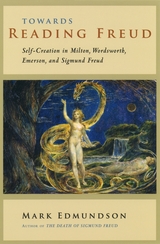 Towards Reading Freud: Self-Creation in Milton, Wordsworth, Emerson, and Sigmund Freud
Mark Edmundson
University of Chicago Press, 2007 When most critics were using Freudian theories to study literature, Mark Edmundson read Freud’s writings as literature alongside the works of poets grappling with the heady issues of desire, narcissism, and grief. Towards Reading Freud weighs the psychoanalyst’s therapeutic directives against his more visionary impulses in a magisterial comparative study of such writers as Shakespeare, Wordsworth, Emerson, and Keats. Cross-fertilizing psychological doctrine with the literary canon, this richly informed volume forges a new understanding of Freud’s writings on the self.
“Marvelous. . . . Edmundson’s book offers an extraordinary challenge both to practicing analysts and to a scholarly community which all too uncomplainingly inhabits and reinforces the Freudian paradigm of interpretation. Edmundson reinvents an adventurous and dissident Freud as an antidote to . . . weary psychoanalytic commonplaces.”—Malcolm Bowie, Raritan
“This book takes a distinguished place in the ongoing effort to recontextualize Freud by stressing the literary, rather than the scientific roots and character of his theory.”—Virginia Quarterly Review
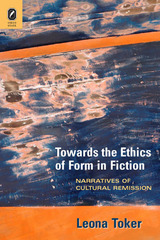 Towards the Ethics of Form in Fiction: Narratives of Cultural Remission
Leona Toker
Ohio State University Press, 2010 Scholars and critics have long recognized the need for ethical criticism to address not only the idea-content but also the morphological aspects of narrative, yet the search continues for ways to study the ethics of narrative form. In Towards the Ethics of Form in Fiction: Narratives of Cultural Remission, Leona Toker suggests a method of linking formal features of narratives with the types of moral vision that they represent.
Toker is especially interested in cultural remissions such as the carnivalesque—that is, the inverting of standard cultural hierarchies or the blurring of boundaries between normally separated social groups, actors and audiences, self and other. She argues that cultural remissions have the potential not simply to provide a break from the determinacies of our quotidian existence but also to return us to that existence with some alteration of our perceptions, beliefs, and values. Toker contends that the ethical consequences of reading fiction result from features of its aesthetics, particularly what she calls, following the semiotician Louis Hjemslev, “the form of the content”—the patterns arising from the artistic deployment of narrative details. In addition to addressing the carnivalesque discourse of Bakhtin as well as the theory of oppositionality developed by de Certeau and Chambers, she puts theory into practice through detailed analyses of canonical texts by Fielding, Sterne, Austen, Hawthorne, Dickens, Conrad, Joyce, and other writers.
 The Tower: and other stories
Janis Ezerins
Central European University Press, 2012 The Latvian Janis Ezerins's best work was created in the genre of the short story. Among his literary models were Boccaccio, Maupassant and Poe. During his active literary working life, which lasted approximately five to six years of his short life, Ezerins seemingly grasped an encyclopaedia of possibilities and subject matter, as well as the versatility of storytelling, not avoiding either classical subjects or the repetition of characters so traditional in short stories. For the twenty-first century reader his stories evoke the atmosphere of the post-war, newly independent, fairly multicultural Latvia, rural mysticism hued with the "fine neurosis" of the emerging modern era. In many of his stories Ezerins disputed the single-dimensional (e.g., good/evil) portrayal of a human being. The people in his prose are individuals with their own unique characteristics, often ambivalent, and subject to change in time and situations. As is common in modern literature, Ezerins often blurs the boundaries between reality and fantasy, frequently making his reader laugh about the serious while aching when reading the humorous.
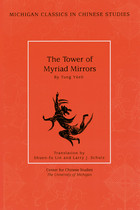 The Tower of Myriad Mirrors: A Supplement to Journey to the West
Tung Yüeh; Translated from the Chinese by Shuen-fu Lin and Larry J. Schulz
University of Michigan Press, 2000 China’s most outrageous character—the magical Monkey who battles a hundred monsters—returns to the fray in this seventeenth-century sequel to the Buddhist novel Journey to the West. In The Tower of Myriad Mirrors, he defends his claim to enlightenment against a villain who induces hallucinations that take Monkey into the past, to heaven and hell, and even through a sex change. The villain turns out to be the personification of his own desires, aroused by his penetration of a female adversary’s body in Journey to the West. The Tower of Myriad Mirrors is the only novel of Tung Yüeh (1620–1686), a monk and Confucian scholar. Tung picks up the slapstick of the original tale and overlays it with Buddhist theory and bitter satire of the Ming government’s capitulation to the Manchus. After a nod to Journey’s storyteller format, Tung carries Monkey’s quest into an evocation of shifting psychological states rarely found in premodern fiction. An important though relatively unknown link in the development of the Chinese novel, and a window into late Ming intellectual history, The Tower of Myriad Mirrors further rewards by being a wonderful read.
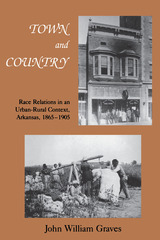 Town and Country: Race Relations in an Urban-Rural Context, Arkansas, 1865–1905
John Graves
University of Arkansas Press, 1990 A thoroughly researched and extensively documented look at race relations in Arkansas druing the forty years after the Civil War, Town and Country focuses on the gradual adjustment of black and white Arkansans to the new status of the freedman, in both society and law, after generations of practicing the racial etiquette of slavery. John Graves examines the influences of the established agrarian culture on the developing racial practices of the urban centers, where many blacks living in the towns were able to gain prominence as doctors, lawyers, successful entrepreneurs, and political leaders. Despite the tension, conflict, and disputes within and between the voice of the government and the voice of the people in an arduous journey toward compromise, Arkansas was one of the most progressive states during Reconstruction in desegregating its people. Town and Country makes a significant contribution to the history of the postwar South and its complex engagement with the race issue.
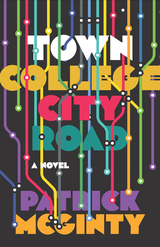 Town College City Road
Patrick McGinty
University of Wisconsin Press, 2025 Town College City Road follows Kurt Boozel from childhood in an insular Northwestern Pennsylvania steel town through life’s booms and busts, and back to his Rust Belt home. As a teenage math whiz, Kurt is bullied but relishes the opportunity to tutor his high school’s star athlete. After their friendship ends in a public and emasculating act of violence, Kurt steers his life progressively eastward, first as a closeted economics major clinging to the coattails of his richer fraternity brothers, then to New York for a high-pressure finance job. After turning his attention to the fantastic promises of the cryptocurrency market, he finds himself unmoored while driving across Pennsylvania in the midst of a snowstorm to be the best man at his brother’s wedding.
Through his struggles to pass multiple masculine initiations, both real and metaphorical, Kurt ultimately discovers that the only thing tougher than running away from rural mythology is constructing a new one.
Town Hall Meetings and the Death of Deliberation
Jonathan Beecher Field
University of Minnesota Press, 2019 Tracing the erosion of democratic norms in the US and the conditions that make it possible
Jonathan Beecher Field tracks the permutations of the town hall meeting from its original context as a form of democratic community governance in New England into a format for presidential debates and a staple of corporate governance. In its contemporary iteration, the town hall meeting models the aesthetic of the former but replaces actual democratic deliberation with a spectacle that involves no immediate electoral stakes or functions as a glorified press conference. Urgently, Field notes that though this evolution might be apparent, evidence suggests many US citizens don’t care to differentiate.
Forerunners: Ideas First
Short books of thought-in-process scholarship, where intense analysis, questioning, and speculation take the lead
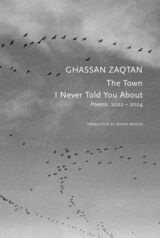 The Town I Never Told You About: Poems, 2022–2024
Ghassan Zaqtan
Seagull Books, 2026 A haunting, lyrical meditation on memory, loss, and homeland, with the poems threading together the personal and the collective in a Palestine shaped by conflict and beauty.
The Town I Never Told You About gathers poems written by celebrated Palestinian poet Ghassan Zaqtan between 2022 and 2024, at a time of intensifying conflict ravaging his homeland. Emerging from both memory and imagination, these poems trace the contours of hillscapes and villages, mapping a Palestine that is both historical and mythic, personal and collective. In Zaqtan’s hands, language threads its way through time—winding across landscapes marked by war, displacement, and enduring beauty. Each poem feels like part of a longer thread: a moment lifted from an ongoing inner epic, stitched into being with dreamlike clarity and haunting precision.
Long meditative pieces drift through shadow and sunlight, while other poems strike with the sharpness of remembered incident. This is poetry as pilgrimage—quiet, persistent, and full of echoes. A book that doesn’t so much end as continue resonating long after the last page is turned.
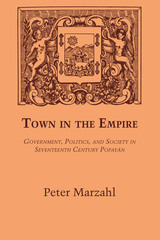 Town in the Empire: Government, Politics, and Society in Seventeenth Century Popayán
By Peter Marzahl
University of Texas Press, 1979 During the seventeenth century, many of the fundamental characteristics of Spanish America were established. Peter Marzahl adds significantly to our understanding of this period with this study of Popayán, a town in what was then part of New Granada and is now Colombia. New Granada was something of a backwater of the empire, but very likely Popayán was more typical of everyday colonial life than the major centers that have drawn most attention from historians. In the first part of his study, Marzahl describes both town and region, depicts economic activities (agriculture, gold mining, trade), and analyzes urban and rural society. Of particular interest is his discussion of the complex interaction among the different ethnic groups: Spaniards, Mestizos, Indians, and Blacks. In the longer second part he presents a detailed account of the makeup and operations of the town councils. His extensive research in primary sources makes possible a thorough examination of Popayán's administration and politics and their relationship to economic and social patterns. He also describes the councils' relations with the provincial governors, the viceregal authorities in Bogotá, and the Church. Because this study treats a neglected period and region and, in so doing, offers fresh materials and insights, it is an important contribution to our knowledge and comprehension of colonial Spanish America.
Town into City: Springfield, Massachusetts, and the Meaning of Community, 1840–1880
Michael H. Frisch
Harvard University Press, 1972 Through the history of one city Michael Frisch provides a persuasive and graceful account of the shifting context of urban experience. He traces the shift of people’s perception of community from an informal, direct sensation to a formal, perceived abstraction, thus relating the history of a place to the history of an idea.
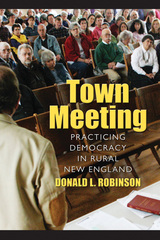 Town Meeting: Practicing Democracy in Rural New England
Donald L. Robinson
University of Massachusetts Press, 2011 At Gettysburg, Abraham Lincoln described government by the people as "the great task remaining before us." Many citizens of modern America, frustrated and disheartened, are tempted to despair of realizing that ideal. Yet, it is a project still alive in parts of New England.
This book traces the origins of town-meeting democracy in Ashfield, a community of just under 2,000 people in the foothills of the Berkshires in western Massachusetts. Donald Robinson begins by recounting several crises at the town's founding in the eighteenth century that helped to shape its character. He shows how the town has changed since then and examines how democratic self-government functions in the modern context.
The picture is not pretty. Self-government carries no guarantees, and Ashfield is no utopia. Human failings are abundantly on display. Leaders mislead. Citizens don't pay attention and they forget hard-earned lessons.
But in this candid account of the operation of democracy in one New England town, Robinson demonstrates that for better and for worse, Ashfield governs itself democratically. Citizens control the actions of their government. Not everyone participates, but all may, and everyone who lives in the town must accept and obey what town meeting decides.
The Town of N
Leonid Dobychin
Northwestern University Press, 1998 Leonid Dobychin's The Town of N, an unrecognized masterpiece of the Soviet 1930s, virtually vanished, together with its author, following its publication in 1935 and the subsequent vilification of Dobychin by Leningrad's cultural authorities. It portrays a fallen provincial world reminiscent of the town of N found in Gogol's Dead Souls, a place populated with characters who are petty, grasping, perfidious, and cruel, quite unlike the positive heroes of socialist realist novels.
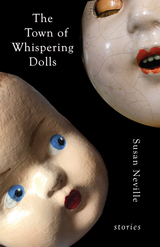 The Town of Whispering Dolls: Stories
Susan Neville, Foreword by Shelley Jackson
University of Alabama Press, 2020 WINNER OF FC2’S CATHERINE DOCTOROW INNOVATIVE FICTION PRIZE Stories haunted by the remains of the industrial Midwest, the opioid epidemic, and the technology of war Located somewhere in the rust belt in the early twenty-first century, residents of the town of Whispering Dolls dream of a fabled and illusory past, even as new technologies reshape their world into something different and deeply strange. Dolls walk down the streets, cradling their empty heads and letting the wind turn them into flutes. A politician heads to Washington, DC, and leaves a toxic underground plume in his wake. A woman eats car parts instead of confronting the children who have forgotten her. A young woman falls in love with the robot who took her job at the candy factory. In The Town of Whispering Dolls, it is usually the grandmothers and the children who grieve. Feeling invisible, in the story “Here,” a woman who has buried her children looks up at the sky where commercial and military jets fly overhead and tries to express her rage to the rich and powerful: “Keep flying above us in your planes. From one coast to the other, keep right on flying over us! We test your bombs and your beloved warriors. Here. Right here. Look down.”
The Town Officials of Colonial Boston, 1634-1775
Robert Francis Seybolt
Harvard University Press This volume represents an attempt to straighten out and correct the Reports of the Record Commissioners of the City of Boston and the manuscript records on which they are based. It contains all the town officials of colonial Boston, 1634-1775—all whose names have been preserved—with the exception of those appointed or chosen for temporary or emergency duties. The compilation is based on the manuscript minutes of the town and selectmen’s meetings, which have been collated with the published records and supplemented by material from newspapers, diaries, and various unpublished official memoranda. It brings together in convenient form contemporary records which are somewhat scattered.
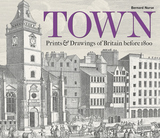 Town: Prints & Drawings of Britain before 1800
Bernard Nurse
Bodleian Library Publishing, 2020 Many provincial towns in Britain grew dramatically in size and importance in the eighteenth century. Ports such as Glasgow and Liverpool greatly expanded, while industrial centers such as Birmingham and Manchester flourished. Market towns outside London developed as commercial centers or as specialty destinations: visitors could find spa treatments in Bath, horse racing in Newmarket, and naval services in Portsmouth. Containing more than one hundred images of country towns in England, Wales, and Scotland, this book draws on the extensive Gough collection in the Bodleian Library. Contemporary prints and drawings provide a powerful visual record of the development of the town in this period, and finely drawn prospects and maps—made with greater accuracy than ever before—reveal their early development. This book also includes perceptive observations from the journals and letters of collector Richard Gough (1735–1809), who traveled throughout the country on the cusp of the industrial age.
 A Town Without Steel: Envisioning Homestead
Judith Modell
University of Pittsburgh Press, 1998
In 1986, with little warning, the USX Homestead Works closed. Thousands of workers who depended on steel to survive were left without work. A Town Without Steel looks at the people of Homestead as they reinvent their views of household and work and place in this world. The book details the modifications and revisions of domestic strategies in a public crisis. In some ways unique, and in some ways typical of American industrial towns, the plight of Homestead sheds light on social, cultural, and political developments of the late twentieth century.
In this anthropological and photographic account of a town facing the crisis of deindustrialization, A Town Without Steel focuses on families. Reminiscent of Margaret Byington and Lewis Hine’s approach in Homestead, Charlee Brodsky’s photographs document the visual dimension of change in Homestead. The mill that dominated the landscape transformed to a vast, empty lot; a crowded commercial street turns into a ghost town; and an abundance of well-kept homes become an abandoned street of houses for sale. The individual narratives and family snapshots, Modell’s interpretations, and Brodsky’s photographs all evoke the tragedy and the resilience of a town whose primary source of self-identification no longer exists.
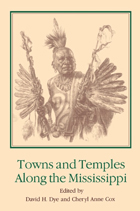 Towns and Temples Along the Mississippi
Edited by David H. Dye and Cheryl Anne Cox
University of Alabama Press, 1990 A Dan Josselyn Memorial Publication
Specialists from archaeology, ethnohistory, physical anthropology, and cultural anthropology bring their varied points of view to this subject in an attempt to answer basic questions about the nature and extent of social change within the time period. The scholars' overriding concerns include presentation of a scientifically accurate depiction of the native cultures in the Central Mississippi Valley prior and immediately subsequent to European contact and the need to document the ensuing social and biological changes that eventually led to the widespread depopulation and cultural reorientation. Their findings lead to three basic hypotheses that will focus the scholarly research for decades to come. Contributors include:
George J. Armelagos, Ian W. Brown, Chester B. DePratter, George F. Fielder, Jr., James B. Griffin, M. Cassandra Hill, Michael P. Hoffman, Charles Hudson, R. Barry Lewis, Dan F. Morse, Phyllis A. Morse, Mary Lucas Powell, Cynthia R. Price, James F. Price, Gerald P. Smith, Marvin T. Smith, and Stephen Williams
 Towns between Empires: Good Governance and “Police” in Case Studies from Transylvania, Wallachia, and Moldavia, 1500s–1800s
Mária Pakucs
Central European University Press, 2025 Towns between Empires contains contributions regarding urban administration and governance in the historical regions that are now in Romania, and that fall under the early modern concept of good governance. Chapters give insight into the concepts and solutions applied by urban governments to political, social and economic issues that were under their care and control. The authors approach various aspects of this topic: town councils as political and economic elites of early modern towns, urban political systems as models of early modern ideas of administration, relations between towns and central authorities (the Prince), healthcare as good governance.
The chapters in the volume capture the widest possible variety of political and administrative systems in the region. Transylvanian towns were structured and governed similarly to other small Central European urban centers, however significant diversity can be discerned following the Reformation. Moldavian and Wallachian towns in the 18th and 19th century are little known to international scholarship, and the chapters in this volume will fill this gap.
Towns Facing Railroads: Poems
Jo McDougall
University of Arkansas Press, 1991 In her second book of poetry, Jo McDougall takes her readers to the dusty prairie towns of the central states, places where the flat terrain belies a complex human landscape. In short, dceptively simple lines, McDougall can so keenly trace the lineaments of place and era that her subject stands before us, its essence displayed and made timeless. Quietly, with an almost aphoristic bit, McDougall writes about ordinary lives and small towns in a way that her readers may never forget.
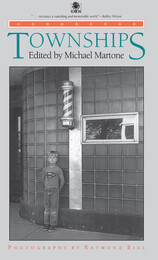 Townships
Michael Martone
University of Iowa Press, 1992 Anyone who has ever flown over the Midwest knows those patterns of township and field, perfect little blocks that define the region from the air. It is precisely this vision of the Midwest, this vague perception as repeating squares of leftover and flyover, that Michael Martone addresses in this remarkable collection. Twenty-five of the Midwest's best poets, fiction writers, and essayists combine their talents in a quilt of original essays that begin to piece together this vast region, square by square.
Townships establishes the Midwest as an important center of creativity, a region to be noted for more than corn and prairie and neat, square patches of land. The reverberations in sensibility that make their way through these essays speak to all midwesterners and to all those for whom a sense of place is a source of inspiration.
Contributors Carol Bly, Marianne Boruch, Anthony Bukoski, Amy Clampitt, Susan Dodd, Stuart Dybek, Paul Gruchow, Philip Levine, Mary Swander, David Foster Wallace, and Ray A. Young Bear, among others, have written about a specific township of childhood or a bordered region that defined a first notion of place in the world. Raymond Bial's striking and evocative photographs are a perfect complement to this diversity in writer and subject.
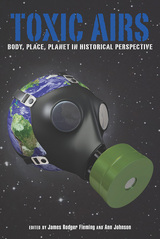 Toxic Airs: Body, Place, Planet in Historical Perspective
James Rodger Fleming
University of Pittsburgh Press, 2014 Toxic Airs brings together historians of medicine, environmental historians, historians of science and technology, and interdisciplinary scholars to address atmospheric issues on a spectrum of scales from body to place to planet. The chapters analyze airborne and atmospheric threats posed to humans, and contributors demonstrate how conceptions of toxicity have evolved and how humans have both created and mitigated toxins in the air.
Specific topics discussed include medieval beliefs in the pestilent breath of witches, malarial theory in India, domestic and military use of tear gas, Gulf War Syndrome, Los Angeles smog, automotive emissions control, the epidemiological effects of air pollution, transboundary air pollution, ozone depletion, the contributions of contemporary artists to climate awareness, and the toxic history of carbon “die”-oxide. Overall, the essays provide a wide-ranging historical study of interest to students and scholars of many disciplines.
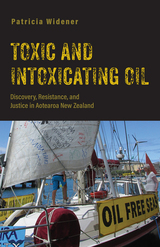 Toxic and Intoxicating Oil: Discovery, Resistance, and Justice in Aotearoa New Zealand
Patricia Widener
Rutgers University Press, 2021 When oil and gas exploration was expanding across Aotearoa New Zealand, Patricia Widener was there interviewing affected residents and environmental and climate activists, and attending community meetings and anti-drilling rallies. Exploration was occurring on an unprecedented scale when oil disasters dwelled in recent memory, socioecological worries were high, campaigns for climate action were becoming global, and transitioning toward a low carbon society seemed possible. Yet unlike other communities who have experienced either an oil spill, or hydraulic fracturing, or offshore exploration, or climate fears, or disputes over unresolved Indigenous claims, New Zealanders were facing each one almost simultaneously. Collectively, these grievances created the foundation for an organized civil society to construct and then magnify a comprehensive critical oil narrative--in dialogue, practice, and aspiration. Community advocates and socioecological activists mobilized for their health and well-being, for their neighborhoods and beaches, for Planet Earth and Planet Ocean, and for terrestrial and aquatic species and ecosystems. They rallied against toxic, climate-altering pollution; the extraction of fossil fuels; a myriad of historic and contemporary inequities; and for local, just, and sustainable communities, ecologies, economies, and/or energy sources. In this allied ethnography, quotes are used extensively to convey the tenor of some of the country’s most passionate and committed people. By analyzing the intersections of a social movement and the political economy of oil, Widener reveals a nuanced story of oil resistance and promotion at a time when many anti-drilling activists believed themselves to be on the front lines of the industry’s inevitable decline.
 Toxic Dynamics: Disrupting, Dismantling, and Transforming Academic Library Culture
Russell Michalak
Association of College & Research Libraries, 2024 Academic libraries are full of inspiring collections, resources, and services, but libraries are special because of the people who run them. And what people believe about and face in their culture impacts ideas, plans, and outcomes. Academic library workers face many contemporary challenges that contribute to toxic work cultures—the rapid change of higher education, diminishing resources, lack of diversity, power hierarchies—and addressing these problems requires innovative solutions, ongoing professional development, and effective leadership.
Toxic Dynamics: Disrupting, Dismantling, and Transforming Academic Library Culture provides practical solutions for confronting these complex issues and innovative ways to promote a healthy and sustainable work culture. It addresses critical and timely challenges such as faculty versus staff or us versus them mentality, unionization, gendered labor, organizational change, self-care, tenure, and promotion. Authors from all sizes and types of academic libraries provide evidence-based solutions to mitigate the negative effects of toxicity, change management strategies, and ways to confront and challenge values that harm library workers and their well-being.
By understanding the root causes of toxic cultures, recognizing their impact, and implementing solutions, leaders can create a more supportive and positive work environment and improve morale, retention, and productivity. Toxic Dynamics is an important resource for anyone interested in improving workplace culture and addressing issues related to toxicity and inequity, and for library leaders at all levels.
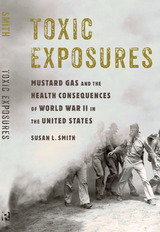 Toxic Exposures: Mustard Gas and the Health Consequences of World War II in the United States
Smith, Susan L.
Rutgers University Press, 2019 Mustard gas is typically associated with the horrors of World War I battlefields and trenches, where chemical weapons were responsible for tens of thousands of deaths. Few realize, however, that mustard gas had a resurgence during the Second World War, when its uses and effects were widespread and insidious. Toxic Exposures tells the shocking story of how the United States and its allies intentionally subjected thousands of their own servicemen to poison gas as part of their preparation for chemical warfare. In addition, it reveals the racialized dimension of these mustard gas experiments, as scientists tested whether the effects of toxic exposure might vary between Asian, Hispanic, black, and white Americans. Drawing from once-classified American and Canadian government records, military reports, scientists’ papers, and veterans’ testimony, historian Susan L. Smith explores not only the human cost of this research, but also the environmental degradation caused by ocean dumping of unwanted mustard gas. As she assesses the poisonous legacy of these chemical warfare experiments, Smith also considers their surprising impact on the origins of chemotherapy as cancer treatment and the development of veterans’ rights movements. Toxic Exposures thus traces the scars left when the interests of national security and scientific curiosity battled with medical ethics and human rights.
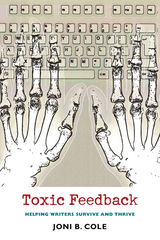 Toxic Feedback: Helping Writers Survive and Thrive
Joni Cole
University Press of New England, 2006 All writers have stories of how some teacher, workshop participant, friend, or spouse gave them commentary that undermined their confidence and their writing. This “toxic feedback” has tainted feedback's reputation as a whole, causing too many writers to avoid or mismanage this valuable resource. In the first book to focus on this vital but delicate dynamic, Joni B. Cole applies first-person experience, real-life teaching examples, and her own unique ability to entertain while reaffirming the many merits of feedback. Cole shows writers how to use feedback to energize and inform their writing at every stage of the process. For feedback providers, she delivers insights into constructive criticism and the difference between being heard and being obnoxious. Finally, she offers advice to workshops and critique groups on how to thrive in this collective experience. In addition, established writers ranging from Julia Alvarez and Khaled Hosseini to Gregory Maguire and Jodi Picoult share their own feedback stories -- from useful to inspiring to deranged -- underscoring Cole's message that feedback plays a critical role in every writer's success. Through a mixture of instruction, anecdotes, and moral support, Cole manages to detoxify the feedback process with humor and without laying blame, inspiring both sides of the interaction to make the most of this powerful resource.
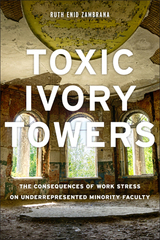 Toxic Ivory Towers: The Consequences of Work Stress on Underrepresented Minority Faculty
Ruth Enid Zambrana
Rutgers University Press, 2018 Toxic Ivory Towers seeks to document the professional work experiences of underrepresented minority (URM) faculty in U.S. higher education, and simultaneously address the social and economic inequalities in their life course trajectory. Ruth Enid Zambrana finds that despite the changing demographics of the nation, the percentages of Black and Hispanic faculty have increased only slightly, while the percentages obtaining tenure and earning promotion to full professor have remained relatively stagnant. Toxic Ivory Towers is the first book to take a look at the institutional factors impacting the ability of URM faculty to be successful at their jobs, and to flourish in academia. The book captures not only how various dimensions of identity inequality are expressed in the academy and how these social statuses influence the health and well-being of URM faculty, but also how institutional policies and practices can be used to transform the culture of an institution to increase rates of retention and promotion so URM faculty can thrive.
 Toxic Loves, Impossible Futures: Feminist Living as Resistance
Irmgard Emmelhainz
Vanderbilt University Press, 2021 Toxic Loves, Impossible Futures is an homage to a constellation of women writers, feminists, and creators whose voices draw a map of our current global political-environmental crisis and the interlinked massive violence, enabled by the denigration of life and human relationships. In a world in which "a woman's voice" exists in bodies called on to occupy important positions in corporations, government, and cultural and academic institutions, to work in factories, and to join the army—but whose bodies are systematically rendered vulnerable by gender violence and by the double burden imposed on them to perform both productive and reproductive labor—Emmelhainz asks: What is the task of thought and form in contemporary feminist-situated knowledge? Toxic Loves, Impossible Futures is a collection of essays rethinking feminist issues in the current context of the production of redundant populations, the omnipresence of the technosphere and environmental devastation, toxic relationships, toxic nationalisms, and more.
These reflections and dialogues are an urgent attempt to resist the present in the company of the voices of women like bell hooks, Sara Ahmed, Leslie Jamison, Lina Meruane, Leanne Betasamosake Simpson, Chris Kraus, Alaíde Foppa, Lorena Wolffer, Sayak Valencia, Pip Day, Veronica Gonzalez Peña, Eimear McBride, Simone de Beauvoir, Elena Poniatowska, Susan Sontag, Margaret Randall, Simone Weil, Arundhati Roy, Marta Lamas, Paul B. Preciado, Dawn Marie Paley, Raquel Gutiérrez, Sara Eliassen, and Silvia Gruner. Toxic Loves, Impossible Futures continues the discussion on how to undo misogyny and dismantle heteropatriarchy's sublimating and denigrating tricks against women, which are intrinsically linked to colonialism and violence against the Earth.
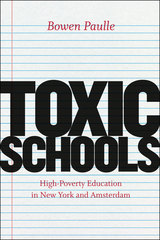 Toxic Schools: High-Poverty Education in New York and Amsterdam
Bowen Paulle
University of Chicago Press, 2013 Violent urban schools loom large in our culture: for decades they have served as the centerpieces of political campaigns and as window dressing for brutal television shows and movies. Yet unequal access to quality schools remains the single greatest failing of our society—and one of the most hotly debated issues of our time. Of all the usual words used to describe non-selective city schools—segregated, unequal, violent—none comes close to characterizing their systemic dysfunction in high-poverty neighborhoods. The most accurate word is toxic.
When Bowen Paulle speaks of toxicity, he speaks of educational worlds dominated by intimidation and anxiety, by ambivalence, degradation, and shame. Based on six years of teaching and research in the South Bronx and in Southeast Amsterdam, Toxic Schools is the first fully participatory ethnographic study of its kind and a searing examination of daily life in two radically different settings. What these schools have in common, however, are not the predictable ideas about race and educational achievement but the tragically similar habituated stress responses of students forced to endure the experience of constant vulnerability. From both sides of the Atlantic Ocean, Paulle paints an intimate portrait of how students and teachers actually cope, in real time, with the chronic stress, peer group dynamics, and subtle power politics of urban educational spaces in the perpetual shadow of aggression.
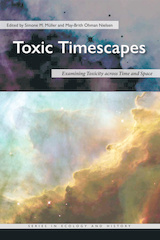 Toxic Timescapes: Examining Toxicity across Time and Space
Simone M. Müller
Ohio University Press, 2022 An interdisciplinary environmental humanities volume that explores human-environment relationships on our permanently polluted planet. While toxicity and pollution are ever present in modern daily life, politicians, juridical systems, media outlets, scholars, and the public alike show great difficulty in detecting, defining, monitoring, or generally coming to terms with them. This volume’s contributors argue that the source of this difficulty lies in the struggle to make sense of the intersecting temporal and spatial scales working on the human and more-than-human body, while continuing to acknowledge race, class, and gender in terms of global environmental justice and social inequality. The term toxic timescapes refers to this intricate intersectionality of time, space, and bodies in relation to toxic exposure. As a tool of analysis, it unpacks linear understandings of time and explores how harmful substances permeate temporal and physical space as both event and process. It equips scholars with new ways of creating data and conceptualizing the past, present, and future presence and possible effects of harmful substances and provides a theoretical framework for new environmental narratives. To think in terms of toxic timescapes is to radically shift our understanding of toxicants in the complex web of life. Toxicity, pollution, and modes of exposure are never static; therefore, dose, timing, velocity, mixture, frequency, and chronology matter as much as the geographic location and societal position of those exposed. Together, these factors create a specific toxic timescape that lies at the heart of each contributor’s narrative. Contributors from the disciplines of history, human geography, science and technology studies, philosophy, and political ecology come together to demonstrate the complex reality of a toxic existence. Their case studies span the globe as they observe the intersection of multiple times and spaces at such diverse locations as former battlefields in Vietnam, aging nuclear-weapon storage facilities in Greenland, waste deposits in southern Italy, chemical facilities along the Gulf of Mexico, and coral-breeding laboratories across the world.
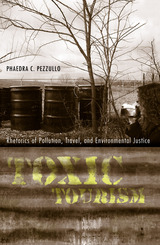 Toxic Tourism: Rhetorics of Pollution, Travel, and Environmental Justice
Phaedra C. Pezzullo
University of Alabama Press, 2009 Winner of the: 2010 Jane Jacobs Urban Communication Book Award, sponsored by National Communication Association 2007 James A. Winans-Herbert A. Wichelns Memorial Award for Distinguished Scholarship in Rhetoric and Public Address, sponsored by National Communication Association 2007 Best Book of the Year for Critical and Cultural Studies, sponsored by National Communication Association 2007 Christine L. Oravec Research Award, sponsored by Environmental Communications Division of the National Communication Association
The first book length study of the environmental justice movement, tourism, and the links between race, class, and waste Tourism is at once both a beloved pastime and a denigrated form of popular culture. Romanticized for its promise of pleasure, tourism is also potentially toxic, enabling the deadly exploitation of the cultures and environments visited. For many decades, the environmental justice movement has offered “toxic tours,” non-commercial trips intended to highlight people and locales polluted by poisonous chemicals. Out of these efforts and their popular reception, a new understanding of democratic participation in environmental decision-making has begun to arise. Phaedra C. Pezzullo examines these tours as a tactic of resistance and for their potential in reducing the cultural and physical distance between hosts and visitors. Pezzullo begins by establishing the ambiguous roles tourism and the toxic have played in the U.S. cultural imagination since the mid-20th century in a range of spheres, including Hollywood films, women’s magazines, comic books, and scholarly writings. Next, drawing on participant observation, interviews, documentaries, and secondary accounts in popular media, she identifies and examines a range of tourist performances enabled by toxic tours. Extended illustrations of the racial, class, and gender politics involved include Louisiana’s “Cancer Alley,” California’s San Francisco Bay Area, and the Mexican border town of Matamoros. Weaving together social critiques of tourism and community responses to toxic chemicals, this critical, rhetorical, and cultural analysis brings into focus the tragedy of ongoing patterns of toxification and our assumptions about travel, democracy, and pollution.
Toxic Voices: The Villain from Early Soviet Literature to Socialist Realism
Eric Laursen
Northwestern University Press, 2013 Satire and the fantastic, vital literary genres in the 1920s, are often thought to have fallen victim to the official adoption of socialist realism. Eric Laursen contends that these subversive genres did not just vanish or move underground. Instead, key strategies of each survive to sustain the villain of socialist realism. Laursen argues that the judgment of satire and the hesitation associated with the fantastic produce a narrative obsession with controlling the villain’s influence. In identifying a crucial connection between the questioning, subversive literature of the 1920s and the socialist realists, Laursen produces an insightful revision of Soviet literary history.
 Toxic War: The Story of Agent Orange
Peter Sills
Vanderbilt University Press, 2014 The war in Vietnam, spanning more than twenty years, was one of the most divisive conflicts ever to envelop the United States, and its complexity and consequences did not end with the fall of Saigon in 1975. As Peter Sills demonstrates in Toxic War, veterans faced a new enemy beyond post-traumatic stress disorder or debilitating battle injuries. Many of them faced a new, more pernicious, slow-killing enemy: the cancerous effects of Agent Orange.
Originally introduced by Dow and other chemical companies as a herbicide in the United States and adopted by the military as a method of deforesting the war zone of Vietnam, in order to deny the enemy cover, Agent Orange also found its way into the systems of numerous active-duty soldiers. Sills argues that manufacturers understood the dangers of this compound and did nothing to protect American soldiers.
Toxic War takes the reader behind the scenes into the halls of political power and industry, where the debates about the use of Agent Orange and its potential side effects raged. In the end, the only way these veterans could seek justice was in the court of law and public opinion. Unprecedented in its access to legal, medical, and government documentation, as well as to the personal testimonies of veterans, Toxic War endeavors to explore all sides of this epic battle.
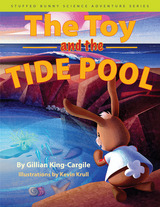 The Toy and the Tide Pool
Gillian King-Cargile
Northern Illinois University Press, 2016 In the second book in the Stuffed Bunny Science Adventure Series, a fluff-brained bunny named Bear gets lost at the beach. He befriends Princess Shelleena, a mermaid doll, who helps him learn about tides and the fascinating creatures who call tide pools their home. But can Bear’s new friend help him find a way to signal for help before the high tide sweeps him out to sea? This silly, salty adventure introduces young readers to interesting ocean animals and helps them understand concepts of biodiversity and earth system science. It concludes with an interview with a marine biologist from Chicago’s world-renowned Shedd Aquarium.
About the Stuffed Bunny Science Adventure Series
NIU Press is pleased to work with the P-20 Center at Northern Illinois University to publish a series of STEM-based storybooks for young readers.
The P-20 Center collaborates with university and community partners to promote innovation in teaching and learning, and foster educational success for all ages.
The Stuffed Bunny Science Adventure Series for young readers is an extension of STEM Read, a P-20 program that helps readers explore the science, technology, engineering, and math concepts behind popular fiction.
This series shares the adventures of a fluff-brained bunny named Bear and his favorite boy, Jack. In each story, Bear meets other toys who teach him about the world around him. The books explore the importance of working together and making friends. They also incorporate STEM concepts aligned with the Next Generation Science Standards. Learn more about the Stuffed Bunny Science Adventure Series and find resources, videos, and games at stemread.com.
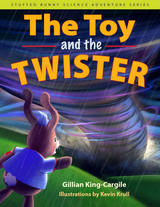 The Toy and the Twister
Gillian King-Cargile
Northern Illinois University Press, 2015 In Book One of the Stuffed Bunny Science Adventure Series, a fluff-brained bunny named Bear gets left outside during a storm. The only thing that can save him is science . . . and a sassy doll named Sadie Scientist. Together, the toys get sucked into a tornado. Sadie helps Bear understand extreme weather and storm safety, but when they begin to fall, Bear has to think quickly to save his new friend. This fun, fast-paced adventure will entertain young readers while introducing them to weather and climate concepts aligned with the Next Generation Science Standards. After the adventure, read an interview with a real-life meteorologist!
Guided Reading Level: L
About the Stuffed Bunny Science Adventure Series
NIU Press is pleased to work with the P-20 Center at Northern Illinois University to publish a series of STEM-based storybooks for young readers.
The P-20 Center collaborates with university and community partners to promote innovation in teaching and learning, and foster educational success for all ages.
The Stuffed Bunny Science Adventure Series for young readers is an extension of STEM Read, a P-20 program that helps readers explore the science, technology, engineering, and math concepts behind popular fiction.
This series shares the adventures of a fluff-brained bunny named Bear and his favorite boy, Jack. In each story, Bear meets other toys who teach him about the world around him. The books explore the importance of working together and making friends. They also incorporate STEM concepts aligned with the Next Generation Science Standards. Learn more about the Stuffed Bunny Science Adventure Series and find resources, videos, and games at stemread.com.
|
|

